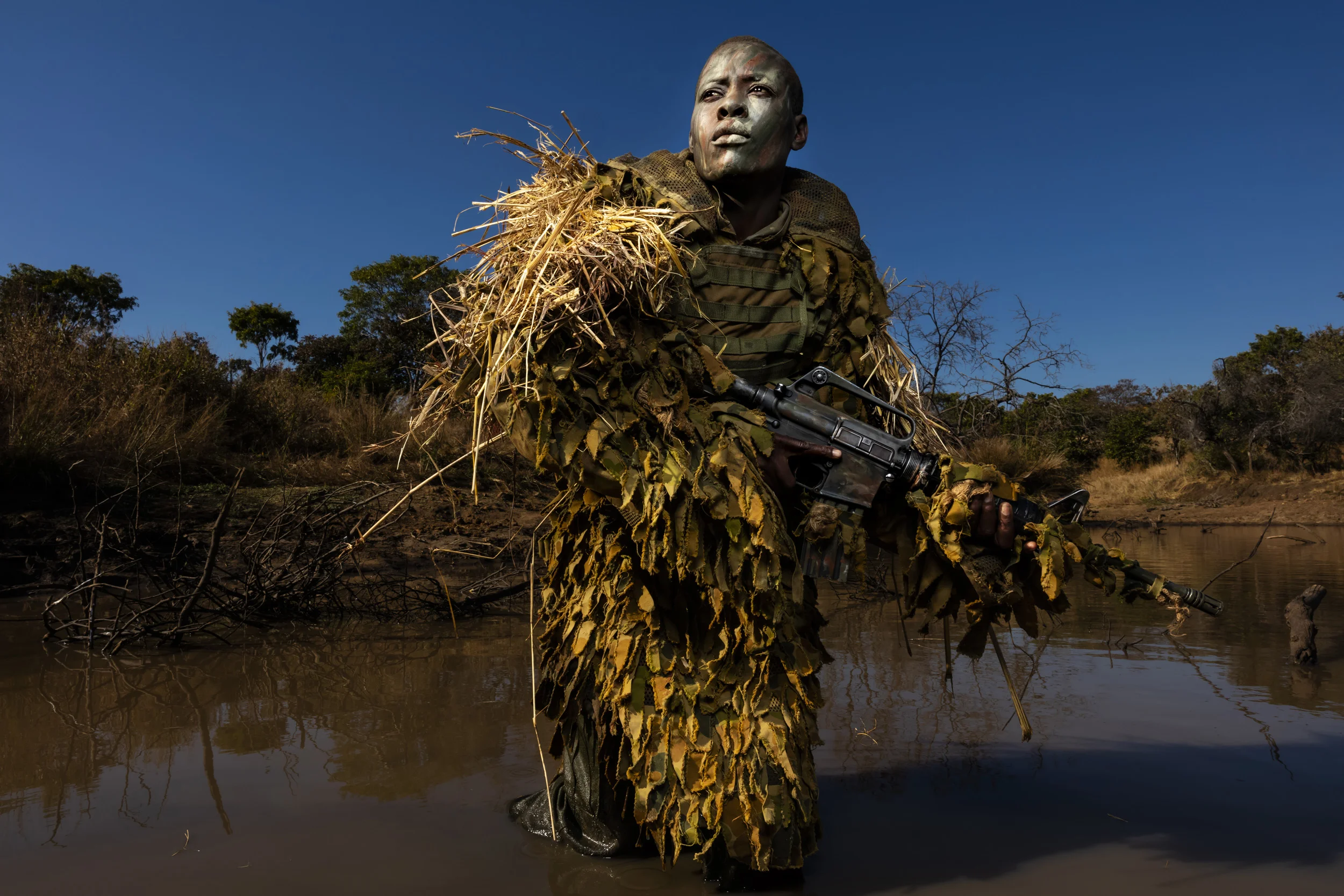
PHUNDUNDU WILDLIFE AREA, ZIMBABWE, JUNE 2018: Specially selected women from an all female. conservation ranger force undergo concealment and fire and movement training in the bush to curb poaching. Akashinga (meaning the ‘Brave Ones’ in local dialect) is a community-driven conservation model, empowering disadvantaged women to restore and manage a network of wilderness areas as an alternative to trophy hunting. Many current western-conceived solutions to conserve wilderness areas struggle to gain traction across the African continent. Predominately male forces are hampered by ongoing corruption, nepotism, drunkenness, aggressiveness towards local communities and a sense of entitlement. The I.A.P.F, the International Anti-Poaching Foundation led by former Australian Special Forces soldier Damien Mander, was created as a direct action conservation organisation to be used as a surgical instrument in targeting wildlife crime. In 2017 they decided to innovate, using an all- female team to manage an entire nature reserve in Zimbabwe. The program builds an alternative approach to the militarized paradigm of ‘fortress conservation’ which defends colonial boundaries between nature and humans. While still trained to deal with any situation they may face, the team has a community-driven interpersonal focus, working with rather than against the local population for the long-term benefits of their own communities and nature. Cut off from places of worship and burial, grazing areas, access to water, food, traditional medicine and given limited opportunity for employment or tourism benefits, it’s little wonder many of these communities struggle to see any value in conservation efforts. Women have traditionally played major roles in battle and are now re-emerging as key solutions in law enforcement and conflict resolution. In the Middle-East, counterinsurgency operations that involve penetrating and working with the local population to try and win the hearts and minds ha
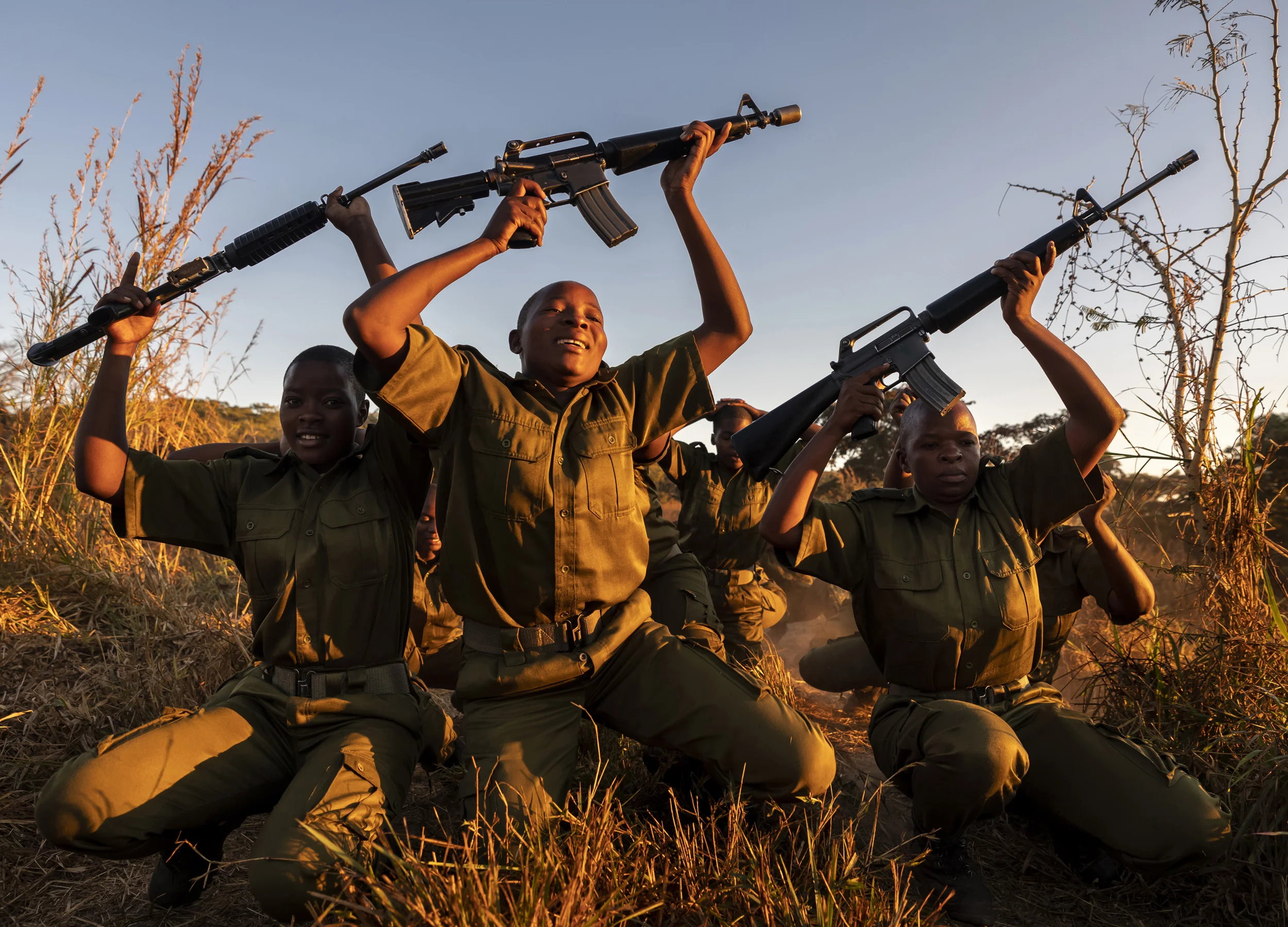
PHUNDUNDU WILDLIFE AREA, ZIMBABWE, JUNE 2018: Members of the all female conservation ranger force known as Akashinga undergo tough training in the bush near their base. Akashinga (meaning the ‘Brave Ones’ in local dialect) is a community-driven conservation model, empowering disadvantaged women to restore and manage a network of wilderness areas as an alternative to trophy hunting. Many current western-conceived solutions to conserve wilderness areas struggle to gain traction across the African continent. Predominately male forces are hampered by ongoing corruption, nepotism, drunkenness, aggressiveness towards local communities and a sense of entitlement. The I.A.P.F, the International Anti-Poaching Foundation led by former Australian Special Forces soldier Damien Mander, was created as a direct action conservation organisation to be used as a surgical instrument in targeting wildlife crime. In 2017 they decided to innovate, using an all- female team to manage an entire nature reserve in Zimbabwe. The program builds an alternative approach to the militarized paradigm of ‘fortress conservation’ which defends colonial boundaries between nature and humans. While still trained to deal with any situation they may face, the team has a community-driven interpersonal focus, working with rather than against the local population for the long-term benefits of their own communities and nature. Cut off from places of worship and burial, grazing areas, access to water, food, traditional medicine and given limited opportunity for employment or tourism benefits, it’s little wonder many of these communities struggle to see any value in conservation efforts. Women have traditionally played major roles in battle and are now re-emerging as key solutions in law enforcement and conflict resolution. In the Middle-East, counterinsurgency operations that involve penetrating and working with the local population to try and win the hearts and minds have become fundamentally relian
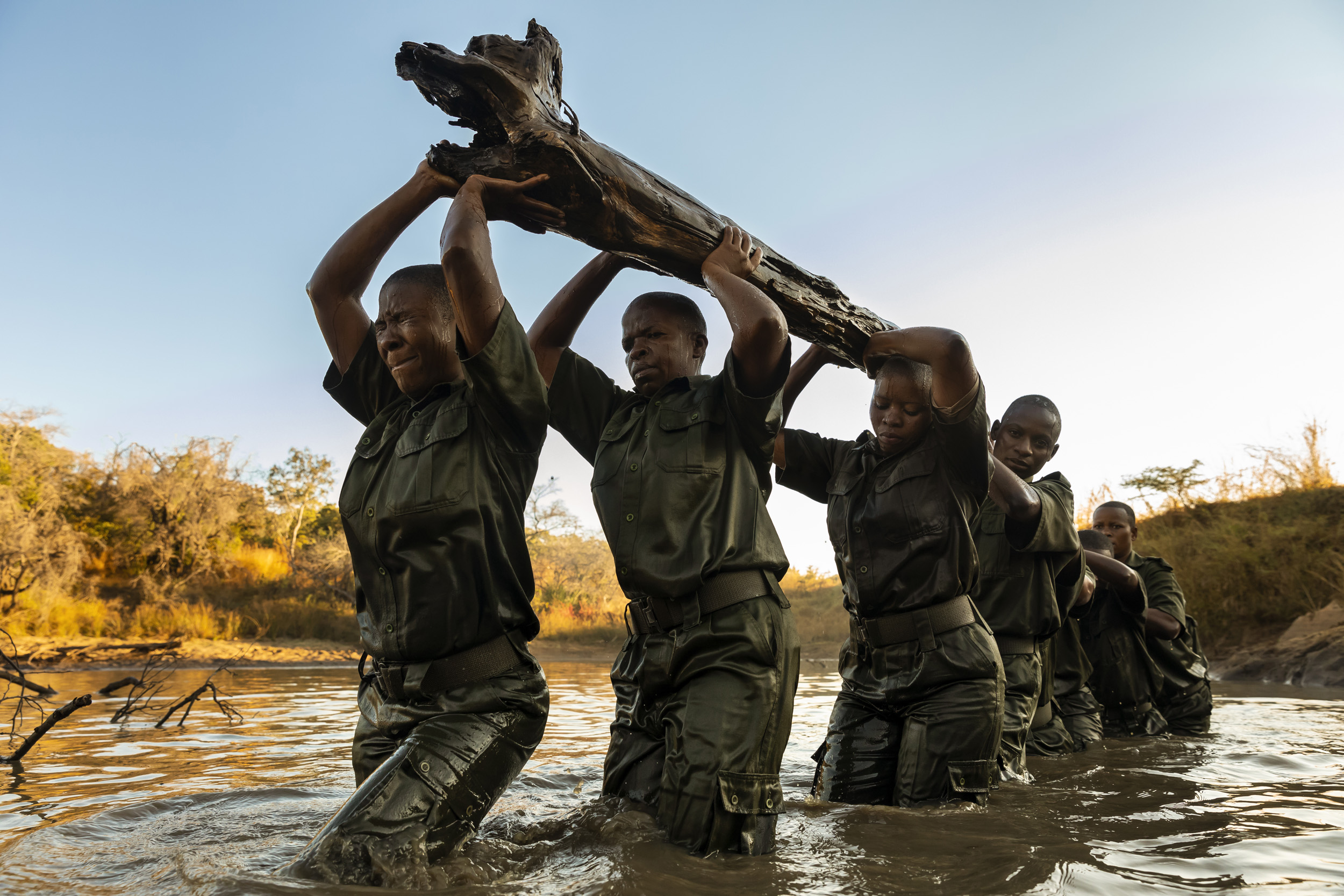
PHUNDUNDU WILDLIFE AREA, ZIMBABWE, JUNE 2018: Members of the all female conservation ranger force known as Akashinga undergo tough training in the bush near their base. Akashinga (meaning the ‘Brave Ones’ in local dialect) is a community-driven conservation model, empowering disadvantaged women to restore and manage a network of wilderness areas as an alternative to trophy hunting. Many current western-conceived solutions to conserve wilderness areas struggle to gain traction across the African continent. Predominately male forces are hampered by ongoing corruption, nepotism, drunkenness, aggressiveness towards local communities and a sense of entitlement. The I.A.P.F, the International Anti-Poaching Foundation led by former Australian Special Forces soldier Damien Mander, was created as a direct action conservation organisation to be used as a surgical instrument in targeting wildlife crime. In 2017 they decided to innovate, using an all- female team to manage an entire nature reserve in Zimbabwe. The program builds an alternative approach to the militarized paradigm of ‘fortress conservation’ which defends colonial boundaries between nature and humans. While still trained to deal with any situation they may face, the team has a community-driven interpersonal focus, working with rather than against the local population for the long-term benefits of their own communities and nature. Cut off from places of worship and burial, grazing areas, access to water, food, traditional medicine and given limited opportunity for employment or tourism benefits, it’s little wonder many of these communities struggle to see any value in conservation efforts. Women have traditionally played major roles in battle and are now re-emerging as key solutions in law enforcement and conflict resolution. In the Middle-East, counterinsurgency operations that involve penetrating and working with the local population to try and win the hearts and minds have become fundamentally relian

PHUNDUNDU WILDLIFE AREA, ZIMBABWE, JUNE 2018: Members of the all female conservation ranger force known as Akashinga undergo tough training in the bush near their base. Akashinga (meaning the ‘Brave Ones’ in local dialect) is a community-driven conservation model, empowering disadvantaged women to restore and manage a network of wilderness areas as an alternative to trophy hunting. Many current western-conceived solutions to conserve wilderness areas struggle to gain traction across the African continent. Predominately male forces are hampered by ongoing corruption, nepotism, drunkenness, aggressiveness towards local communities and a sense of entitlement. The I.A.P.F, the International Anti-Poaching Foundation led by former Australian Special Forces soldier Damien Mander, was created as a direct action conservation organisation to be used as a surgical instrument in targeting wildlife crime. In 2017 they decided to innovate, using an all- female team to manage an entire nature reserve in Zimbabwe. The program builds an alternative approach to the militarized paradigm of ‘fortress conservation’ which defends colonial boundaries between nature and humans. While still trained to deal with any situation they may face, the team has a community-driven interpersonal focus, working with rather than against the local population for the long-term benefits of their own communities and nature. Cut off from places of worship and burial, grazing areas, access to water, food, traditional medicine and given limited opportunity for employment or tourism benefits, it’s little wonder many of these communities struggle to see any value in conservation efforts. Women have traditionally played major roles in battle and are now re-emerging as key solutions in law enforcement and conflict resolution. In the Middle-East, counterinsurgency operations that involve penetrating and working with the local population to try and win the hearts and minds have become fundamentally relian

PHUNDUNDU WILDLIFE AREA, ZIMBABWE, JUNE 2018: Members of the all female conservation ranger force known as Akashinga undergo tough training in the bush near their base. Akashinga (meaning the ‘Brave Ones’ in local dialect) is a community-driven conservation model, empowering disadvantaged women to restore and manage a network of wilderness areas as an alternative to trophy hunting. Many current western-conceived solutions to conserve wilderness areas struggle to gain traction across the African continent. Predominately male forces are hampered by ongoing corruption, nepotism, drunkenness, aggressiveness towards local communities and a sense of entitlement. The I.A.P.F, the International Anti-Poaching Foundation led by former Australian Special Forces soldier Damien Mander, was created as a direct action conservation organisation to be used as a surgical instrument in targeting wildlife crime. In 2017 they decided to innovate, using an all- female team to manage an entire nature reserve in Zimbabwe. The program builds an alternative approach to the militarized paradigm of ‘fortress conservation’ which defends colonial boundaries between nature and humans. While still trained to deal with any situation they may face, the team has a community-driven interpersonal focus, working with rather than against the local population for the long-term benefits of their own communities and nature. Cut off from places of worship and burial, grazing areas, access to water, food, traditional medicine and given limited opportunity for employment or tourism benefits, it’s little wonder many of these communities struggle to see any value in conservation efforts. Women have traditionally played major roles in battle and are now re-emerging as key solutions in law enforcement and conflict resolution. In the Middle-East, counterinsurgency operations that involve penetrating and working with the local population to try and win the hearts and minds have become fundamentally relian

PHUNDUNDU WILDLIFE AREA, ZIMBABWE, JUNE 2018: Members of the all female conservation ranger force known as Akashinga undergo tough training in the bush near their base. Akashinga (meaning the ‘Brave Ones’ in local dialect) is a community-driven conservation model, empowering disadvantaged women to restore and manage a network of wilderness areas as an alternative to trophy hunting. Many current western-conceived solutions to conserve wilderness areas struggle to gain traction across the African continent. Predominately male forces are hampered by ongoing corruption, nepotism, drunkenness, aggressiveness towards local communities and a sense of entitlement. The I.A.P.F, the International Anti-Poaching Foundation led by former Australian Special Forces soldier Damien Mander, was created as a direct action conservation organisation to be used as a surgical instrument in targeting wildlife crime. In 2017 they decided to innovate, using an all- female team to manage an entire nature reserve in Zimbabwe. The program builds an alternative approach to the militarized paradigm of ‘fortress conservation’ which defends colonial boundaries between nature and humans. While still trained to deal with any situation they may face, the team has a community-driven interpersonal focus, working with rather than against the local population for the long-term benefits of their own communities and nature. Cut off from places of worship and burial, grazing areas, access to water, food, traditional medicine and given limited opportunity for employment or tourism benefits, it’s little wonder many of these communities struggle to see any value in conservation efforts. Women have traditionally played major roles in battle and are now re-emerging as key solutions in law enforcement and conflict resolution. In the Middle-East, counterinsurgency operations that involve penetrating and working with the local population to try and win the hearts and minds have become fundamentally relian

PHUNDUNDU WILDLIFE AREA, ZIMBABWE, JUNE 2018: Members of the all female conservation ranger force known as Akashinga undergo tough training in the bush near their base. Akashinga (meaning the ‘Brave Ones’ in local dialect) is a community-driven conservation model, empowering disadvantaged women to restore and manage a network of wilderness areas as an alternative to trophy hunting. Many current western-conceived solutions to conserve wilderness areas struggle to gain traction across the African continent. Predominately male forces are hampered by ongoing corruption, nepotism, drunkenness, aggressiveness towards local communities and a sense of entitlement. The I.A.P.F, the International Anti-Poaching Foundation led by former Australian Special Forces soldier Damien Mander, was created as a direct action conservation organisation to be used as a surgical instrument in targeting wildlife crime. In 2017 they decided to innovate, using an all- female team to manage an entire nature reserve in Zimbabwe. The program builds an alternative approach to the militarized paradigm of ‘fortress conservation’ which defends colonial boundaries between nature and humans. While still trained to deal with any situation they may face, the team has a community-driven interpersonal focus, working with rather than against the local population for the long-term benefits of their own communities and nature. Cut off from places of worship and burial, grazing areas, access to water, food, traditional medicine and given limited opportunity for employment or tourism benefits, it’s little wonder many of these communities struggle to see any value in conservation efforts. Women have traditionally played major roles in battle and are now re-emerging as key solutions in law enforcement and conflict resolution. In the Middle-East, counterinsurgency operations that involve penetrating and working with the local population to try and win the hearts and minds have become fundamentally relian

PHUNDUNDU WILDLIFE AREA, ZIMBABWE, JUNE 2018: Members of the all female conservation ranger force known as Akashinga undergo tough training in the bush near their base. Akashinga (meaning the ‘Brave Ones’ in local dialect) is a community-driven conservation model, empowering disadvantaged women to restore and manage a network of wilderness areas as an alternative to trophy hunting. Many current western-conceived solutions to conserve wilderness areas struggle to gain traction across the African continent. Predominately male forces are hampered by ongoing corruption, nepotism, drunkenness, aggressiveness towards local communities and a sense of entitlement. The I.A.P.F, the International Anti-Poaching Foundation led by former Australian Special Forces soldier Damien Mander, was created as a direct action conservation organisation to be used as a surgical instrument in targeting wildlife crime. In 2017 they decided to innovate, using an all- female team to manage an entire nature reserve in Zimbabwe. The program builds an alternative approach to the militarized paradigm of ‘fortress conservation’ which defends colonial boundaries between nature and humans. While still trained to deal with any situation they may face, the team has a community-driven interpersonal focus, working with rather than against the local population for the long-term benefits of their own communities and nature. Cut off from places of worship and burial, grazing areas, access to water, food, traditional medicine and given limited opportunity for employment or tourism benefits, it’s little wonder many of these communities struggle to see any value in conservation efforts. Women have traditionally played major roles in battle and are now re-emerging as key solutions in law enforcement and conflict resolution. In the Middle-East, counterinsurgency operations that involve penetrating and working with the local population to try and win the hearts and minds have become fundamentally relian

PHUNDUNDU WILDLIFE AREA, ZIMBABWE, JUNE 2018: Members of the all female conservation ranger force known as Akashinga undergo tough training in the bush near their base. Akashinga (meaning the ‘Brave Ones’ in local dialect) is a community-driven conservation model, empowering disadvantaged women to restore and manage a network of wilderness areas as an alternative to trophy hunting. Many current western-conceived solutions to conserve wilderness areas struggle to gain traction across the African continent. Predominately male forces are hampered by ongoing corruption, nepotism, drunkenness, aggressiveness towards local communities and a sense of entitlement. The I.A.P.F, the International Anti-Poaching Foundation led by former Australian Special Forces soldier Damien Mander, was created as a direct action conservation organisation to be used as a surgical instrument in targeting wildlife crime. In 2017 they decided to innovate, using an all- female team to manage an entire nature reserve in Zimbabwe. The program builds an alternative approach to the militarized paradigm of ‘fortress conservation’ which defends colonial boundaries between nature and humans. While still trained to deal with any situation they may face, the team has a community-driven interpersonal focus, working with rather than against the local population for the long-term benefits of their own communities and nature. Cut off from places of worship and burial, grazing areas, access to water, food, traditional medicine and given limited opportunity for employment or tourism benefits, it’s little wonder many of these communities struggle to see any value in conservation efforts. Women have traditionally played major roles in battle and are now re-emerging as key solutions in law enforcement and conflict resolution. In the Middle-East, counterinsurgency operations that involve penetrating and working with the local population to try and win the hearts and minds have become fundamentally relian

PHUNDUNDU WILDLIFE AREA, ZIMBABWE, JUNE 2018: Members of the all female conservation ranger force known as Akashinga undergo tough training in the bush near their base. Akashinga (meaning the ‘Brave Ones’ in local dialect) is a community-driven conservation model, empowering disadvantaged women to restore and manage a network of wilderness areas as an alternative to trophy hunting. Many current western-conceived solutions to conserve wilderness areas struggle to gain traction across the African continent. Predominately male forces are hampered by ongoing corruption, nepotism, drunkenness, aggressiveness towards local communities and a sense of entitlement. The I.A.P.F, the International Anti-Poaching Foundation led by former Australian Special Forces soldier Damien Mander, was created as a direct action conservation organisation to be used as a surgical instrument in targeting wildlife crime. In 2017 they decided to innovate, using an all- female team to manage an entire nature reserve in Zimbabwe. The program builds an alternative approach to the militarized paradigm of ‘fortress conservation’ which defends colonial boundaries between nature and humans. While still trained to deal with any situation they may face, the team has a community-driven interpersonal focus, working with rather than against the local population for the long-term benefits of their own communities and nature. Cut off from places of worship and burial, grazing areas, access to water, food, traditional medicine and given limited opportunity for employment or tourism benefits, it’s little wonder many of these communities struggle to see any value in conservation efforts. Women have traditionally played major roles in battle and are now re-emerging as key solutions in law enforcement and conflict resolution. In the Middle-East, counterinsurgency operations that involve penetrating and working with the local population to try and win the hearts and minds have become fundamentally relian

PHUNDUNDU WILDLIFE AREA, ZIMBABWE, JUNE 2018: Akashinga (meaning the ‘Brave Ones’ in local dialect) is a community-driven conservation model, empowering disadvantaged women to restore and manage a network of wilderness areas as an alternative to trophy hunting. In this image the women are seen working with the local community trying to find an elephant that has become a crop raider. Many current western-conceived solutions to conserve wilderness areas struggle to gain traction across the African continent. Predominately male forces are hampered by ongoing corruption, nepotism, drunkenness, aggressiveness towards local communities and a sense of entitlement. The I.A.P.F, the International Anti-Poaching Foundation led by former Australian Special Forces soldier Damien Mander, was created as a direct action conservation organisation to be used as a surgical instrument in targeting wildlife crime. In 2017 they decided to innovate, using an all- female team to manage an entire nature reserve in Zimbabwe. The program builds an alternative approach to the militarized paradigm of ‘fortress conservation’ which defends colonial boundaries between nature and humans. While still trained to deal with any situation they may face, the team has a community-driven interpersonal focus, working with rather than against the local population for the long-term benefits of their own communities and nature. Cut off from places of worship and burial, grazing areas, access to water, food, traditional medicine and given limited opportunity for employment or tourism benefits, it’s little wonder many of these communities struggle to see any value in conservation efforts. Women have traditionally played major roles in battle and are now re-emerging as key solutions in law enforcement and conflict resolution. In the Middle-East, counterinsurgency operations that involve penetrating and working with the local population to try and win the hearts and minds have become fundamentally relia

PHUNDUNDU WILDLIFE AREA, ZIMBABWE, JUNE 2018: Specially selected women from an all female. conservation ranger force undergo sniper training in the bush to curb poaching. Akashinga (meaning the ‘Brave Ones’ in local dialect) is a community-driven conservation model, empowering disadvantaged women to restore and manage a network of wilderness areas as an alternative to trophy hunting. Many current western-conceived solutions to conserve wilderness areas struggle to gain traction across the African continent. Predominately male forces are hampered by ongoing corruption, nepotism, drunkenness, aggressiveness towards local communities and a sense of entitlement. The I.A.P.F, the International Anti-Poaching Foundation led by former Australian Special Forces soldier Damien Mander, was created as a direct action conservation organisation to be used as a surgical instrument in targeting wildlife crime. In 2017 they decided to innovate, using an all- female team to manage an entire nature reserve in Zimbabwe. The program builds an alternative approach to the militarized paradigm of ‘fortress conservation’ which defends colonial boundaries between nature and humans. While still trained to deal with any situation they may face, the team has a community-driven interpersonal focus, working with rather than against the local population for the long-term benefits of their own communities and nature. Cut off from places of worship and burial, grazing areas, access to water, food, traditional medicine and given limited opportunity for employment or tourism benefits, it’s little wonder many of these communities struggle to see any value in conservation efforts. Women have traditionally played major roles in battle and are now re-emerging as key solutions in law enforcement and conflict resolution. In the Middle-East, counterinsurgency operations that involve penetrating and working with the local population to try and win the hearts and minds have become fundamentally reli

PHUNDUNDU WILDLIFE AREA, ZIMBABWE, DECEMBER 2018: Sergeant Vimbai is seen as a role model in her community. Through her conservation work she has distanced herself from an extremely abusive marriage and is now able to pay school fees for her children despite coming from the poorest demographic in Zimbabwe. She is part of an all female conservation ranger force known as “Akashinga” Akashinga (meaning the ‘Brave Ones’) is a community-driven conservation model, empowering disadvantaged women to restore and manage a network of wilderness areas as an alternative to trophy hunting in Zimbabwe. Predominately male forces are often hampered by ongoing corruption, nepotism, drunkenness, aggressiveness towards local communities and a sense of entitlement. The International Anti-Poaching Foundation, led by former Australian Special Forces soldier Damien Mander, was created as a direct action conservation organization used as a surgical instrument in targeting wildlife crime. In 2017 they decided to innovate, using an all- female team to manage an entire nature reserve in Zimbabwe. The program builds an alternative approach to the militarized paradigm of ‘fortress conservation’ that defends colonial boundaries between nature and humans. While still trained to deal with any situation they may face, the team has a community-driven interpersonal focus, working with rather than against the local population for the long-term benefits of their own communities and nature.

KAROI, ZIMBABWE, DECEMBER 2018: Seven village men injured by a leopard receive treatment from Akashinga Sergeant Vimbai Kumire. The men were injured when they foolishly pursued and killed a leopard that had strayed into their fields. Although this is an illegal act, the Akashinga forces deployed to help the injured and take the more seriously wounded to hospital over 50km away. This is the kind of community relations these women rely on to be effective in their work. Akashinga (meaning the ‘Brave Ones’) is a community-driven conservation model, empowering disadvantaged women to restore and manage a network of wilderness areas as an alternative to trophy hunting in Zimbabwe.

KAROI, ZIMBABWE, DECEMBER 2018: Seven village men injured by a leopard receive treatment from Akashinga Sergeant Vimbai Kumire. The men were injured when they foolishly pursued and killed a leopard that had strayed into their fields. Although this is an illegal act, the Akashinga forces deployed to help the injured and take the more seriously wounded to hospital over 50km away. This is the kind of community relations these women rely on to be effective in their work. Akashinga (meaning the ‘Brave Ones’) is a community-driven conservation model, empowering disadvantaged women to restore and manage a network of wilderness areas as an alternative to trophy hunting in Zimbabwe.

PHUNDUNDU WILDLIFE AREA, ZIMBABWE, DECEMBER 2018: A 5 member patrol walks through the wilderness they protect in Phundundu. This patrol is in the bush for 5 days at a time. They are part of an all female conservation ranger force known as “Akashinga” Akashinga (meaning the ‘Brave Ones’) is a community-driven conservation model, empowering disadvantaged women to restore and manage a network of wilderness areas as an alternative to trophy hunting in Zimbabwe. Predominately male forces are often hampered by ongoing corruption, nepotism, drunkenness, aggressiveness towards local communities and a sense of entitlement. The International Anti-Poaching Foundation, led by former Australian Special Forces soldier Damien Mander, was created as a direct action conservation organization used as a surgical instrument in targeting wildlife crime. In 2017 they decided to innovate, using an all- female team to manage an entire nature reserve in Zimbabwe. The program builds an alternative approach to the militarized paradigm of ‘fortress conservation’ that defends colonial boundaries between nature and humans. While still trained to deal with any situation they may face, the team has a community-driven interpersonal focus, working with rather than against the local population for the long-term benefits of their own communities and nature.

PHUNDUNDU WILDLIFE AREA, ZIMBABWE, DECEMBER 2018: A 5 member patrol walks through the wilderness they protect in Phundundu. This patrol is in the bush for 5 days at a time. They are part of an all female conservation ranger force known as “Akashinga” Akashinga (meaning the ‘Brave Ones’) is a community-driven conservation model, empowering disadvantaged women to restore and manage a network of wilderness areas as an alternative to trophy hunting in Zimbabwe. Predominately male forces are often hampered by ongoing corruption, nepotism, drunkenness, aggressiveness towards local communities and a sense of entitlement. The International Anti-Poaching Foundation, led by former Australian Special Forces soldier Damien Mander, was created as a direct action conservation organization used as a surgical instrument in targeting wildlife crime. In 2017 they decided to innovate, using an all- female team to manage an entire nature reserve in Zimbabwe. The program builds an alternative approach to the militarized paradigm of ‘fortress conservation’ that defends colonial boundaries between nature and humans. While still trained to deal with any situation they may face, the team has a community-driven interpersonal focus, working with rather than against the local population for the long-term benefits of their own communities and nature.

PHUNDUNDU WILDLIFE AREA, ZIMBABWE, DECEMBER 2018: A 5 member patrol walks through the wilderness they protect in Phundundu. This patrol is in the bush for 5 days at a time. They are part of an all female conservation ranger force known as “Akashinga” Akashinga (meaning the ‘Brave Ones’) is a community-driven conservation model, empowering disadvantaged women to restore and manage a network of wilderness areas as an alternative to trophy hunting in Zimbabwe. Predominately male forces are often hampered by ongoing corruption, nepotism, drunkenness, aggressiveness towards local communities and a sense of entitlement. The International Anti-Poaching Foundation, led by former Australian Special Forces soldier Damien Mander, was created as a direct action conservation organization used as a surgical instrument in targeting wildlife crime. In 2017 they decided to innovate, using an all- female team to manage an entire nature reserve in Zimbabwe. The program builds an alternative approach to the militarized paradigm of ‘fortress conservation’ that defends colonial boundaries between nature and humans. While still trained to deal with any situation they may face, the team has a community-driven interpersonal focus, working with rather than against the local population for the long-term benefits of their own communities and nature.

PHUNDUNDU WILDLIFE AREA, ZIMBABWE, DECEMBER 2018: A 5 member patrol walks through the wilderness they protect in Phundundu. This patrol is in the bush for 5 days at a time. They are part of an all female conservation ranger force known as “Akashinga” Akashinga (meaning the ‘Brave Ones’) is a community-driven conservation model, empowering disadvantaged women to restore and manage a network of wilderness areas as an alternative to trophy hunting in Zimbabwe. Predominately male forces are often hampered by ongoing corruption, nepotism, drunkenness, aggressiveness towards local communities and a sense of entitlement. The International Anti-Poaching Foundation, led by former Australian Special Forces soldier Damien Mander, was created as a direct action conservation organization used as a surgical instrument in targeting wildlife crime. In 2017 they decided to innovate, using an all- female team to manage an entire nature reserve in Zimbabwe. The program builds an alternative approach to the militarized paradigm of ‘fortress conservation’ that defends colonial boundaries between nature and humans. While still trained to deal with any situation they may face, the team has a community-driven interpersonal focus, working with rather than against the local population for the long-term benefits of their own communities and nature.

PHUNDUNDU WILDLIFE AREA, ZIMBABWE, DECEMBER 2018: An Akashinga patrol member discovers and dismantles animal snares in the wilderness they protect in Phundundu. This patrol is in the bush for 5 days at a time. They are part of an all female conservation ranger force known as “Akashinga” Akashinga (meaning the ‘Brave Ones’) is a community-driven conservation model, empowering disadvantaged women to restore and manage a network of wilderness areas as an alternative to trophy hunting in Zimbabwe. Predominately male forces are often hampered by ongoing corruption, nepotism, drunkenness, aggressiveness towards local communities and a sense of entitlement. The International Anti-Poaching Foundation, led by former Australian Special Forces soldier Damien Mander, was created as a direct action conservation organization used as a surgical instrument in targeting wildlife crime. In 2017 they decided to innovate, using an all- female team to manage an entire nature reserve in Zimbabwe. The program builds an alternative approach to the militarized paradigm of ‘fortress conservation’ that defends colonial boundaries between nature and humans. While still trained to deal with any situation they may face, the team has a community-driven interpersonal focus, working with rather than against the local population for the long-term benefits of their own communities and nature.

PHUNDUNDU WILDLIFE AREA, ZIMBABWE, DECEMBER 2018: A patrol group takes a break as they walk through the wilderness they protect in Phundundu. This patrol is in the bush for 5 days at a time. They are part of an all female conservation ranger force known as “Akashinga” Akashinga (meaning the ‘Brave Ones’) is a community-driven conservation model, empowering disadvantaged women to restore and manage a network of wilderness areas as an alternative to trophy hunting in Zimbabwe. Predominately male forces are often hampered by ongoing corruption, nepotism, drunkenness, aggressiveness towards local communities and a sense of entitlement. The International Anti-Poaching Foundation, led by former Australian Special Forces soldier Damien Mander, was created as a direct action conservation organization used as a surgical instrument in targeting wildlife crime. In 2017 they decided to innovate, using an all- female team to manage an entire nature reserve in Zimbabwe. The program builds an alternative approach to the militarized paradigm of ‘fortress conservation’ that defends colonial boundaries between nature and humans. While still trained to deal with any situation they may face, the team has a community-driven interpersonal focus, working with rather than against the local population for the long-term benefits of their own communities and nature.

PHUNDUNDU WILDLIFE AREA, ZIMBABWE, JUNE 2018: Akashinga (meaning the ‘Brave Ones’ in local dialect) is a community-driven conservation model, empowering disadvantaged women to restore and manage a network of wilderness areas as an alternative to trophy hunting. Here some of these women are seen interacting with elephant and out on patrol. Many current western-conceived solutions to conserve wilderness areas struggle to gain traction across the African continent. Predominately male forces are hampered by ongoing corruption, nepotism, drunkenness, aggressiveness towards local communities and a sense of entitlement. The I.A.P.F, the International Anti-Poaching Foundation led by former Australian Special Forces soldier Damien Mander, was created as a direct action conservation organisation to be used as a surgical instrument in targeting wildlife crime. In 2017 they decided to innovate, using an all- female team to manage an entire nature reserve in Zimbabwe. The program builds an alternative approach to the militarized paradigm of ‘fortress conservation’ which defends colonial boundaries between nature and humans. While still trained to deal with any situation they may face, the team has a community-driven interpersonal focus, working with rather than against the local population for the long-term benefits of their own communities and nature. Cut off from places of worship and burial, grazing areas, access to water, food, traditional medicine and given limited opportunity for employment or tourism benefits, it’s little wonder many of these communities struggle to see any value in conservation efforts. Women have traditionally played major roles in battle and are now re-emerging as key solutions in law enforcement and conflict resolution. In the Middle-East, counterinsurgency operations that involve penetrating and working with the local population to try and win the hearts and minds have become fundamentally reliant on the nature, credibility and intuition o
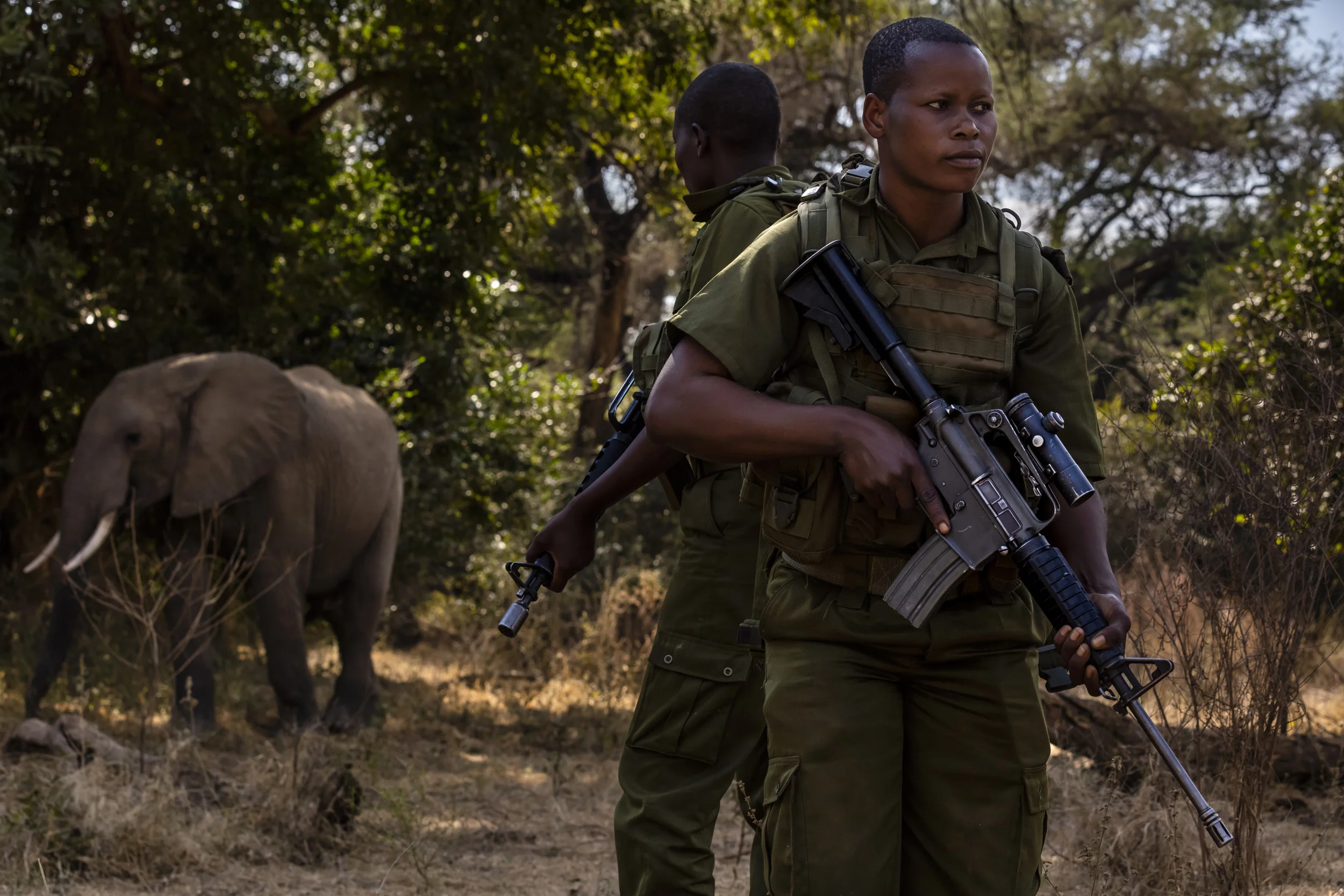
PHUNDUNDU WILDLIFE AREA, ZIMBABWE, JUNE 2018: Akashinga (meaning the ‘Brave Ones’ in local dialect) is a community-driven conservation model, empowering disadvantaged women to restore and manage a network of wilderness areas as an alternative to trophy hunting. Here some of these women are seen interacting with elephant and out on patrol. Many current western-conceived solutions to conserve wilderness areas struggle to gain traction across the African continent. Predominately male forces are hampered by ongoing corruption, nepotism, drunkenness, aggressiveness towards local communities and a sense of entitlement. The I.A.P.F, the International Anti-Poaching Foundation led by former Australian Special Forces soldier Damien Mander, was created as a direct action conservation organisation to be used as a surgical instrument in targeting wildlife crime. In 2017 they decided to innovate, using an all- female team to manage an entire nature reserve in Zimbabwe. The program builds an alternative approach to the militarized paradigm of ‘fortress conservation’ which defends colonial boundaries between nature and humans. While still trained to deal with any situation they may face, the team has a community-driven interpersonal focus, working with rather than against the local population for the long-term benefits of their own communities and nature. Cut off from places of worship and burial, grazing areas, access to water, food, traditional medicine and given limited opportunity for employment or tourism benefits, it’s little wonder many of these communities struggle to see any value in conservation efforts. Women have traditionally played major roles in battle and are now re-emerging as key solutions in law enforcement and conflict resolution. In the Middle-East, counterinsurgency operations that involve penetrating and working with the local population to try and win the hearts and minds have become fundamentally reliant on the nature, credibility and intuition o

PHUNDUNDU WILDLIFE AREA, ZIMBABWE, DECEMBER 2018: A 5 member patrol cooks vegan food at an observation point in the wilderness they protect in Phundundu. This patrol is in the bush for 5 days at a time. They are part of an all female conservation ranger force known as “Akashinga” Akashinga (meaning the ‘Brave Ones’) is a community-driven conservation model, empowering disadvantaged women to restore and manage a network of wilderness areas as an alternative to trophy hunting in Zimbabwe. Predominately male forces are often hampered by ongoing corruption, nepotism, drunkenness, aggressiveness towards local communities and a sense of entitlement. The International Anti-Poaching Foundation, led by former Australian Special Forces soldier Damien Mander, was created as a direct action conservation organization used as a surgical instrument in targeting wildlife crime. In 2017 they decided to innovate, using an all- female team to manage an entire nature reserve in Zimbabwe. The program builds an alternative approach to the militarized paradigm of ‘fortress conservation’ that defends colonial boundaries between nature and humans. While still trained to deal with any situation they may face, the team has a community-driven interpersonal focus, working with rather than against the local population for the long-term benefits of their own communities and nature.

PHUNDUNDU WILDLIFE AREA, ZIMBABWE, DECEMBER 2018: Members of the all female conservation ranger force known as “Akashinga” undergo house penetration training near their base for operations against organized environmental criminals. Akashinga (meaning the ‘Brave Ones’) is a community-driven conservation model, empowering disadvantaged women to restore and manage a network of wilderness areas as an alternative to trophy hunting in Zimbabwe. Predominately male forces are often hampered by ongoing corruption, nepotism, drunkenness, aggressiveness towards local communities and a sense of entitlement. The International Anti-Poaching Foundation, led by former Australian Special Forces soldier Damien Mander, was created as a direct action conservation organization used as a surgical instrument in targeting wildlife crime. In 2017 they decided to innovate, using an all- female team to manage an entire nature reserve in Zimbabwe. The program builds an alternative approach to the militarized paradigm of ‘fortress conservation’ that defends colonial boundaries between nature and humans. While still trained to deal with any situation they may face, the team has a community-driven interpersonal focus, working with rather than against the local population for the long-term benefits of their own communities and nature.

PHUNDUNDU WILDLIFE AREA, ZIMBABWE, DECEMBER 2018: Members of the all female conservation ranger force known as “Akashinga” undergo house penetration training near their base for operations against organized environmental criminals. They are being taught by Damien Mander, former Australian SAS member. Akashinga (meaning the ‘Brave Ones’) is a community-driven conservation model, empowering disadvantaged women to restore and manage a network of wilderness areas as an alternative to trophy hunting in Zimbabwe. Predominately male forces are often hampered by ongoing corruption, nepotism, drunkenness, aggressiveness towards local communities and a sense of entitlement. The International Anti-Poaching Foundation, led by former Australian Special Forces soldier Damien Mander, was created as a direct action conservation organization used as a surgical instrument in targeting wildlife crime. In 2017 they decided to innovate, using an all- female team to manage an entire nature reserve in Zimbabwe. The program builds an alternative approach to the militarized paradigm of ‘fortress conservation’ that defends colonial boundaries between nature and humans. While still trained to deal with any situation they may face, the team has a community-driven interpersonal focus, working with rather than against the local population for the long-term benefits of their own communities and nature.
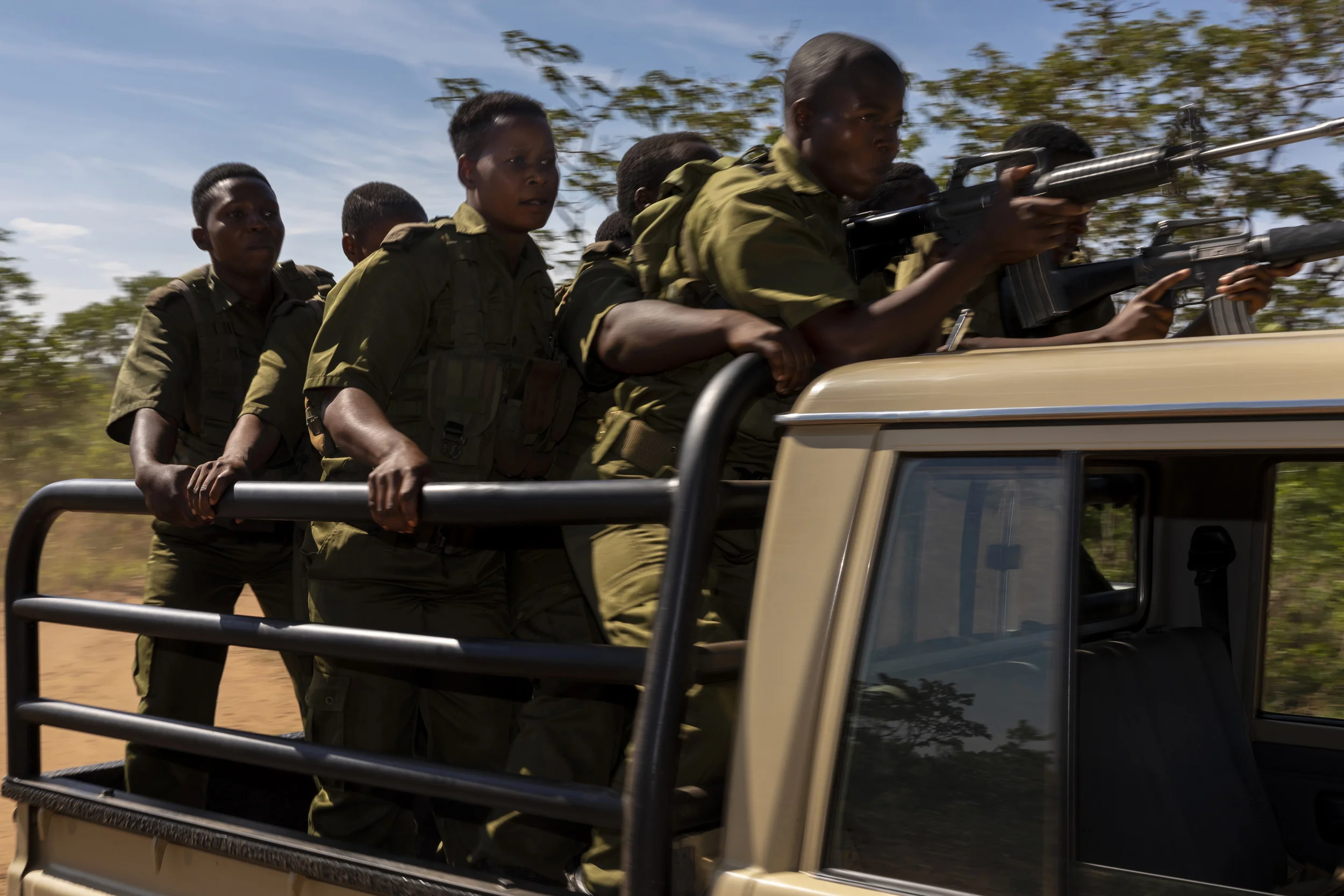
PHUNDUNDU WILDLIFE AREA, ZIMBABWE, DECEMBER 2018: Members of the all female conservation ranger force known as “Akashinga” undergo house penetration training near their base for operations against organized environmental criminals. Akashinga (meaning the ‘Brave Ones’) is a community-driven conservation model, empowering disadvantaged women to restore and manage a network of wilderness areas as an alternative to trophy hunting in Zimbabwe. Predominately male forces are often hampered by ongoing corruption, nepotism, drunkenness, aggressiveness towards local communities and a sense of entitlement. The International Anti-Poaching Foundation, led by former Australian Special Forces soldier Damien Mander, was created as a direct action conservation organization used as a surgical instrument in targeting wildlife crime. In 2017 they decided to innovate, using an all- female team to manage an entire nature reserve in Zimbabwe. The program builds an alternative approach to the militarized paradigm of ‘fortress conservation’ that defends colonial boundaries between nature and humans. While still trained to deal with any situation they may face, the team has a community-driven interpersonal focus, working with rather than against the local population for the long-term benefits of their own communities and nature.

PHUNDUNDU WILDLIFE AREA, ZIMBABWE, DECEMBER 2018: Members of the all female conservation ranger force known as “Akashinga” undergo house penetration training near their base for operations against organized environmental criminals. Akashinga (meaning the ‘Brave Ones’) is a community-driven conservation model, empowering disadvantaged women to restore and manage a network of wilderness areas as an alternative to trophy hunting in Zimbabwe. Predominately male forces are often hampered by ongoing corruption, nepotism, drunkenness, aggressiveness towards local communities and a sense of entitlement. The International Anti-Poaching Foundation, led by former Australian Special Forces soldier Damien Mander, was created as a direct action conservation organization used as a surgical instrument in targeting wildlife crime. In 2017 they decided to innovate, using an all- female team to manage an entire nature reserve in Zimbabwe. The program builds an alternative approach to the militarized paradigm of ‘fortress conservation’ that defends colonial boundaries between nature and humans. While still trained to deal with any situation they may face, the team has a community-driven interpersonal focus, working with rather than against the local population for the long-term benefits of their own communities and nature.

KAROI, ZIMBABWE, DECEMBER 2018: Members of the all- female conservation ranger force known as “Akashinga” prepare to enter a dwelling during a 2am night operation against a known poaching group, working alongside Zimbabwean Criminal Investigation Division officers. Intelligence for the operation was gathered through the Akashinga community intelligence networks and MAPP, an anti-poaching group that works hand in hand with these female rangers. Akashinga (meaning the ‘Brave Ones’ in local dialect) is a community-driven conservation model, empowering disadvantaged women to restore and manage a network of wilderness areas as an alternative to trophy hunting in Zimbabwe. Predominately male forces are hampered by ongoing corruption, nepotism, drunkenness, aggressiveness towards local communities and a sense of entitlement. The I.A.P.F, the International Anti-Poaching Foundation led by former Australian Special Forces soldier Damien Mander, was created as a direct action conservation organisation to be used as a surgical instrument in targeting wildlife crime. In 2017 they decided to innovate, using an all- female team to manage an entire nature reserve in Zimbabwe. The program builds an alternative approach to the militarized paradigm of ‘fortress conservation’ which defends colonial boundaries between nature and humans. While still trained to deal with any situation they may face, the team has a community-driven interpersonal focus, working with rather than against the local population for the long-term benefits of their own communities and nature.

KAROI, ZIMBABWE, DECEMBER 2018: Members of the all- female conservation ranger force known as “Akashinga” speak to a teenager to gain information during a 2am night operation against a known poaching group, they were working alongside Zimbabwean Criminal Investigation Division officers. Intelligence for the operation was gathered through the Akashinga community intelligence networks and MAPP, an anti-poaching group that works hand in hand with these female rangers. Akashinga (meaning the ‘Brave Ones’ in local dialect) is a community-driven conservation model, empowering disadvantaged women to restore and manage a network of wilderness areas as an alternative to trophy hunting in Zimbabwe. Predominately male forces are hampered by ongoing corruption, nepotism, drunkenness, aggressiveness towards local communities and a sense of entitlement. The I.A.P.F, the International Anti-Poaching Foundation led by former Australian Special Forces soldier Damien Mander, was created as a direct action conservation organisation to be used as a surgical instrument in targeting wildlife crime. In 2017 they decided to innovate, using an all- female team to manage an entire nature reserve in Zimbabwe. The program builds an alternative approach to the militarized paradigm of ‘fortress conservation’ which defends colonial boundaries between nature and humans. While still trained to deal with any situation they may face, the team has a community-driven interpersonal focus, working with rather than against the local population for the long-term benefits of their own communities and nature.

MAKUTI, ZIMBABWE, DECEMBER 2018: Members of the all- female conservation ranger force known as “Akashinga” arrest a notorious wildlife poacher and discover sacks of skins in his basement. Intelligence for the operation was gathered through the Akashinga community intelligence networks and M.A.P.P, an anti-poaching group that works hand in hand with these female rangers. Akashinga (meaning the ‘Brave Ones’ in local dialect) is a community-driven conservation model, empowering disadvantaged women to restore and manage a network of wilderness areas as an alternative to trophy hunting in Zimbabwe. Predominately male forces are hampered by ongoing corruption, nepotism, drunkenness, aggressiveness towards local communities and a sense of entitlement. The I.A.P.F, the International Anti-Poaching Foundation led by former Australian Special Forces soldier Damien Mander, was created as a direct action conservation organisation to be used as a surgical instrument in targeting wildlife crime. In 2017 they decided to innovate, using an all- female team to manage an entire nature reserve in Zimbabwe. The program builds an alternative approach to the militarized paradigm of ‘fortress conservation’ which defends colonial boundaries between nature and humans. While still trained to deal with any situation they may face, the team has a community-driven interpersonal focus, working with rather than against the local population for the long-term benefits of their own communities and nature.

MAKUTI, ZIMBABWE, DECEMBER 2018: Members of the all- female conservation ranger force known as “Akashinga” arrest a notorious wildlife poacher and discover sacks of skins in his basement. Intelligence for the operation was gathered through the Akashinga community intelligence networks and M.A.P.P, an anti-poaching group that works hand in hand with these female rangers. Akashinga (meaning the ‘Brave Ones’ in local dialect) is a community-driven conservation model, empowering disadvantaged women to restore and manage a network of wilderness areas as an alternative to trophy hunting in Zimbabwe. Predominately male forces are hampered by ongoing corruption, nepotism, drunkenness, aggressiveness towards local communities and a sense of entitlement. The I.A.P.F, the International Anti-Poaching Foundation led by former Australian Special Forces soldier Damien Mander, was created as a direct action conservation organisation to be used as a surgical instrument in targeting wildlife crime. In 2017 they decided to innovate, using an all- female team to manage an entire nature reserve in Zimbabwe. The program builds an alternative approach to the militarized paradigm of ‘fortress conservation’ which defends colonial boundaries between nature and humans. While still trained to deal with any situation they may face, the team has a community-driven interpersonal focus, working with rather than against the local population for the long-term benefits of their own communities and nature.

MAKUTI, ZIMBABWE, DECEMBER 2018: Members of the all- female conservation ranger force known as “Akashinga” arrest a notorious wildlife poacher and confiscate hunting rifles used to illegally shoot wildlife. Intelligence for the operation was gathered through the Akashinga community intelligence networks and M.A.P.P, an anti-poaching group that works hand in hand with these female rangers. Akashinga (meaning the ‘Brave Ones’ in local dialect) is a community-driven conservation model, empowering disadvantaged women to restore and manage a network of wilderness areas as an alternative to trophy hunting in Zimbabwe. Predominately male forces are hampered by ongoing corruption, nepotism, drunkenness, aggressiveness towards local communities and a sense of entitlement. The I.A.P.F, the International Anti-Poaching Foundation led by former Australian Special Forces soldier Damien Mander, was created as a direct action conservation organisation to be used as a surgical instrument in targeting wildlife crime. In 2017 they decided to innovate, using an all- female team to manage an entire nature reserve in Zimbabwe. The program builds an alternative approach to the militarized paradigm of ‘fortress conservation’ which defends colonial boundaries between nature and humans. While still trained to deal with any situation they may face, the team has a community-driven interpersonal focus, working with rather than against the local population for the long-term benefits of their own communities and nature.

MAKUTI, ZIMBABWE, DECEMBER 2018: Members of the all- female conservation ranger force known as “Akashinga” arrest a notorious wildlife poacher and confiscate hunting rifles used to illegally shoot wildlife. Intelligence for the operation was gathered through the Akashinga community intelligence networks and M.A.P.P, an anti-poaching group that works hand in hand with these female rangers. Akashinga (meaning the ‘Brave Ones’ in local dialect) is a community-driven conservation model, empowering disadvantaged women to restore and manage a network of wilderness areas as an alternative to trophy hunting in Zimbabwe. Predominately male forces are hampered by ongoing corruption, nepotism, drunkenness, aggressiveness towards local communities and a sense of entitlement. The I.A.P.F, the International Anti-Poaching Foundation led by former Australian Special Forces soldier Damien Mander, was created as a direct action conservation organisation to be used as a surgical instrument in targeting wildlife crime. In 2017 they decided to innovate, using an all- female team to manage an entire nature reserve in Zimbabwe. The program builds an alternative approach to the militarized paradigm of ‘fortress conservation’ which defends colonial boundaries between nature and humans. While still trained to deal with any situation they may face, the team has a community-driven interpersonal focus, working with rather than against the local population for the long-term benefits of their own communities and nature.

CHIRUNDU, ZIMBABWE, DECEMBER 2018: The wife of a poacher hands over illegal animal skins to a member of the female conservation ranger force known as “Akashinga.” Intelligence for this anti-poaching operation was gathered through the Akashinga community intelligence networks and M.A.P.P, an anti-poaching group that works hand in hand with these female rangers. Akashinga (meaning the ‘Brave Ones’ in local dialect) is a community-driven conservation model, empowering disadvantaged women to restore and manage a network of wilderness areas as an alternative to trophy hunting in Zimbabwe. Predominately male forces are hampered by ongoing corruption, nepotism, drunkenness, aggressiveness towards local communities and a sense of entitlement. The I.A.P.F, the International Anti-Poaching Foundation led by former Australian Special Forces soldier Damien Mander, was created as a direct action conservation organisation to be used as a surgical instrument in targeting wildlife crime. In 2017 they decided to innovate, using an all- female team to manage an entire nature reserve in Zimbabwe. The program builds an alternative approach to the militarized paradigm of ‘fortress conservation’ which defends colonial boundaries between nature and humans. While still trained to deal with any situation they may face, the team has a community-driven interpersonal focus, working with rather than against the local population for the long-term benefits of their own communities and nature.

KAROI, ZIMBABWE, DECEMBER 2018: Members of the all- female conservation ranger force known as “Akashinga” interview a poachers wife during a night operation against a known poaching group, working alongside Zimbabwean Criminal Investigation Division officers. Intelligence for the operation was gathered through the Akashinga community intelligence networks and MAPP, an anti-poaching group that works hand in hand with these female rangers. Akashinga (meaning the ‘Brave Ones’ in local dialect) is a community-driven conservation model, empowering disadvantaged women to restore and manage a network of wilderness areas as an alternative to trophy hunting in Zimbabwe. Predominately male forces are hampered by ongoing corruption, nepotism, drunkenness, aggressiveness towards local communities and a sense of entitlement. The I.A.P.F, the International Anti-Poaching Foundation led by former Australian Special Forces soldier Damien Mander, was created as a direct action conservation organisation to be used as a surgical instrument in targeting wildlife crime. In 2017 they decided to innovate, using an all- female team to manage an entire nature reserve in Zimbabwe. The program builds an alternative approach to the militarized paradigm of ‘fortress conservation’ which defends colonial boundaries between nature and humans. While still trained to deal with any situation they may face, the team has a community-driven interpersonal focus, working with rather than against the local population for the long-term benefits of their own communities and nature.

MAKUTI, ZIMBABWE, DECEMBER 2018: Members of the all- female conservation ranger force known as “Akashinga” arrest a notorious wildlife poacher after discovering leopard skins and other animals parts in his home. They are seen taking video testimony for court proceedings, it is likely this man will receive a minimum five years in prison. Intelligence for the operation was gathered through the Akashinga community intelligence networks and M.A.P.P, an anti-poaching group that works hand in hand with these female rangers. Akashinga (meaning the ‘Brave Ones’ in local dialect) is a community-driven conservation model, empowering disadvantaged women to restore and manage a network of wilderness areas as an alternative to trophy hunting in Zimbabwe. Predominately male forces are hampered by ongoing corruption, nepotism, drunkenness, aggressiveness towards local communities and a sense of entitlement. The I.A.P.F, the International Anti-Poaching Foundation led by former Australian Special Forces soldier Damien Mander, was created as a direct action conservation organisation to be used as a surgical instrument in targeting wildlife crime. In 2017 they decided to innovate, using an all- female team to manage an entire nature reserve in Zimbabwe. The program builds an alternative approach to the militarized paradigm of ‘fortress conservation’ which defends colonial boundaries between nature and humans. While still trained to deal with any situation they may face, the team has a community-driven interpersonal focus, working with rather than against the local population for the long-term benefits of their own communities and nature.

MAKUTI, ZIMBABWE, DECEMBER 2018: Members of the all- female conservation ranger force known as “Akashinga” arrest a notorious wildlife poacher after discovering leopard skins and other animals parts in his home. They are seen taking video testimony for court proceedings, it is likely this man will receive a minimum five years in prison. Intelligence for the operation was gathered through the Akashinga community intelligence networks and M.A.P.P, an anti-poaching group that works hand in hand with these female rangers. Akashinga (meaning the ‘Brave Ones’ in local dialect) is a community-driven conservation model, empowering disadvantaged women to restore and manage a network of wilderness areas as an alternative to trophy hunting in Zimbabwe. Predominately male forces are hampered by ongoing corruption, nepotism, drunkenness, aggressiveness towards local communities and a sense of entitlement. The I.A.P.F, the International Anti-Poaching Foundation led by former Australian Special Forces soldier Damien Mander, was created as a direct action conservation organisation to be used as a surgical instrument in targeting wildlife crime. In 2017 they decided to innovate, using an all- female team to manage an entire nature reserve in Zimbabwe. The program builds an alternative approach to the militarized paradigm of ‘fortress conservation’ which defends colonial boundaries between nature and humans. While still trained to deal with any situation they may face, the team has a community-driven interpersonal focus, working with rather than against the local population for the long-term benefits of their own communities and nature.

MAKUTI, ZIMBABWE, DECEMBER 2018: Members of the all- female conservation ranger force known as “Akashinga” arrest a notorious wildlife poacher after discovering leopard skins and other animals parts in his home. They are seen taking video testimony for court proceedings, it is likely this man will receive a minimum five years in prison. Intelligence for the operation was gathered through the Akashinga community intelligence networks and M.A.P.P, an anti-poaching group that works hand in hand with these female rangers. Akashinga (meaning the ‘Brave Ones’ in local dialect) is a community-driven conservation model, empowering disadvantaged women to restore and manage a network of wilderness areas as an alternative to trophy hunting in Zimbabwe. Predominately male forces are hampered by ongoing corruption, nepotism, drunkenness, aggressiveness towards local communities and a sense of entitlement. The I.A.P.F, the International Anti-Poaching Foundation led by former Australian Special Forces soldier Damien Mander, was created as a direct action conservation organisation to be used as a surgical instrument in targeting wildlife crime. In 2017 they decided to innovate, using an all- female team to manage an entire nature reserve in Zimbabwe. The program builds an alternative approach to the militarized paradigm of ‘fortress conservation’ which defends colonial boundaries between nature and humans. While still trained to deal with any situation they may face, the team has a community-driven interpersonal focus, working with rather than against the local population for the long-term benefits of their own communities and nature.

MAKUTI, ZIMBABWE, DECEMBER 2018: Members of the all- female conservation ranger force known as “Akashinga” arrest a notorious wildlife poacher after discovering leopard skins and other animals parts in his home. They are seen taking video testimony for court proceedings, it is likely this man will receive a minimum five years in prison. Intelligence for the operation was gathered through the Akashinga community intelligence networks and M.A.P.P, an anti-poaching group that works hand in hand with these female rangers. Akashinga (meaning the ‘Brave Ones’ in local dialect) is a community-driven conservation model, empowering disadvantaged women to restore and manage a network of wilderness areas as an alternative to trophy hunting in Zimbabwe. Predominately male forces are hampered by ongoing corruption, nepotism, drunkenness, aggressiveness towards local communities and a sense of entitlement. The I.A.P.F, the International Anti-Poaching Foundation led by former Australian Special Forces soldier Damien Mander, was created as a direct action conservation organisation to be used as a surgical instrument in targeting wildlife crime. In 2017 they decided to innovate, using an all- female team to manage an entire nature reserve in Zimbabwe. The program builds an alternative approach to the militarized paradigm of ‘fortress conservation’ which defends colonial boundaries between nature and humans. While still trained to deal with any situation they may face, the team has a community-driven interpersonal focus, working with rather than against the local population for the long-term benefits of their own communities and nature.

CHINOY, ZIMBABWE, DECEMBER 2018: Undercover members of the all- female conservation ranger force known as “Akashinga” arrest an ivory poacher during night operations. This man had escaped custody once already until the Akashinga women tracked him down. Intelligence for the operation was gathered through the Akashinga community intelligence networks and MAPP, an anti-poaching group that works hand in hand with these female rangers. Akashinga (meaning the ‘Brave Ones’ in local dialect) is a community-driven conservation model, empowering disadvantaged women to restore and manage a network of wilderness areas as an alternative to trophy hunting in Zimbabwe. Predominately male forces are hampered by ongoing corruption, nepotism, drunkenness, aggressiveness towards local communities and a sense of entitlement. The I.A.P.F, the International Anti-Poaching Foundation led by former Australian Special Forces soldier Damien Mander, was created as a direct action conservation organisation to be used as a surgical instrument in targeting wildlife crime. In 2017 they decided to innovate, using an all- female team to manage an entire nature reserve in Zimbabwe. The program builds an alternative approach to the militarized paradigm of ‘fortress conservation’ which defends colonial boundaries between nature and humans. While still trained to deal with any situation they may face, the team has a community-driven interpersonal focus, working with rather than against the local population for the long-term benefits of their own communities and nature.
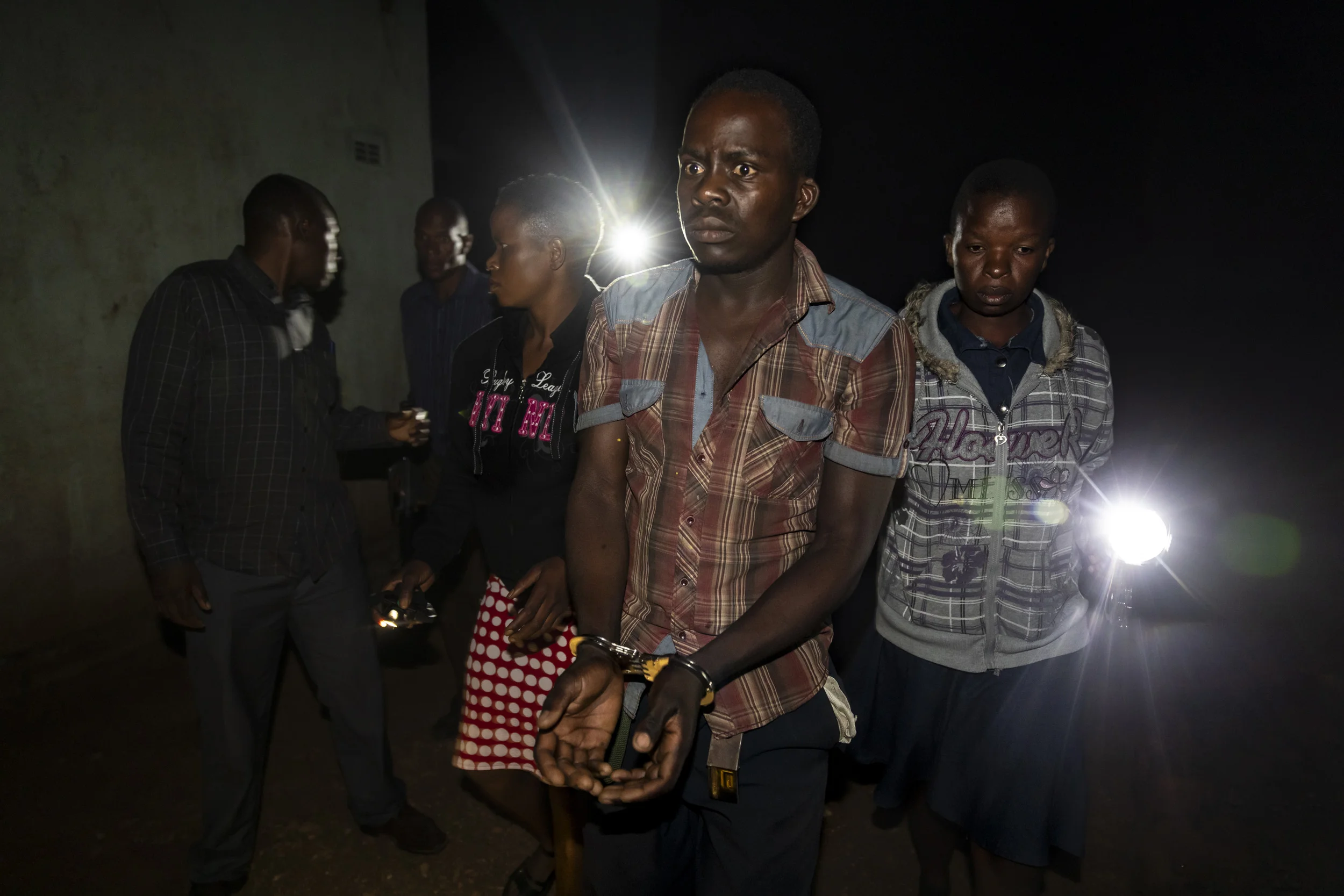
CHINOY, ZIMBABWE, DECEMBER 2018: Undercover members of the all- female conservation ranger force known as “Akashinga” arrest an ivory poacher during night operations. This man had escaped custody once already until the Akashinga women tracked him down. Intelligence for the operation was gathered through the Akashinga community intelligence networks and MAPP, an anti-poaching group that works hand in hand with these female rangers. Akashinga (meaning the ‘Brave Ones’ in local dialect) is a community-driven conservation model, empowering disadvantaged women to restore and manage a network of wilderness areas as an alternative to trophy hunting in Zimbabwe. Predominately male forces are hampered by ongoing corruption, nepotism, drunkenness, aggressiveness towards local communities and a sense of entitlement. The I.A.P.F, the International Anti-Poaching Foundation led by former Australian Special Forces soldier Damien Mander, was created as a direct action conservation organisation to be used as a surgical instrument in targeting wildlife crime. In 2017 they decided to innovate, using an all- female team to manage an entire nature reserve in Zimbabwe. The program builds an alternative approach to the militarized paradigm of ‘fortress conservation’ which defends colonial boundaries between nature and humans. While still trained to deal with any situation they may face, the team has a community-driven interpersonal focus, working with rather than against the local population for the long-term benefits of their own communities and nature.

PHUNDUNDU WILDLIFE AREA, ZIMBABWE, JUNE 2018: Members of the all female conservation ranger force Akashinga seen in a tent classroom at their base. Akashinga (meaning the ‘Brave Ones’ in local dialect) is a community-driven conservation model, empowering disadvantaged women to restore and manage a network of wilderness areas as an alternative to trophy hunting. Many current western-conceived solutions to conserve wilderness areas struggle to gain traction across the African continent. Predominately male forces are hampered by ongoing corruption, nepotism, drunkenness, aggressiveness towards local communities and a sense of entitlement. The I.A.P.F, the International Anti-Poaching Foundation led by former Australian Special Forces soldier Damien Mander, was created as a direct action conservation organisation to be used as a surgical instrument in targeting wildlife crime. In 2017 they decided to innovate, using an all- female team to manage an entire nature reserve in Zimbabwe. The program builds an alternative approach to the militarized paradigm of ‘fortress conservation’ which defends colonial boundaries between nature and humans. While still trained to deal with any situation they may face, the team has a community-driven interpersonal focus, working with rather than against the local population for the long-term benefits of their own communities and nature. Cut off from places of worship and burial, grazing areas, access to water, food, traditional medicine and given limited opportunity for employment or tourism benefits, it’s little wonder many of these communities struggle to see any value in conservation efforts. Women have traditionally played major roles in battle and are now re-emerging as key solutions in law enforcement and conflict resolution. In the Middle-East, counterinsurgency operations that involve penetrating and working with the local population to try and win the hearts and minds have become fundamentally reliant on the nature, cred

PHUNDUNDU WILDLIFE AREA, ZIMBABWE, DECEMBER 2018: Members of the all female conservation ranger force known as “Akashinga” speak with a counsellor who comes to see them twice a month at their base. Many of these women come from extremely disadvataged and abusive situations and the organization believes that access to counselling is an empowering and often first time opportunity to bring up and deal with painful issues.

PHUNDUNDU WILDLIFE AREA, ZIMBABWE, JUNE 2018: Femal Rangers visit a local truck stop. Before their new roles as conservation rangers, a number of these rangers may have seen such truck stops as their only means of making money through prostitution. Akashinga (meaning the ‘Brave Ones’ in local dialect) is a community-driven conservation model, empowering disadvantaged women to restore and manage a network of wilderness areas as an alternative to trophy hunting. Many current western-conceived solutions to conserve wilderness areas struggle to gain traction across the African continent. Predominately male forces are hampered by ongoing corruption, nepotism, drunkenness, aggressiveness towards local communities and a sense of entitlement. The I.A.P.F, the International Anti-Poaching Foundation led by former Australian Special Forces soldier Damien Mander, was created as a direct action conservation organisation to be used as a surgical instrument in targeting wildlife crime. In 2017 they decided to innovate, using an all- female team to manage an entire nature reserve in Zimbabwe. The program builds an alternative approach to the militarized paradigm of ‘fortress conservation’ which defends colonial boundaries between nature and humans. While still trained to deal with any situation they may face, the team has a community-driven interpersonal focus, working with rather than against the local population for the long-term benefits of their own communities and nature. Cut off from places of worship and burial, grazing areas, access to water, food, traditional medicine and given limited opportunity for employment or tourism benefits, it’s little wonder many of these communities struggle to see any value in conservation efforts. Women have traditionally played major roles in battle and are now re-emerging as key solutions in law enforcement and conflict resolution. In the Middle-East, counterinsurgency operations that involve penetrating and working with the local

PHUNDUNDU WILDLIFE AREA, ZIMBABWE, JUNE 2018: Akashinga (meaning the ‘Brave Ones’ in local dialect) is a community-driven conservation model, empowering disadvantaged women to restore and manage a network of wilderness areas as an alternative to trophy hunting. Here members of the unit visit local schools where many of the young school girls view them as role models for self-empowerment. Many current western-conceived solutions to conserve wilderness areas struggle to gain traction across the African continent. Predominately male forces are hampered by ongoing corruption, nepotism, drunkenness, aggressiveness towards local communities and a sense of entitlement. The I.A.P.F, the International Anti-Poaching Foundation led by former Australian Special Forces soldier Damien Mander, was created as a direct action conservation organisation to be used as a surgical instrument in targeting wildlife crime. In 2017 they decided to innovate, using an all- female team to manage an entire nature reserve in Zimbabwe. The program builds an alternative approach to the militarized paradigm of ‘fortress conservation’ which defends colonial boundaries between nature and humans. While still trained to deal with any situation they may face, the team has a community-driven interpersonal focus, working with rather than against the local population for the long-term benefits of their own communities and nature. Cut off from places of worship and burial, grazing areas, access to water, food, traditional medicine and given limited opportunity for employment or tourism benefits, it’s little wonder many of these communities struggle to see any value in conservation efforts. Women have traditionally played major roles in battle and are now re-emerging as key solutions in law enforcement and conflict resolution. In the Middle-East, counterinsurgency operations that involve penetrating and working with the local population to try and win the hearts and minds have become fundamentally

PHUNDUNDU WILDLIFE AREA, ZIMBABWE, JUNE 2018: Akashinga (meaning the ‘Brave Ones’ in local dialect) is a community-driven conservation model, empowering disadvantaged women to restore and manage a network of wilderness areas as an alternative to trophy hunting. Here members of the unit visit local schools where many of the young school girls view them as role models for self-empowerment. Many current western-conceived solutions to conserve wilderness areas struggle to gain traction across the African continent. Predominately male forces are hampered by ongoing corruption, nepotism, drunkenness, aggressiveness towards local communities and a sense of entitlement. The I.A.P.F, the International Anti-Poaching Foundation led by former Australian Special Forces soldier Damien Mander, was created as a direct action conservation organisation to be used as a surgical instrument in targeting wildlife crime. In 2017 they decided to innovate, using an all- female team to manage an entire nature reserve in Zimbabwe. The program builds an alternative approach to the militarized paradigm of ‘fortress conservation’ which defends colonial boundaries between nature and humans. While still trained to deal with any situation they may face, the team has a community-driven interpersonal focus, working with rather than against the local population for the long-term benefits of their own communities and nature. Cut off from places of worship and burial, grazing areas, access to water, food, traditional medicine and given limited opportunity for employment or tourism benefits, it’s little wonder many of these communities struggle to see any value in conservation efforts. Women have traditionally played major roles in battle and are now re-emerging as key solutions in law enforcement and conflict resolution. In the Middle-East, counterinsurgency operations that involve penetrating and working with the local population to try and win the hearts and minds have become fundamentally

PHUNDUNDU WILDLIFE AREA, ZIMBABWE, JUNE 2018: The female Akashinga members voluntarily all became vegans to demonstrate their commitment to all forms of life on the planet. They are seen being served vegan meals by vegan chefs who have come from South Africa to teach the rangers about vegan cooking. Many current western-conceived solutions to conserve wilderness areas struggle to gain traction across the African continent. Predominately male forces are hampered by ongoing corruption, nepotism, drunkenness, aggressiveness towards local communities and a sense of entitlement. The I.A.P.F, the International Anti-Poaching Foundation led by former Australian Special Forces soldier Damien Mander, was created as a direct action conservation organisation to be used as a surgical instrument in targeting wildlife crime. In 2017 they decided to innovate, using an all- female team to manage an entire nature reserve in Zimbabwe. The program builds an alternative approach to the militarized paradigm of ‘fortress conservation’ which defends colonial boundaries between nature and humans. While still trained to deal with any situation they may face, the team has a community-driven interpersonal focus, working with rather than against the local population for the long-term benefits of their own communities and nature.

PHUNDUNDU WILDLIFE AREA, ZIMBABWE, JUNE 2018: Members of the all female conservation ranger force Akashinga seen in their spartan tent accommodation in their camp. Akashinga (meaning the ‘Brave Ones’ in local dialect) is a community-driven conservation model, empowering disadvantaged women to restore and manage a network of wilderness areas as an alternative to trophy hunting. Many current western-conceived solutions to conserve wilderness areas struggle to gain traction across the African continent. Predominately male forces are hampered by ongoing corruption, nepotism, drunkenness, aggressiveness towards local communities and a sense of entitlement.

PHUNDUNDU WILDLIFE AREA, ZIMBABWE, December 2018: Members of the all female conservation ranger force Akashinga seen in their spartan tent accommodation in their camp. Akashinga (meaning the ‘Brave Ones’ in local dialect) is a community-driven conservation model, empowering disadvantaged women to restore and manage a network of wilderness areas as an alternative to trophy hunting. Many current western-conceived solutions to conserve wilderness areas struggle to gain traction across the African continent. Predominately male forces are hampered by ongoing corruption, nepotism, drunkenness, aggressiveness towards local communities and a sense of entitlement.

PHUNDUNDU WILDLIFE AREA, ZIMBABWE, DECEMBER 2018: Sergeant Vimbai Kamire comes home from the bush to visit her two daughters during her time off. Sergeant Vimbai is seen as a role model in her community. Through her conservation work she has distanced herself from an extremely abusive marriage and is now able to pay school fees for her children despite coming from the poorest demographic in Zimbabwe. She is part of an all female conservation ranger force known as “Akashinga” Akashinga (meaning the ‘Brave Ones’) is a community-driven conservation model, empowering disadvantaged women to restore and manage a network of wilderness areas as an alternative to trophy hunting in Zimbabwe. Predominately male forces are often hampered by ongoing corruption, nepotism, drunkenness, aggressiveness towards local communities and a sense of entitlement. The International Anti-Poaching Foundation, led by former Australian Special Forces soldier Damien Mander, was created as a direct action conservation organization used as a surgical instrument in targeting wildlife crime. In 2017 they decided to innovate, using an all- female team to manage an entire nature reserve in Zimbabwe. The program builds an alternative approach to the militarized paradigm of ‘fortress conservation’ that defends colonial boundaries between nature and humans. While still trained to deal with any situation they may face, the team has a community-driven interpersonal focus, working with rather than against the local population for the long-term benefits of their own communities and nature.

PHUNDUNDU WILDLIFE AREA, ZIMBABWE, DECEMBER 2018: Sergeant Vimbai Kamire comes home from the bush to visit her two daughters during her time off. Sergeant Vimbai is seen as a role model in her community. Through her conservation work she has distanced herself from an extremely abusive marriage and is now able to pay school fees for her children despite coming from the poorest demographic in Zimbabwe. She is part of an all female conservation ranger force known as “Akashinga” Akashinga (meaning the ‘Brave Ones’) is a community-driven conservation model, empowering disadvantaged women to restore and manage a network of wilderness areas as an alternative to trophy hunting in Zimbabwe. Predominately male forces are often hampered by ongoing corruption, nepotism, drunkenness, aggressiveness towards local communities and a sense of entitlement. The International Anti-Poaching Foundation, led by former Australian Special Forces soldier Damien Mander, was created as a direct action conservation organization used as a surgical instrument in targeting wildlife crime. In 2017 they decided to innovate, using an all- female team to manage an entire nature reserve in Zimbabwe. The program builds an alternative approach to the militarized paradigm of ‘fortress conservation’ that defends colonial boundaries between nature and humans. While still trained to deal with any situation they may face, the team has a community-driven interpersonal focus, working with rather than against the local population for the long-term benefits of their own communities and nature.
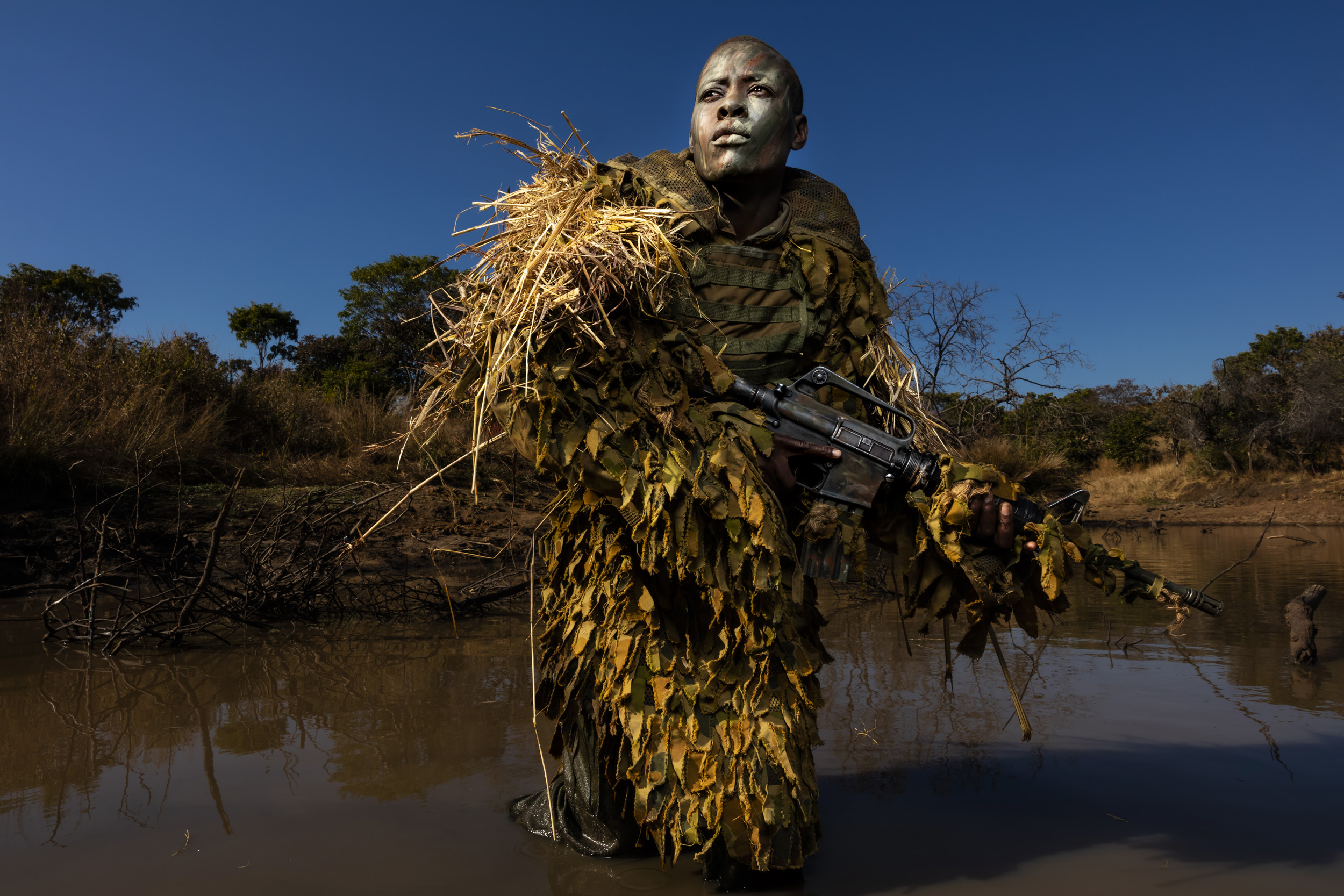
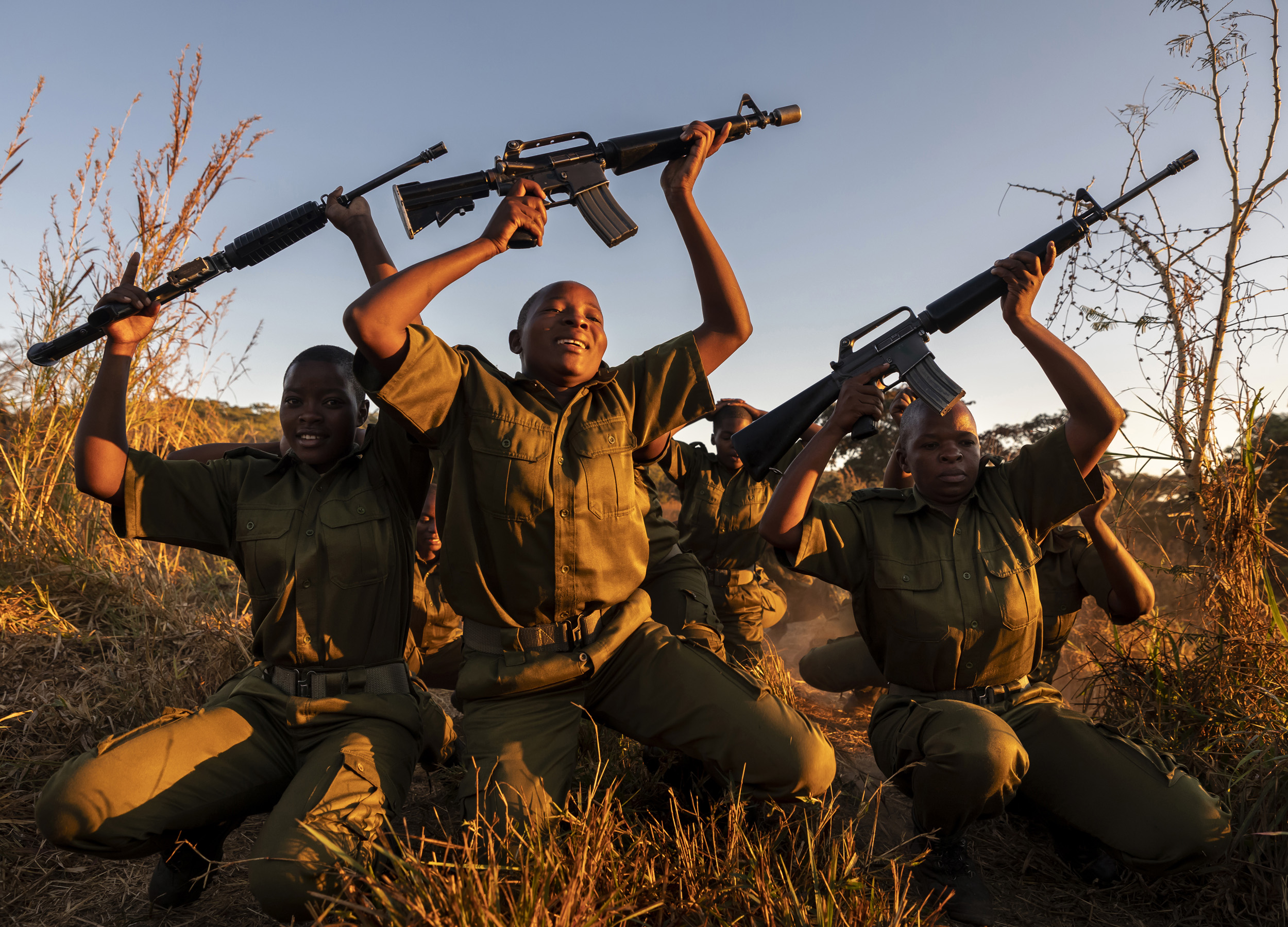
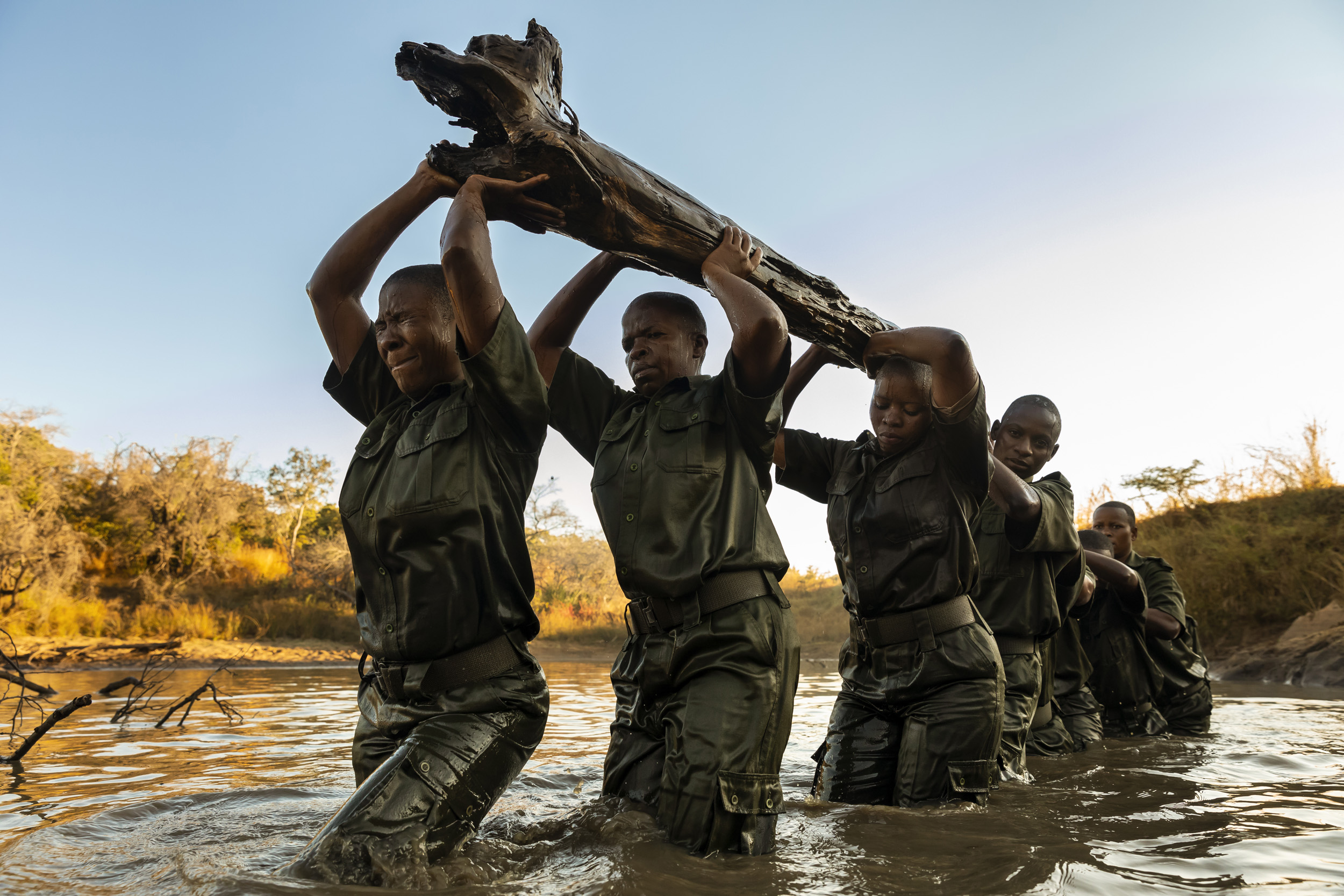
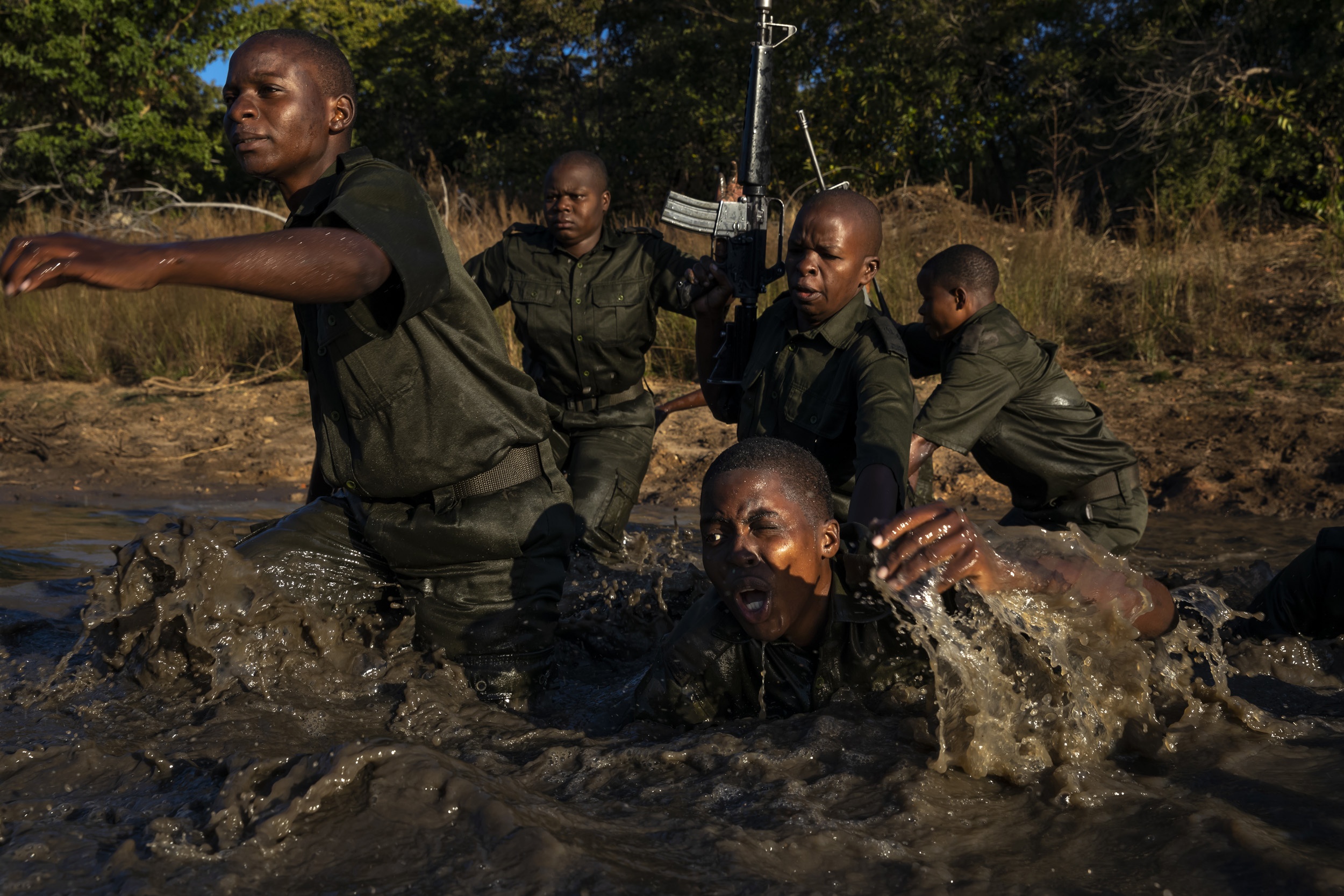
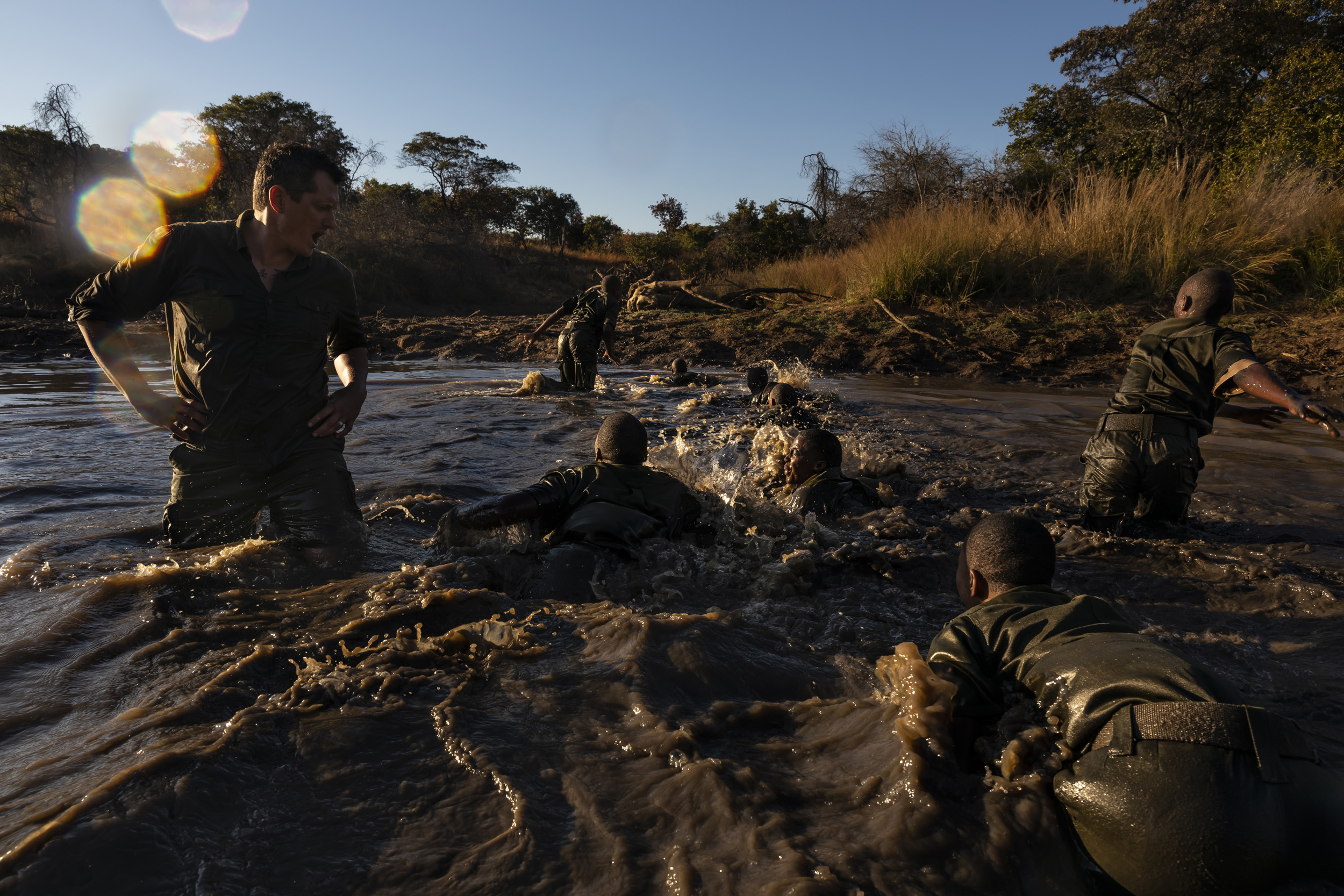

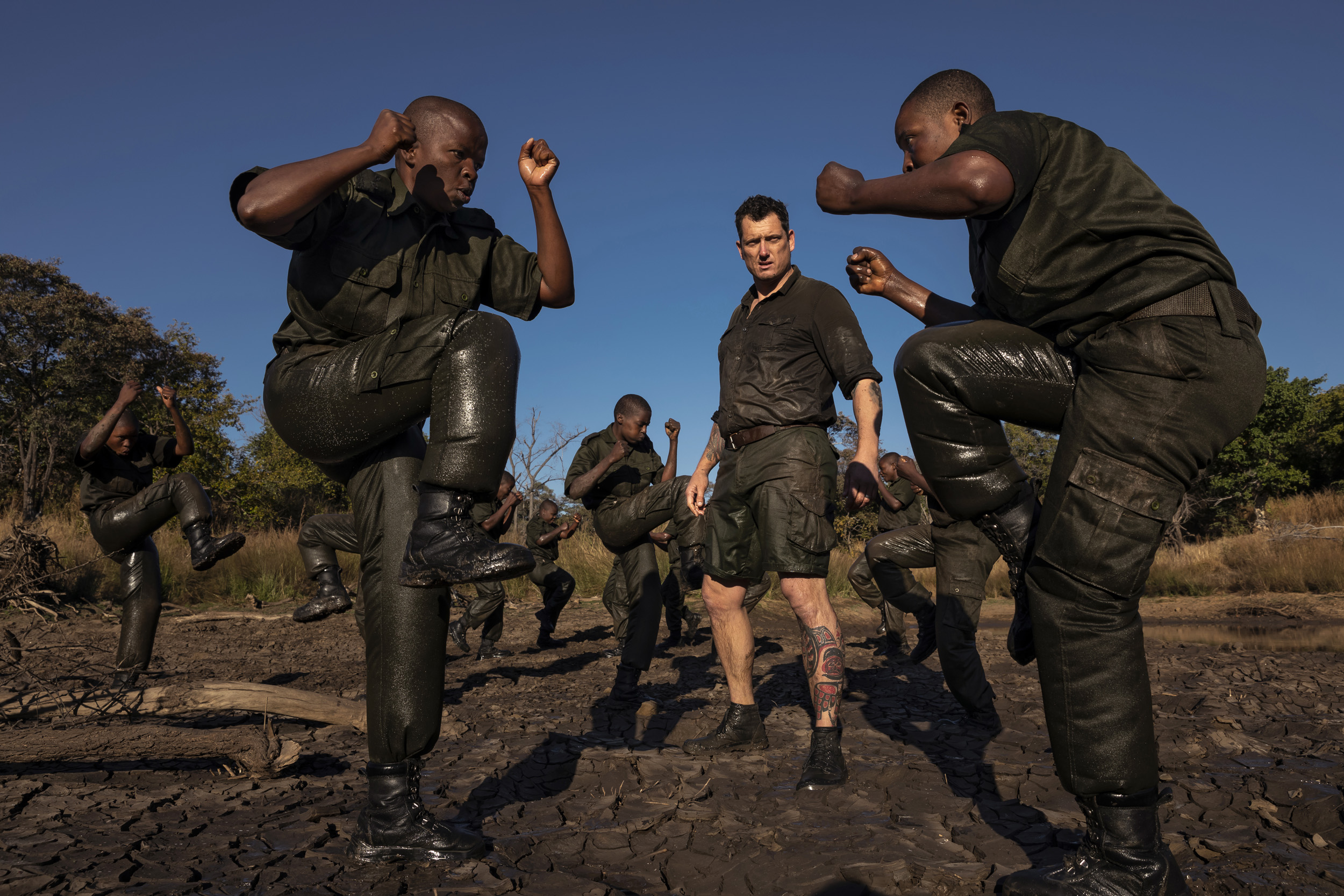
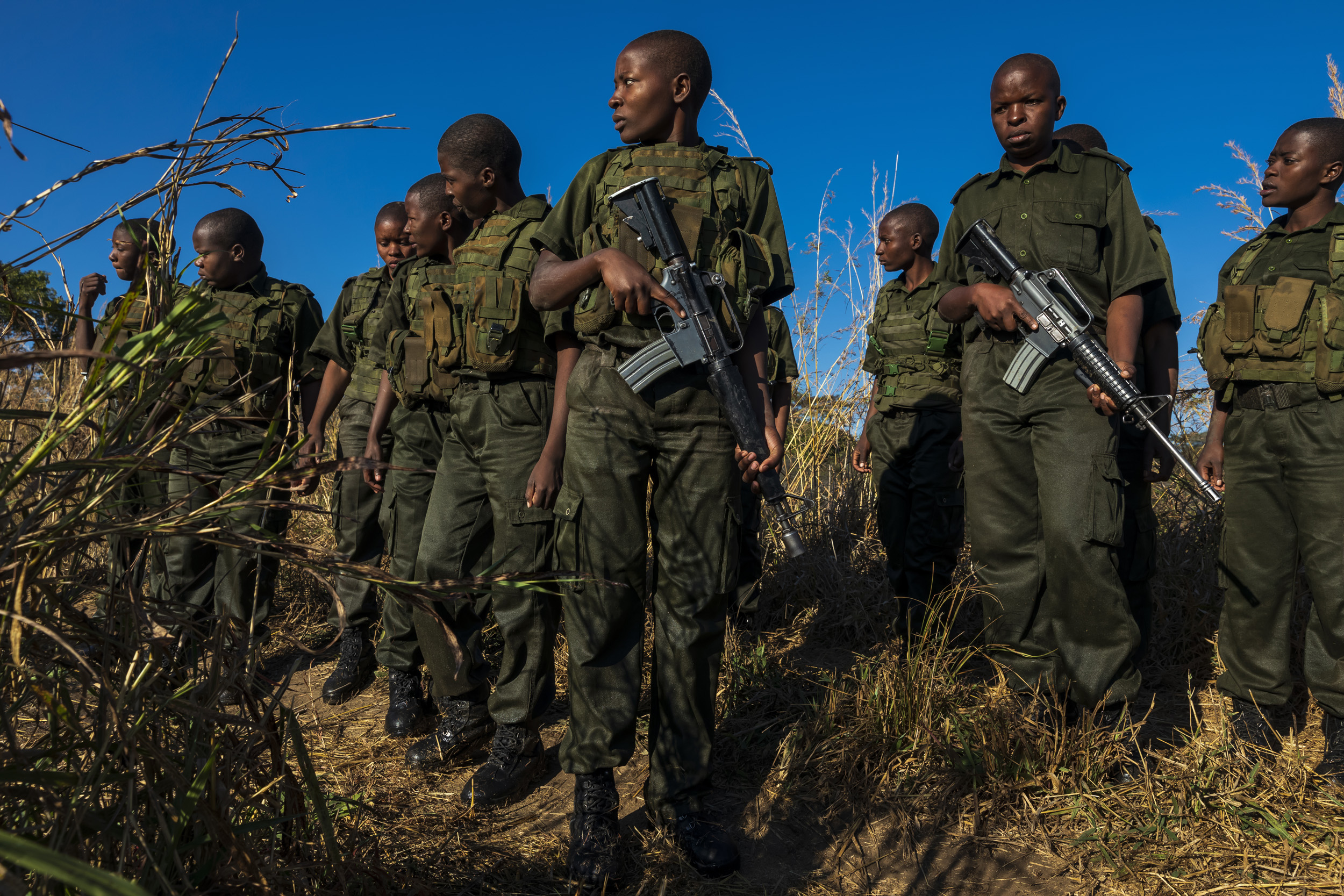
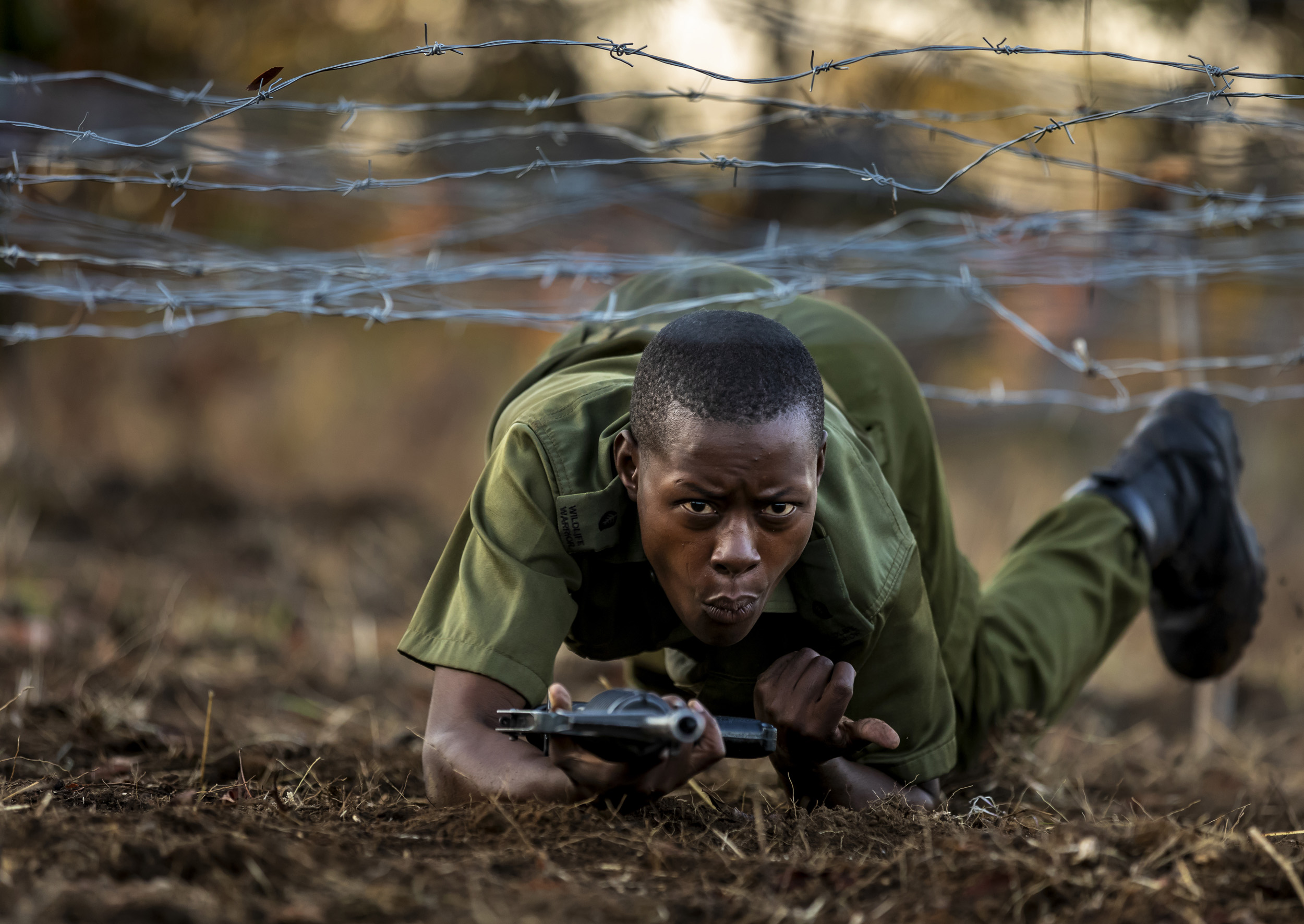
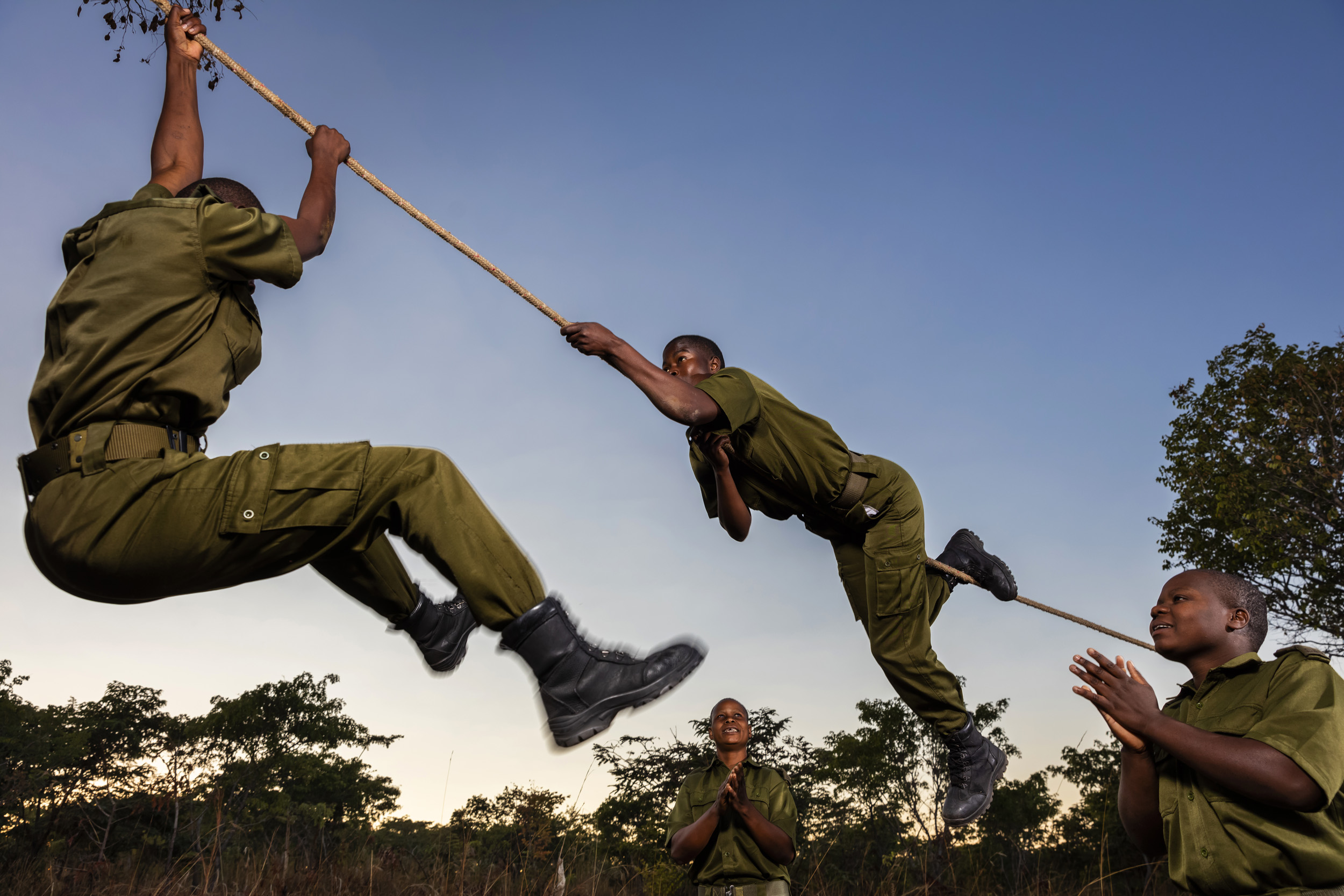
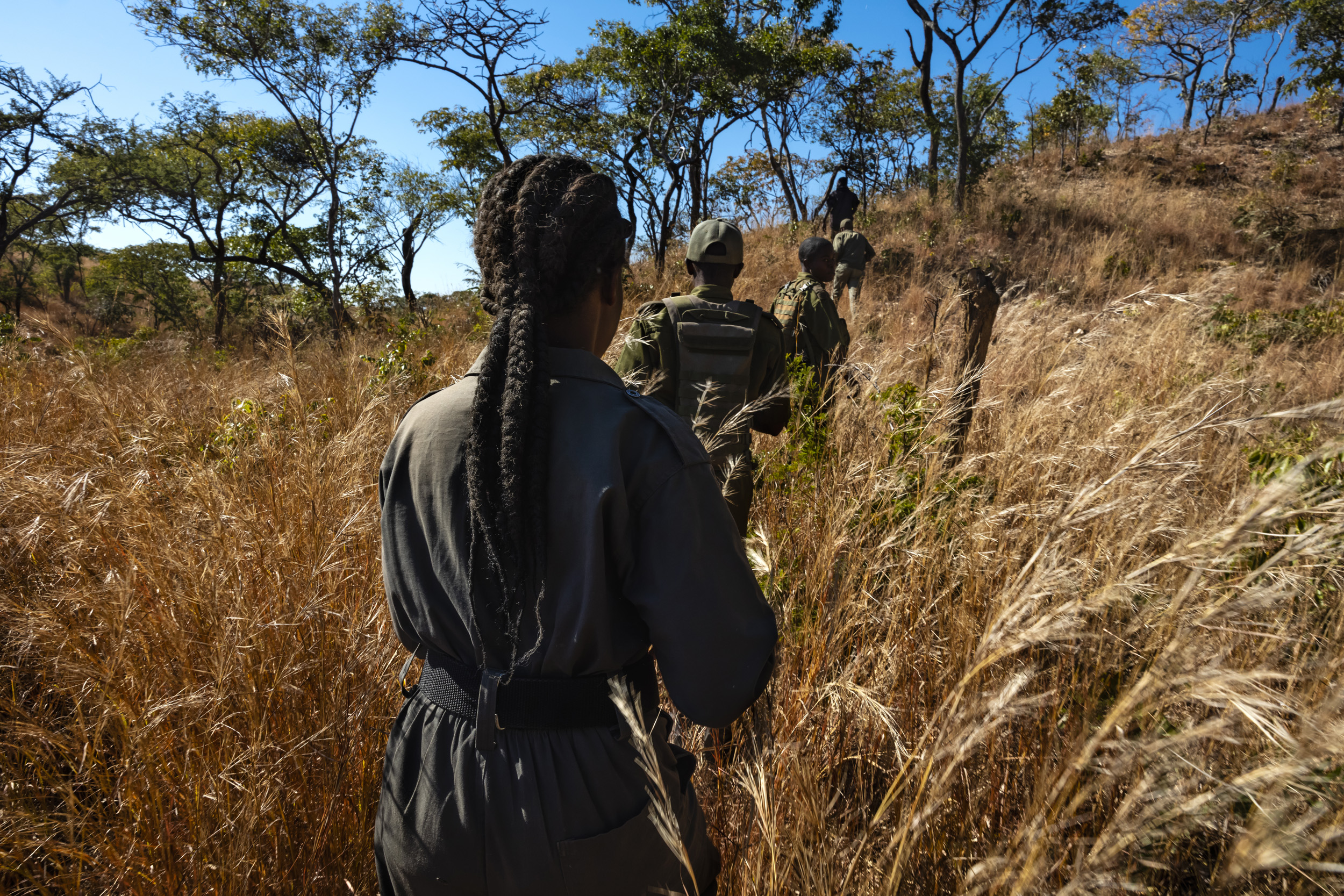
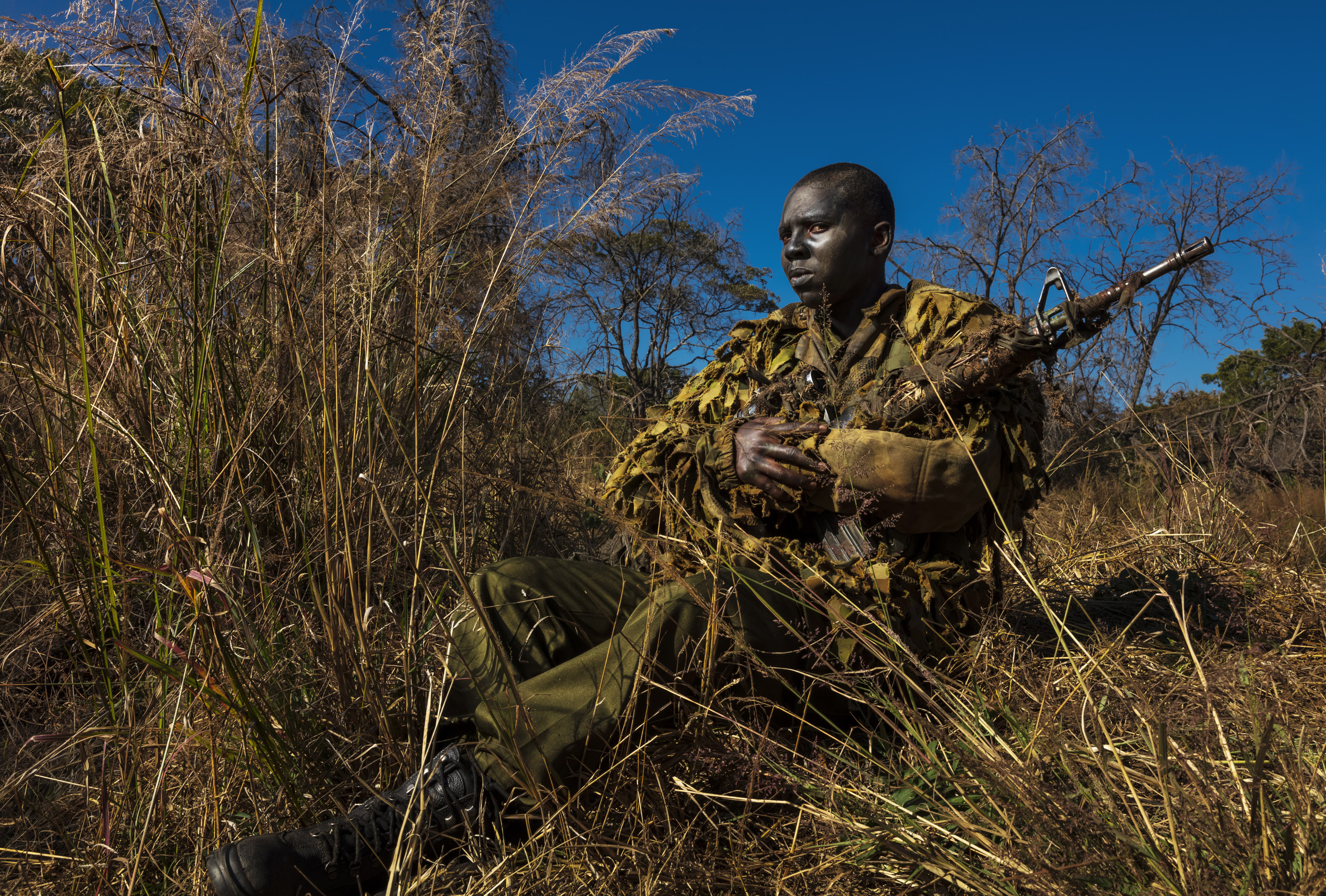
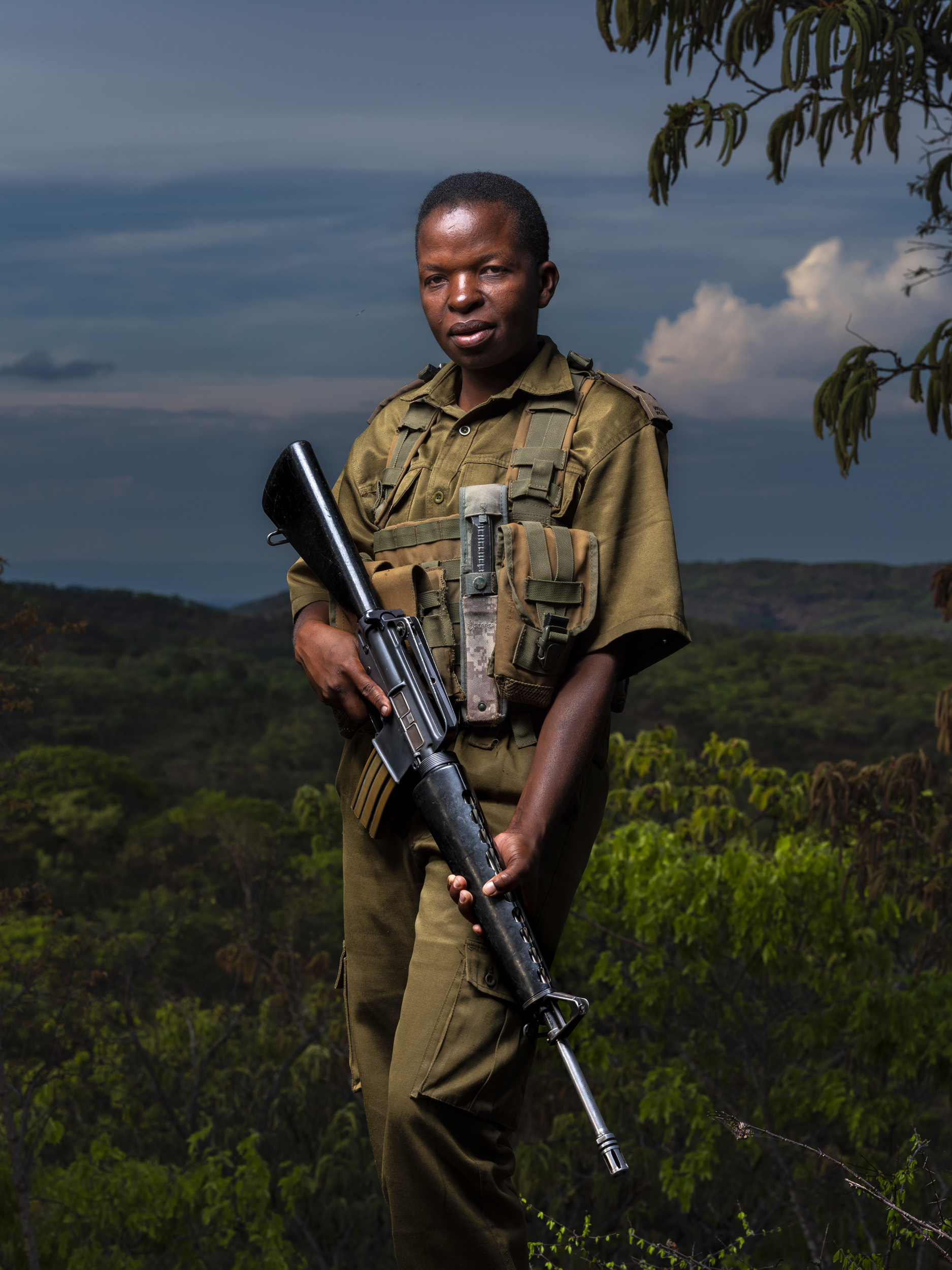
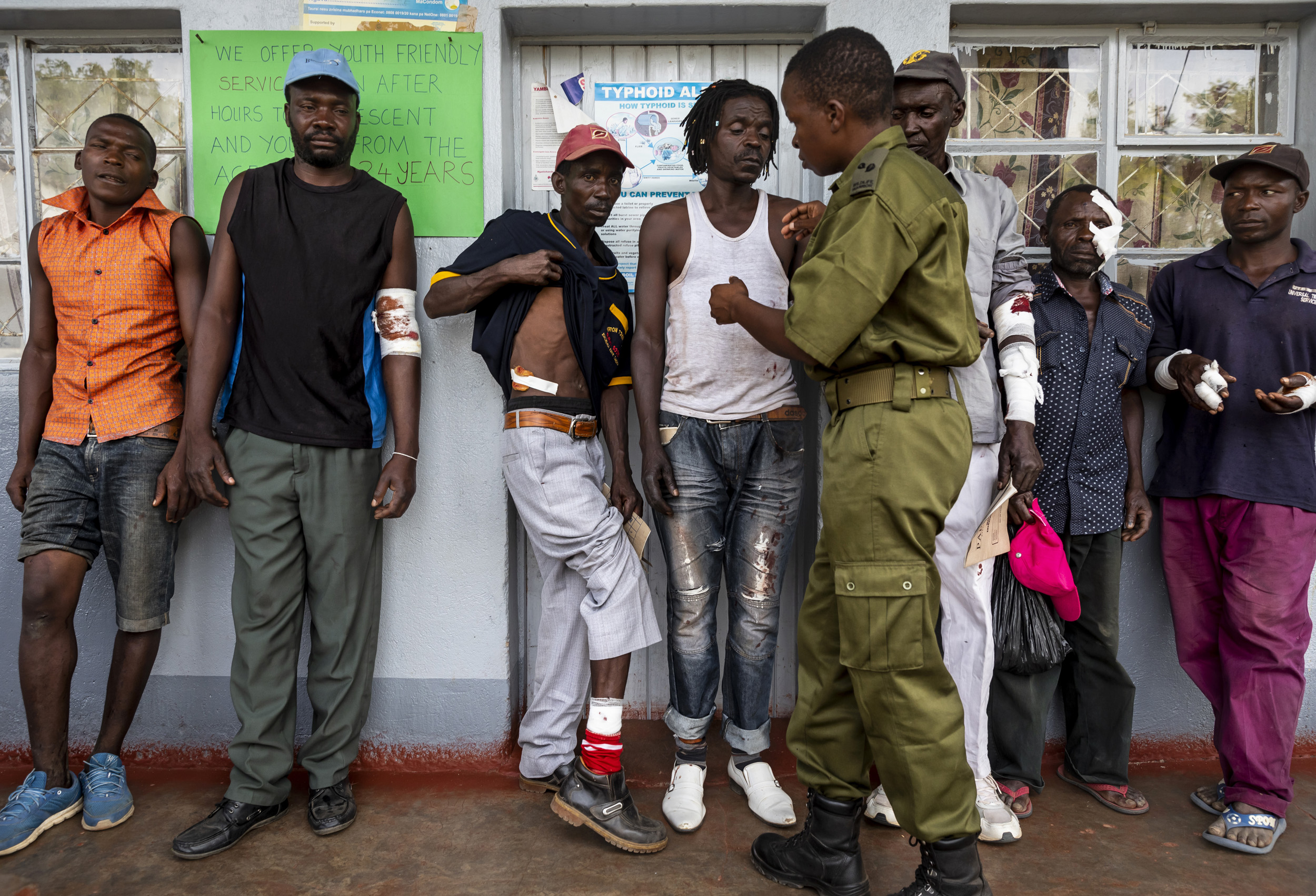
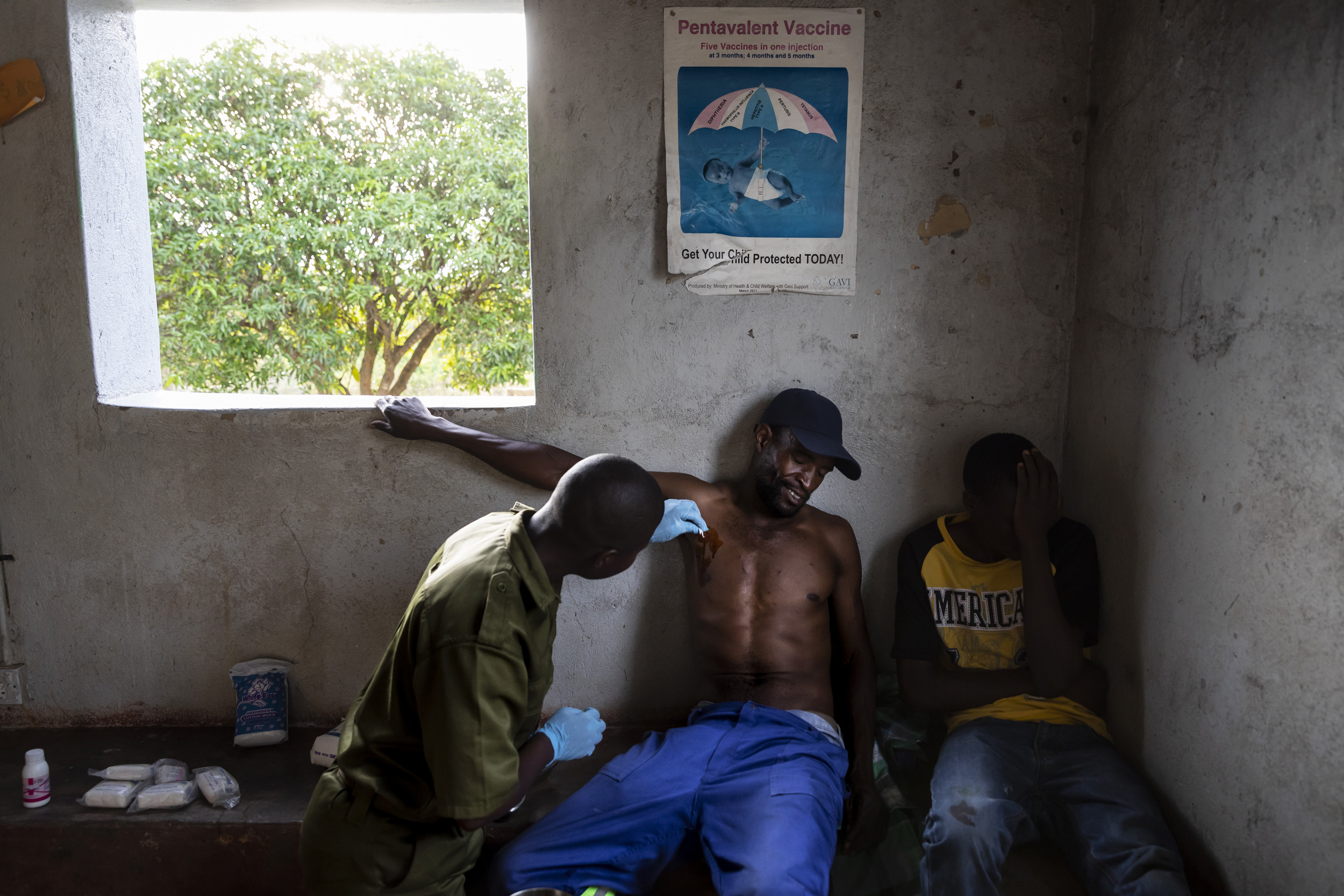
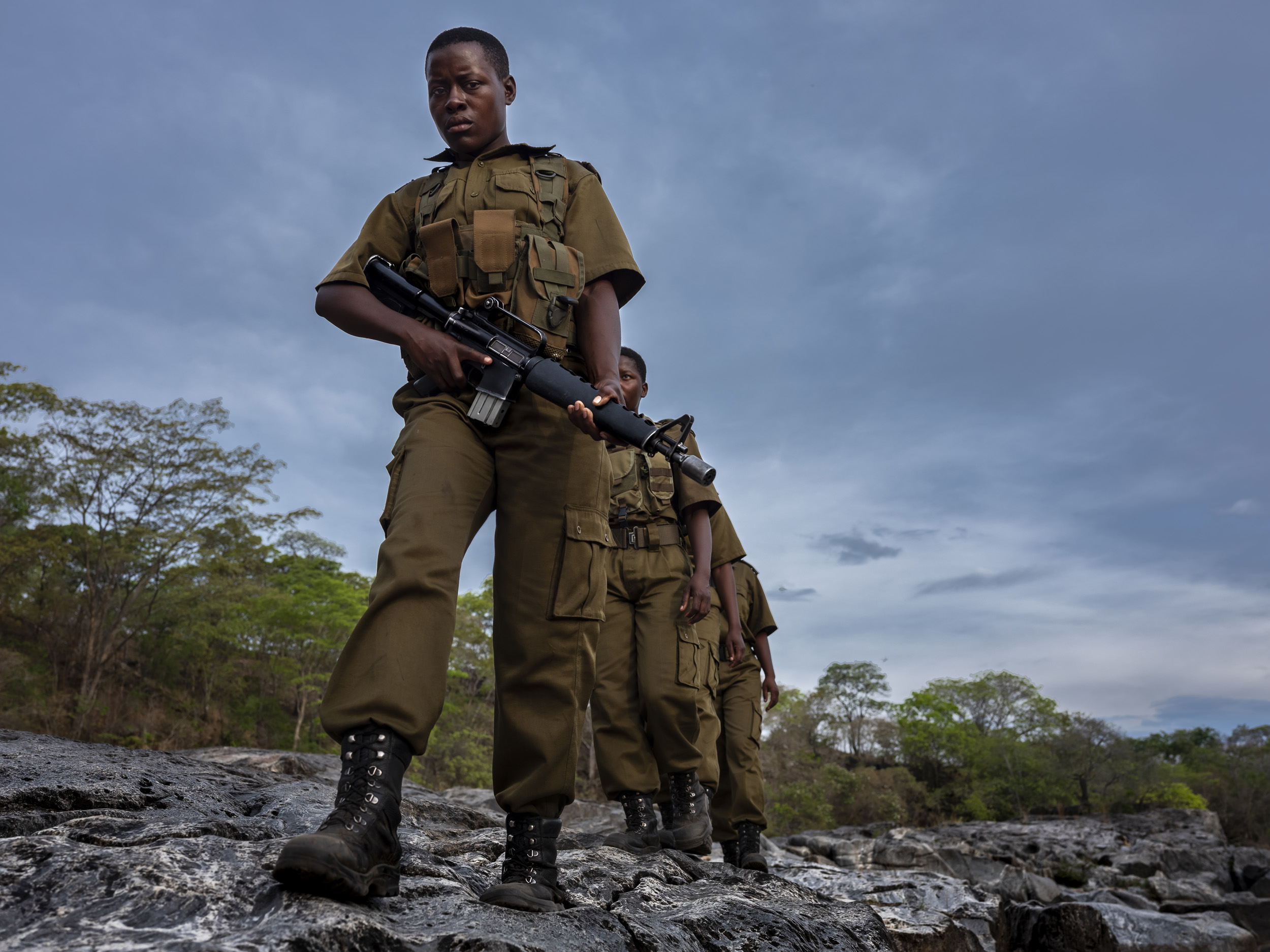
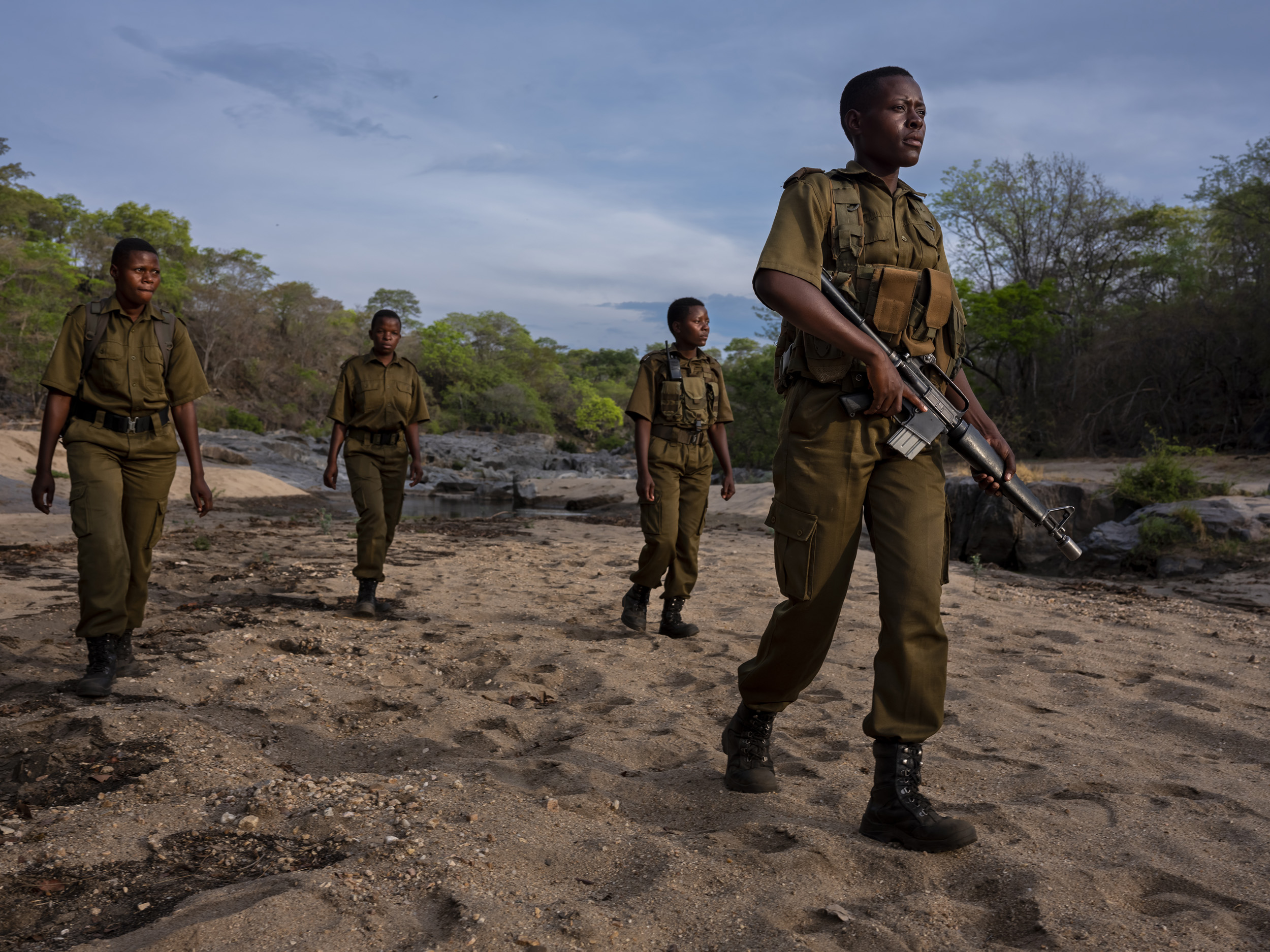
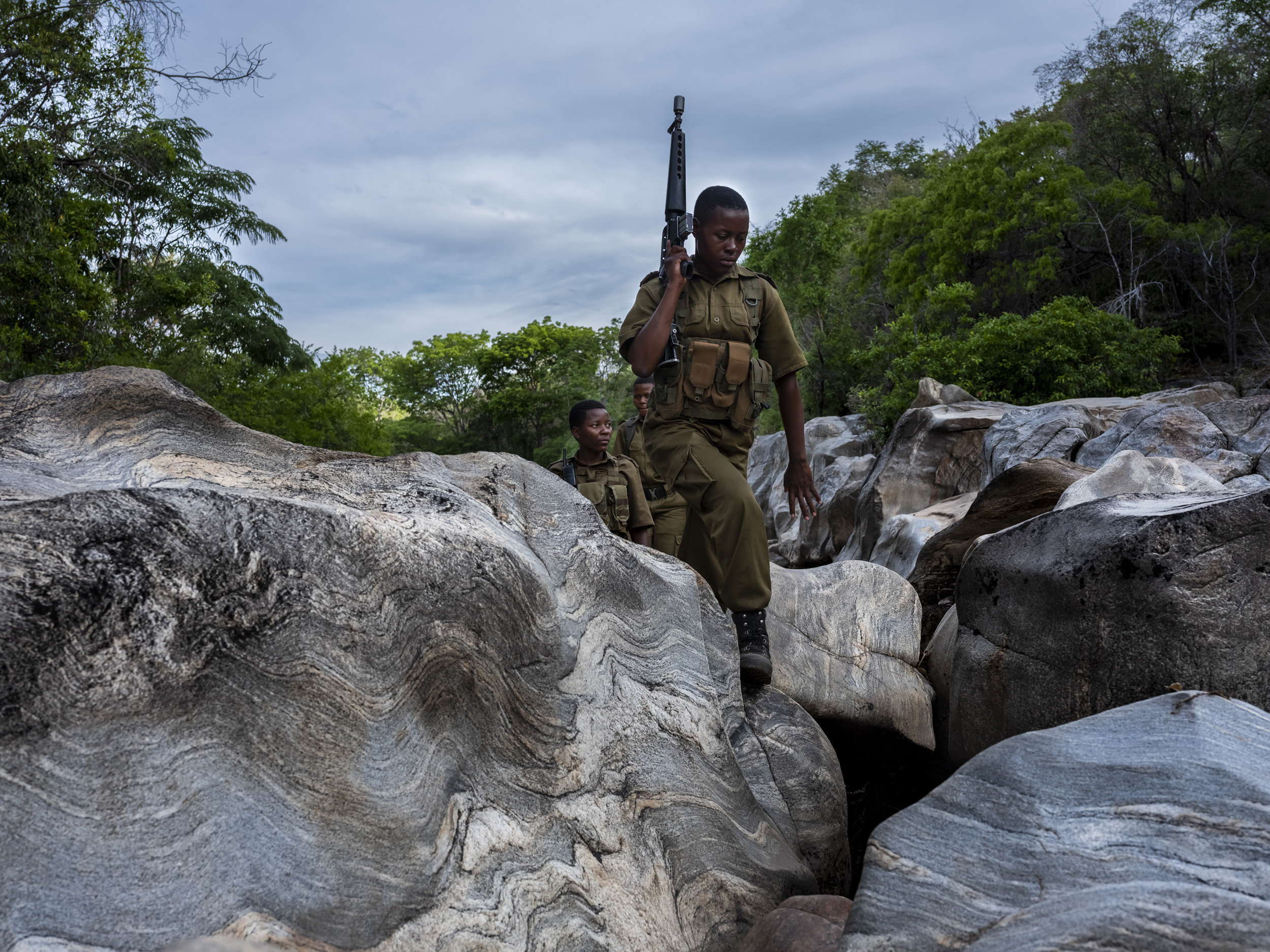
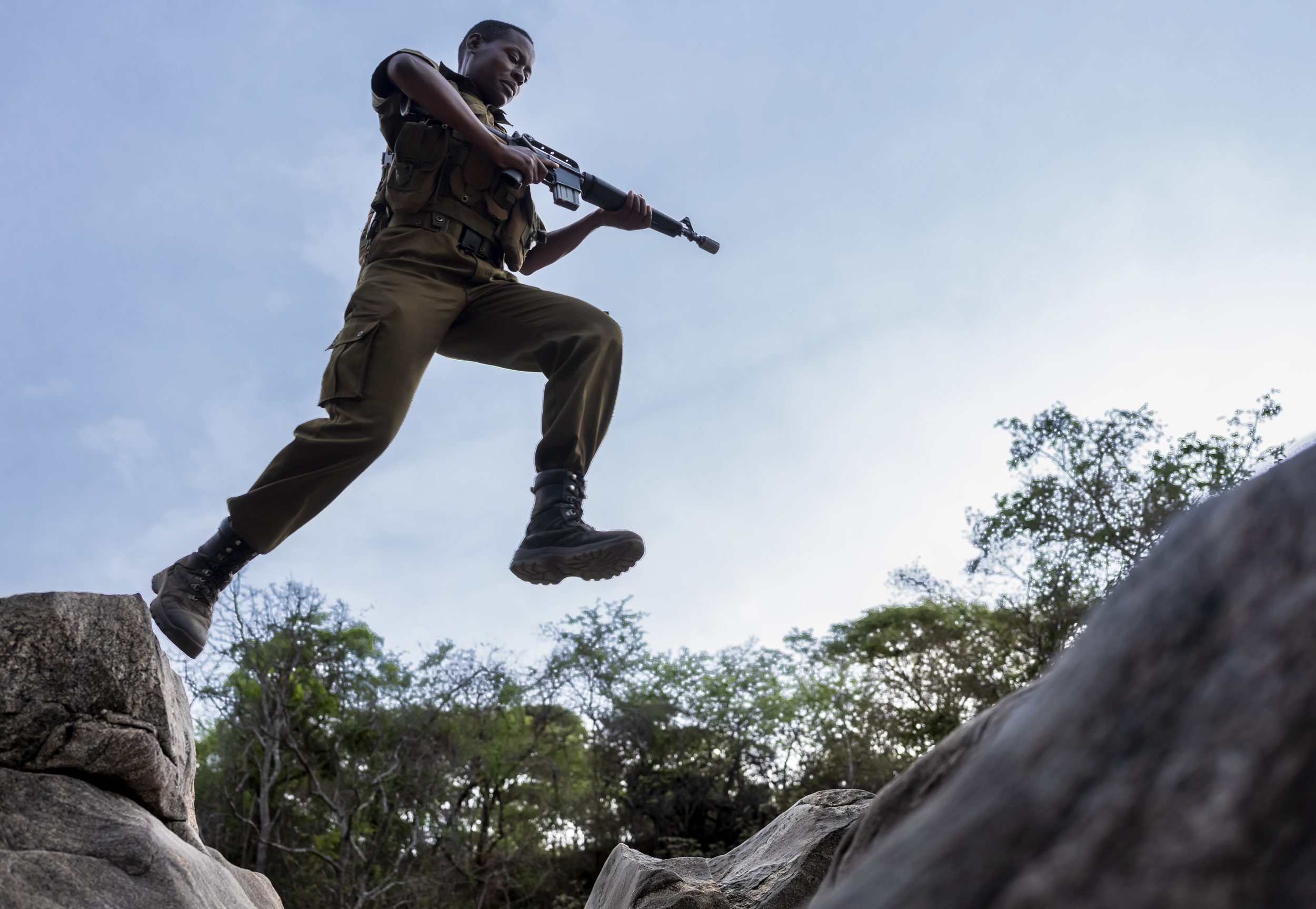
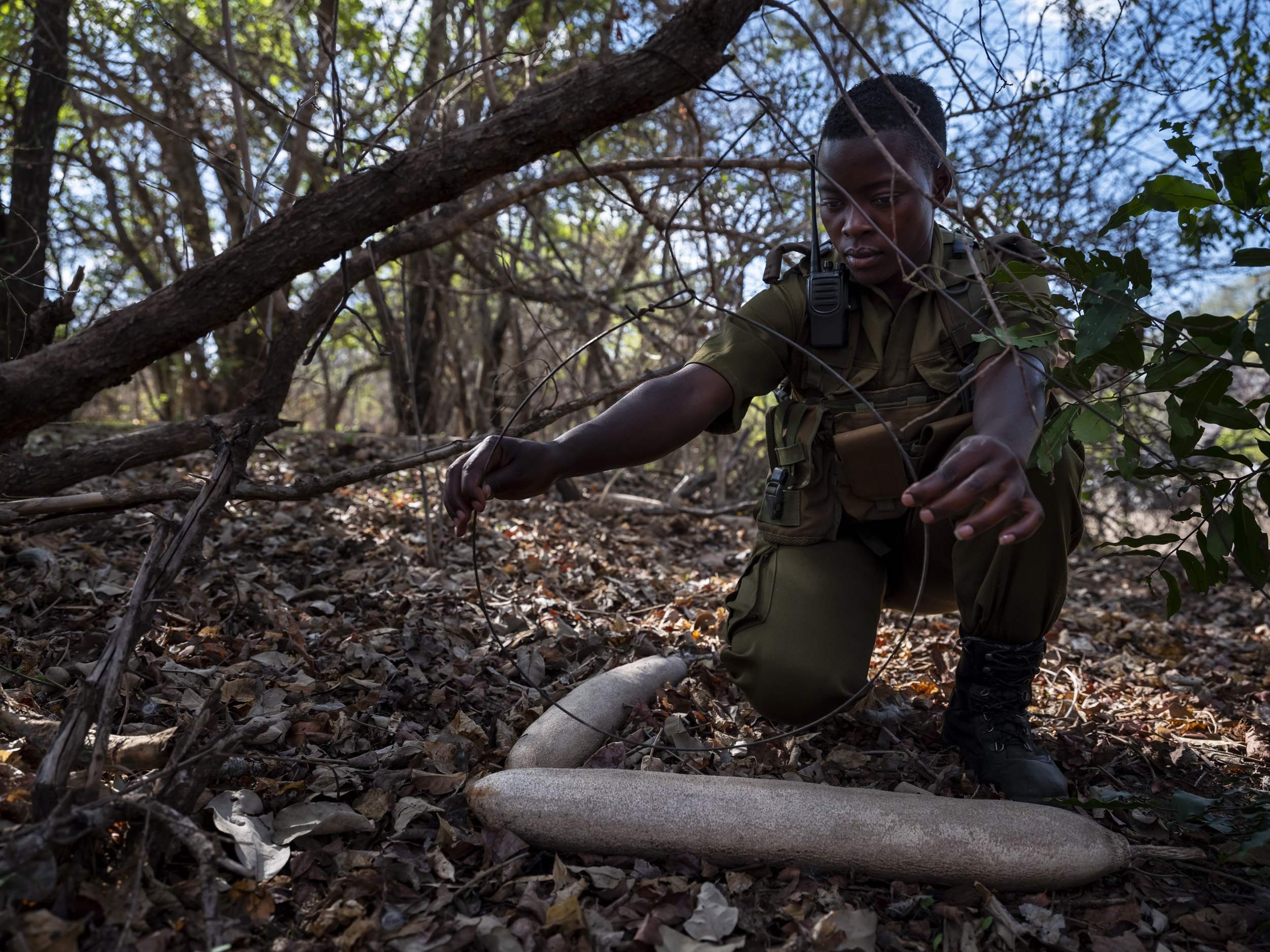
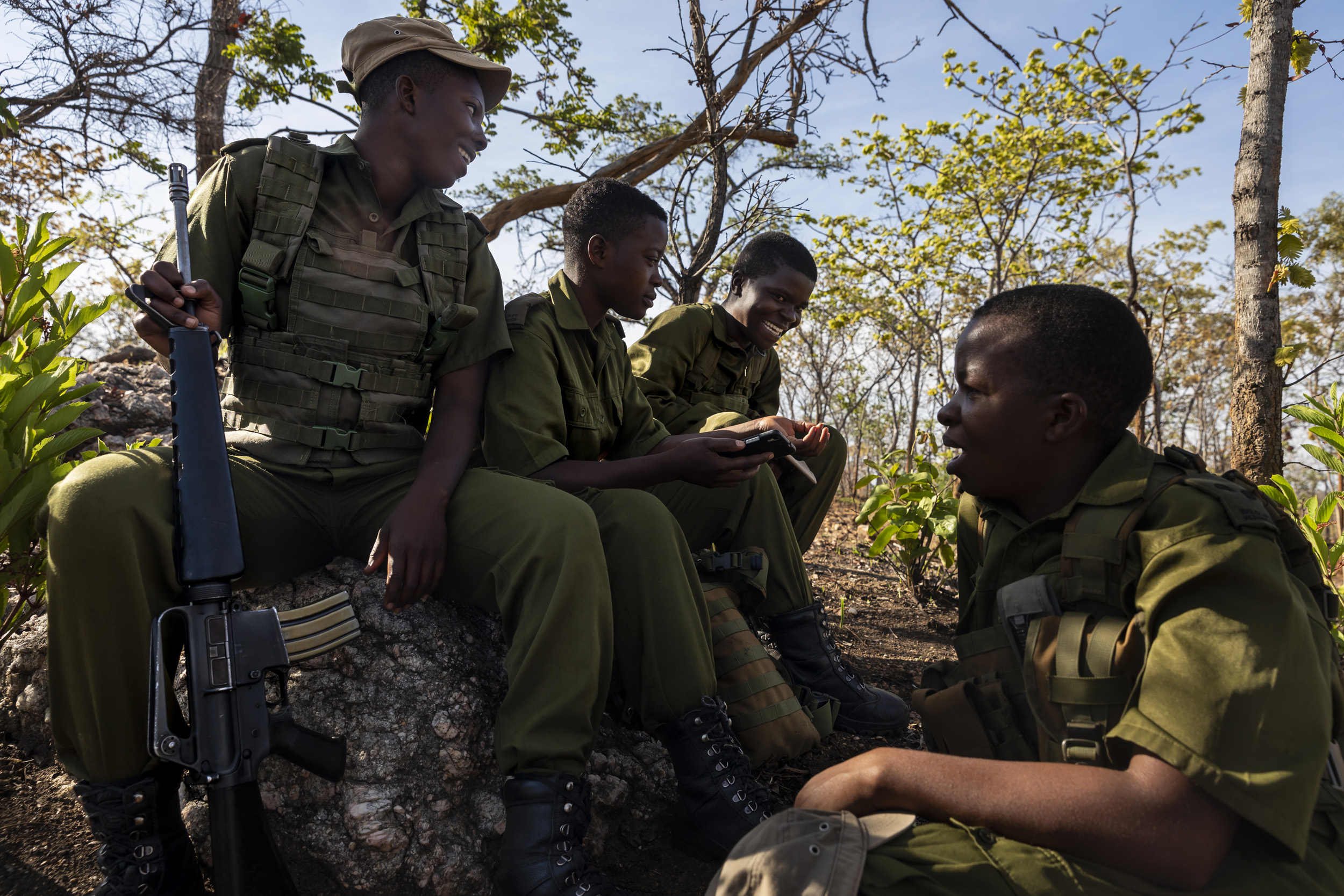
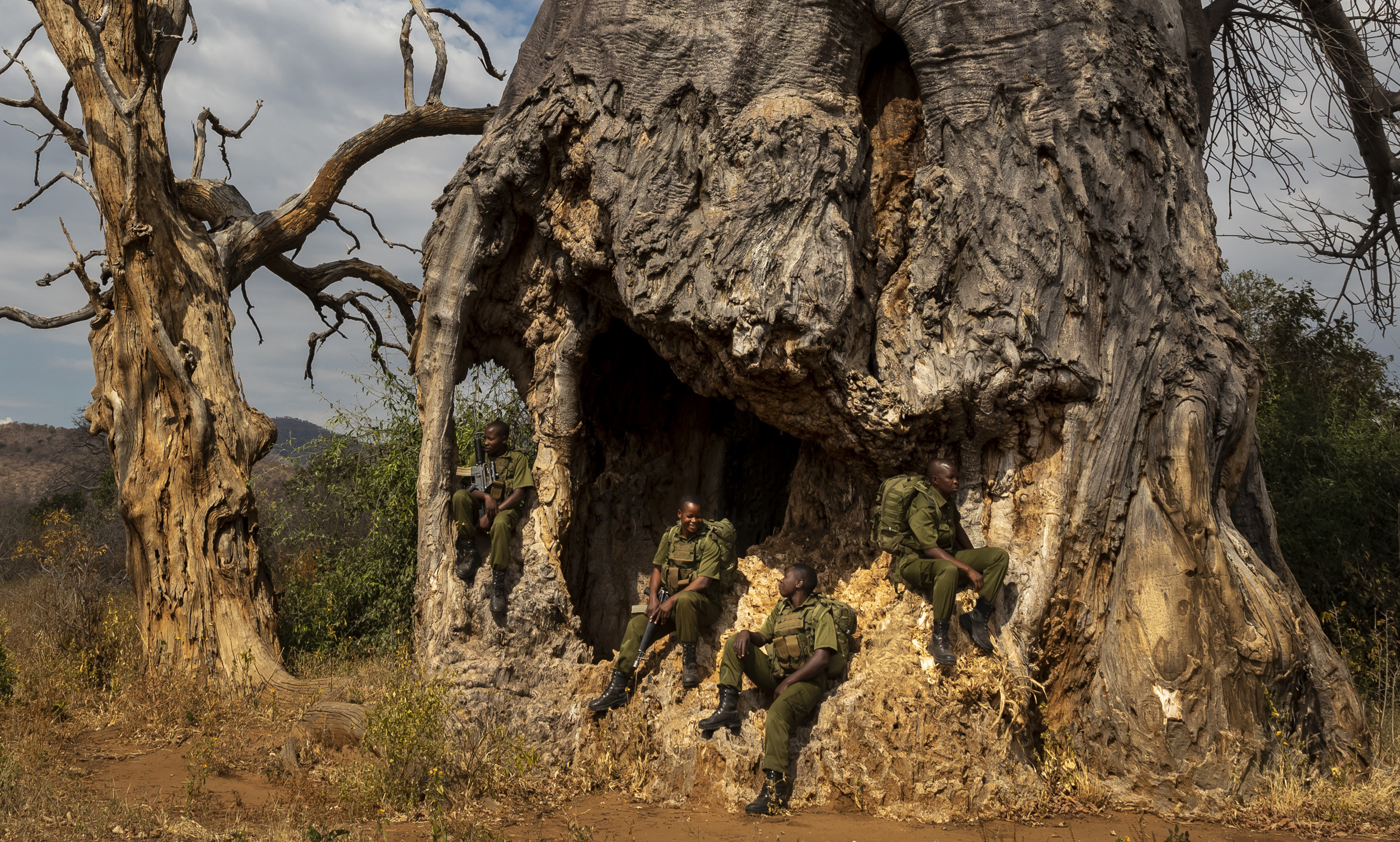
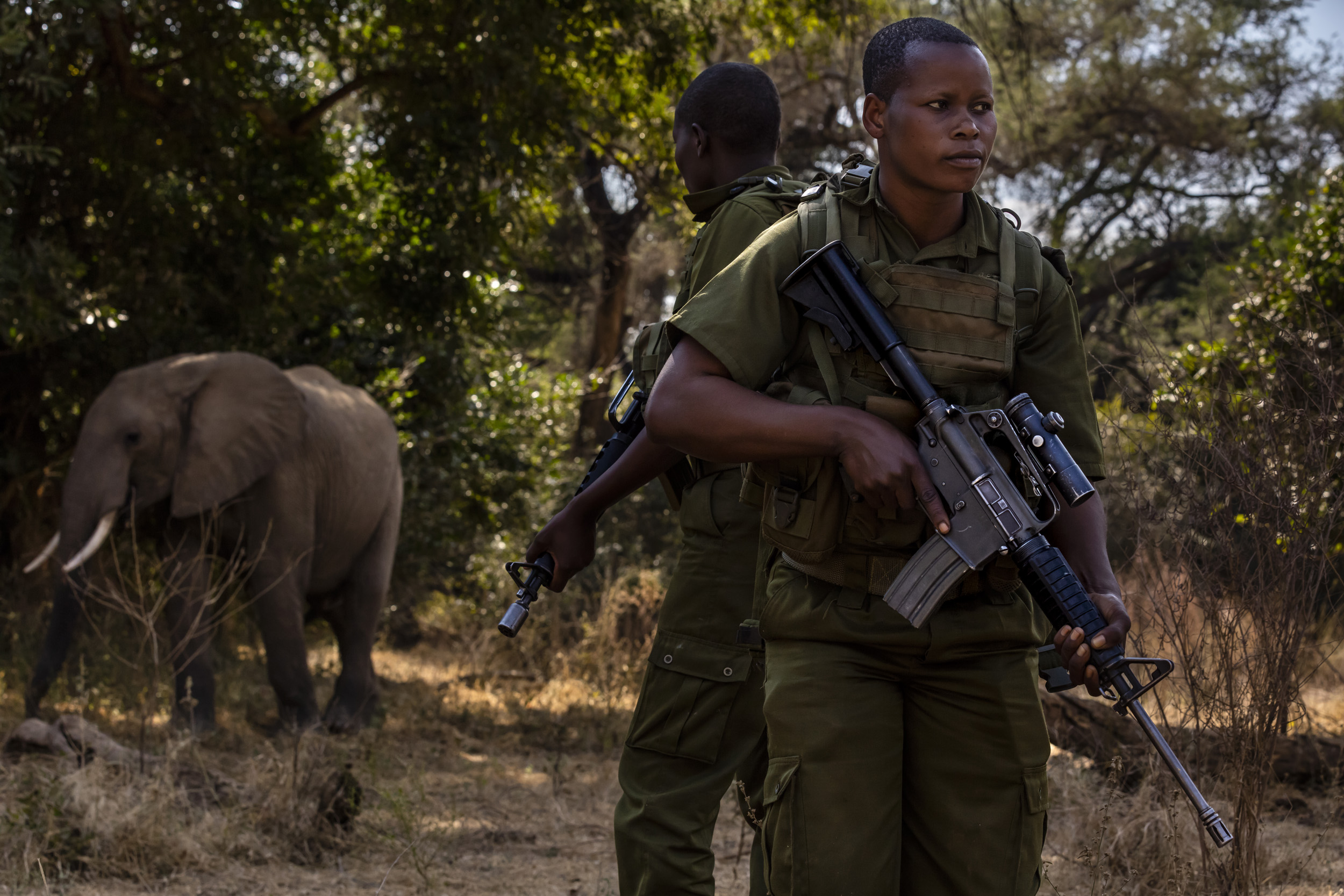
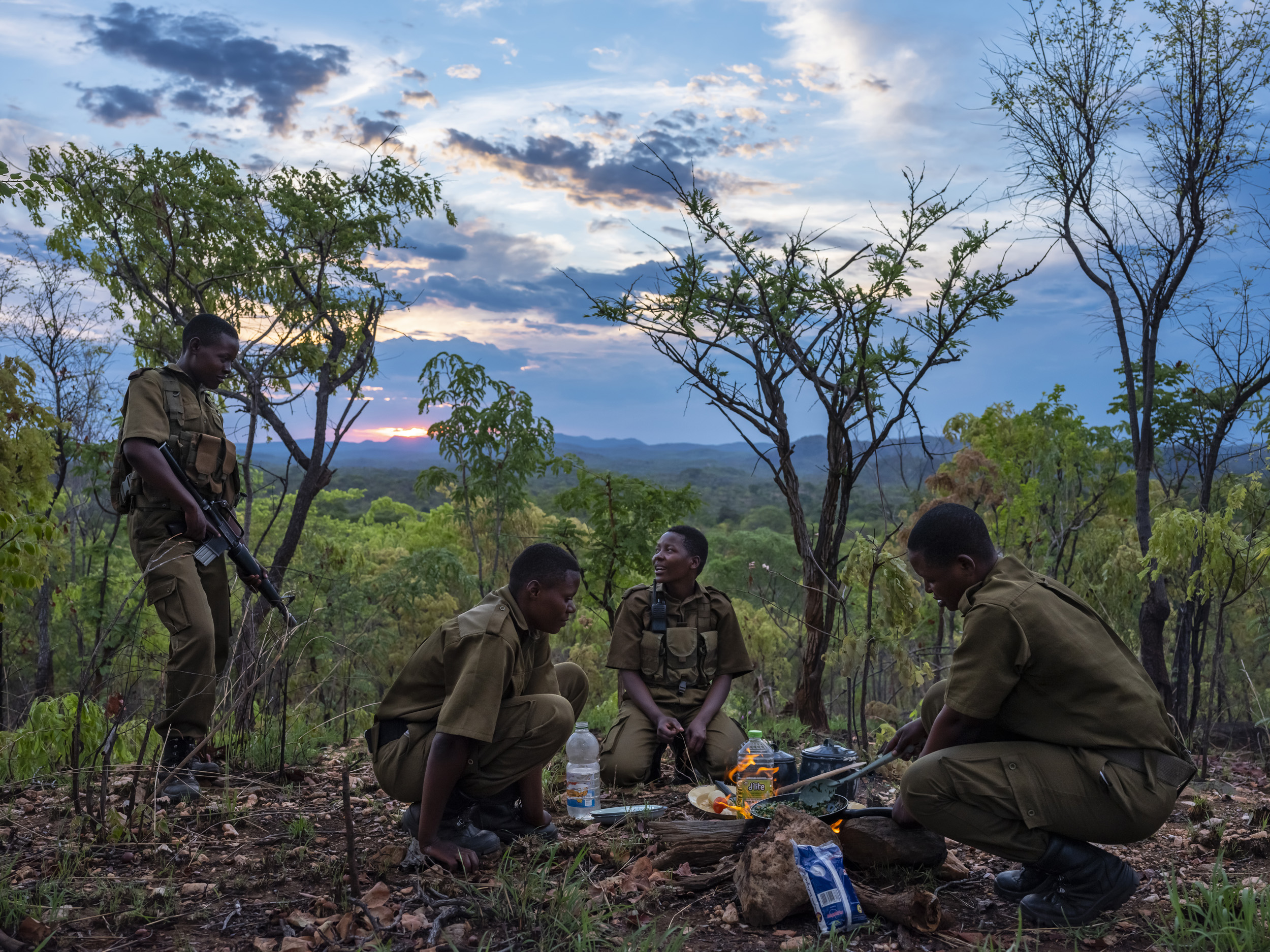
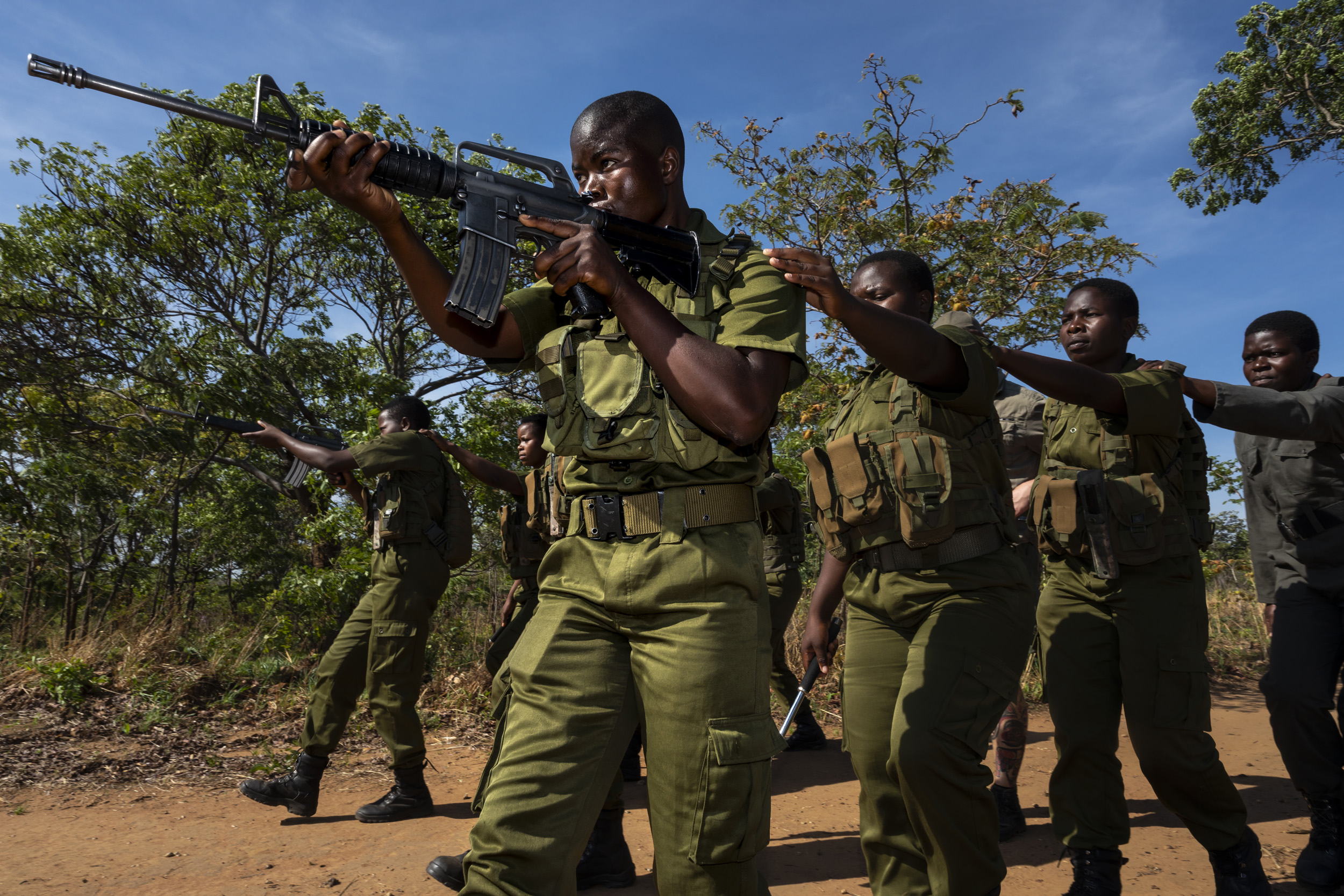
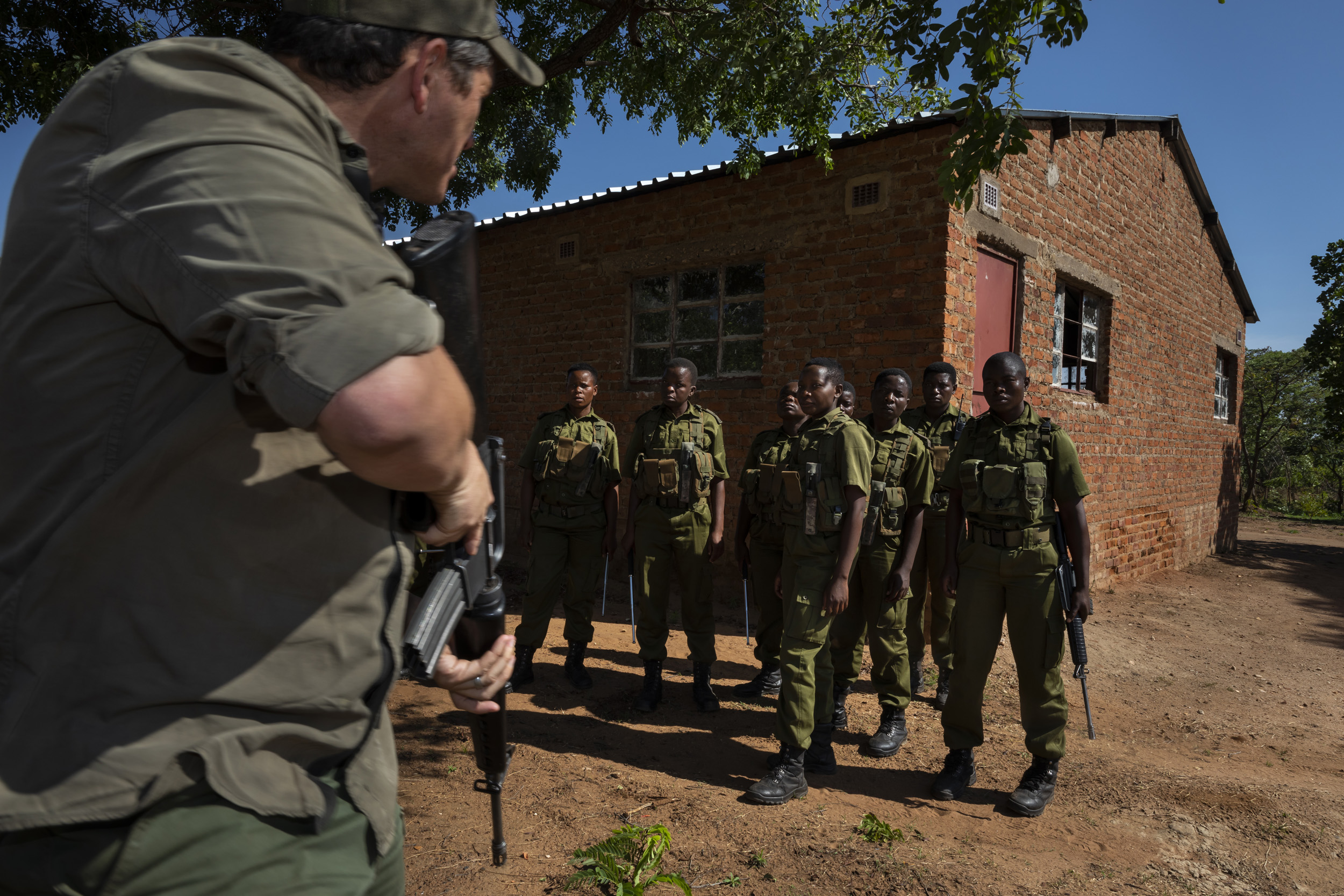
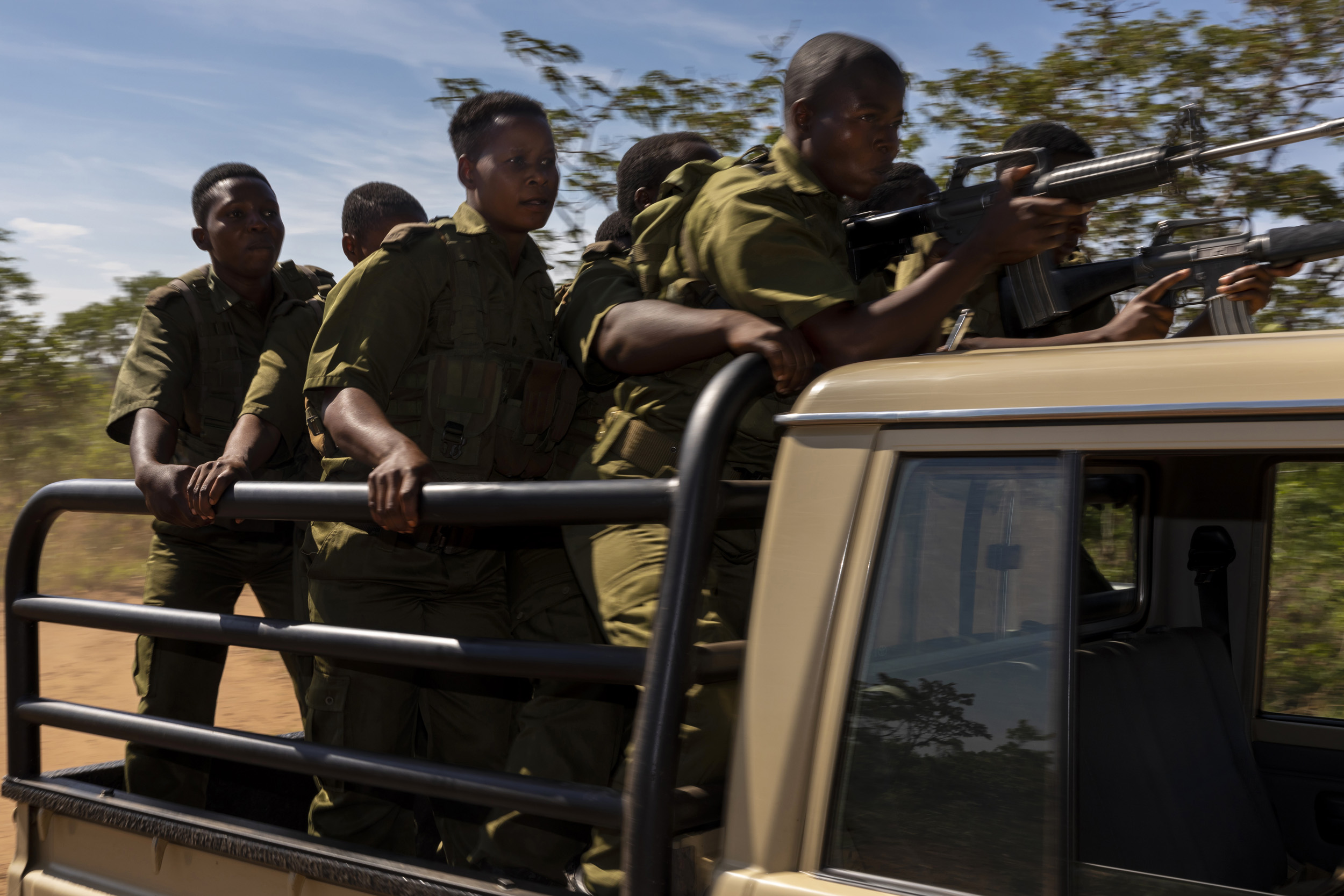
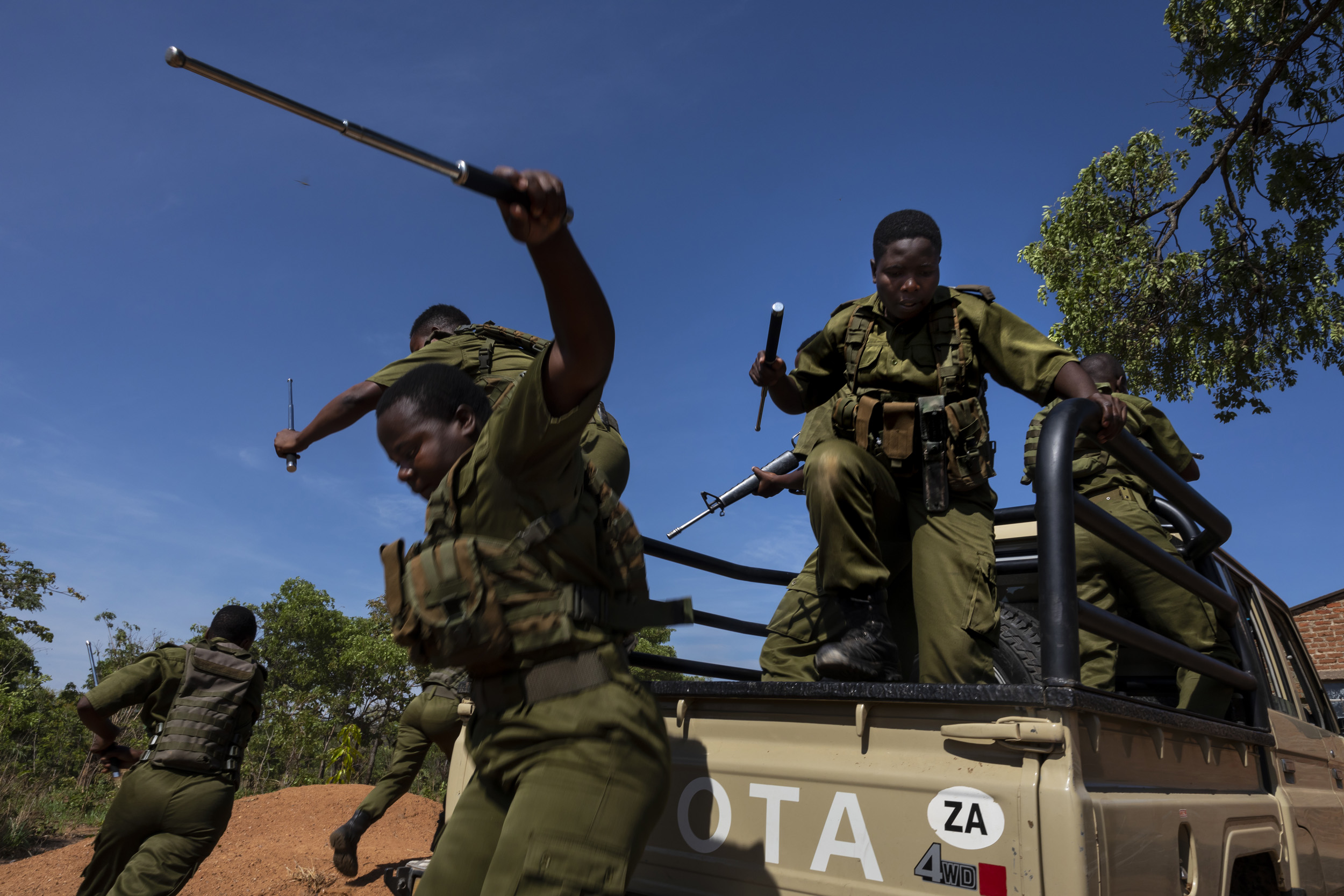
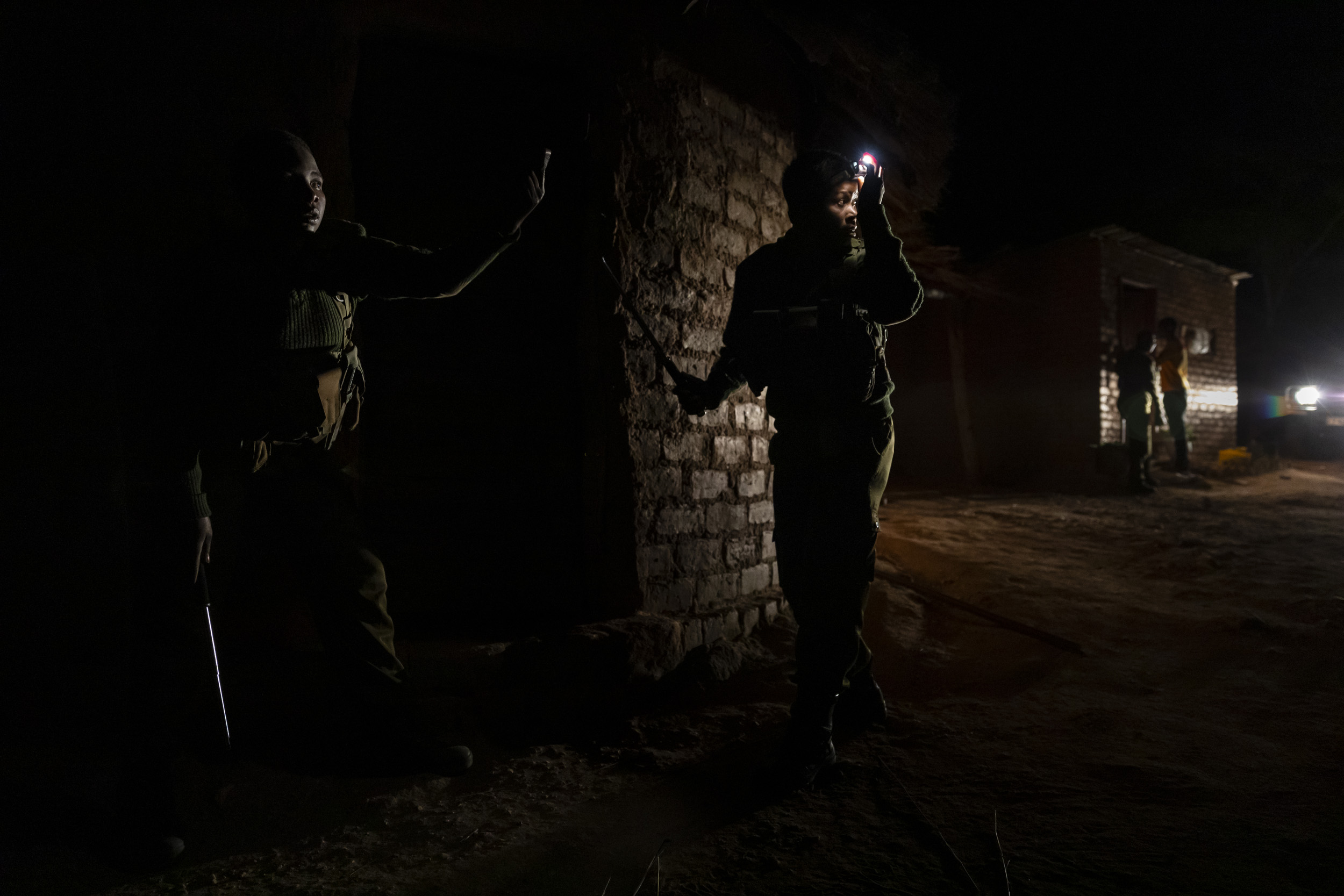
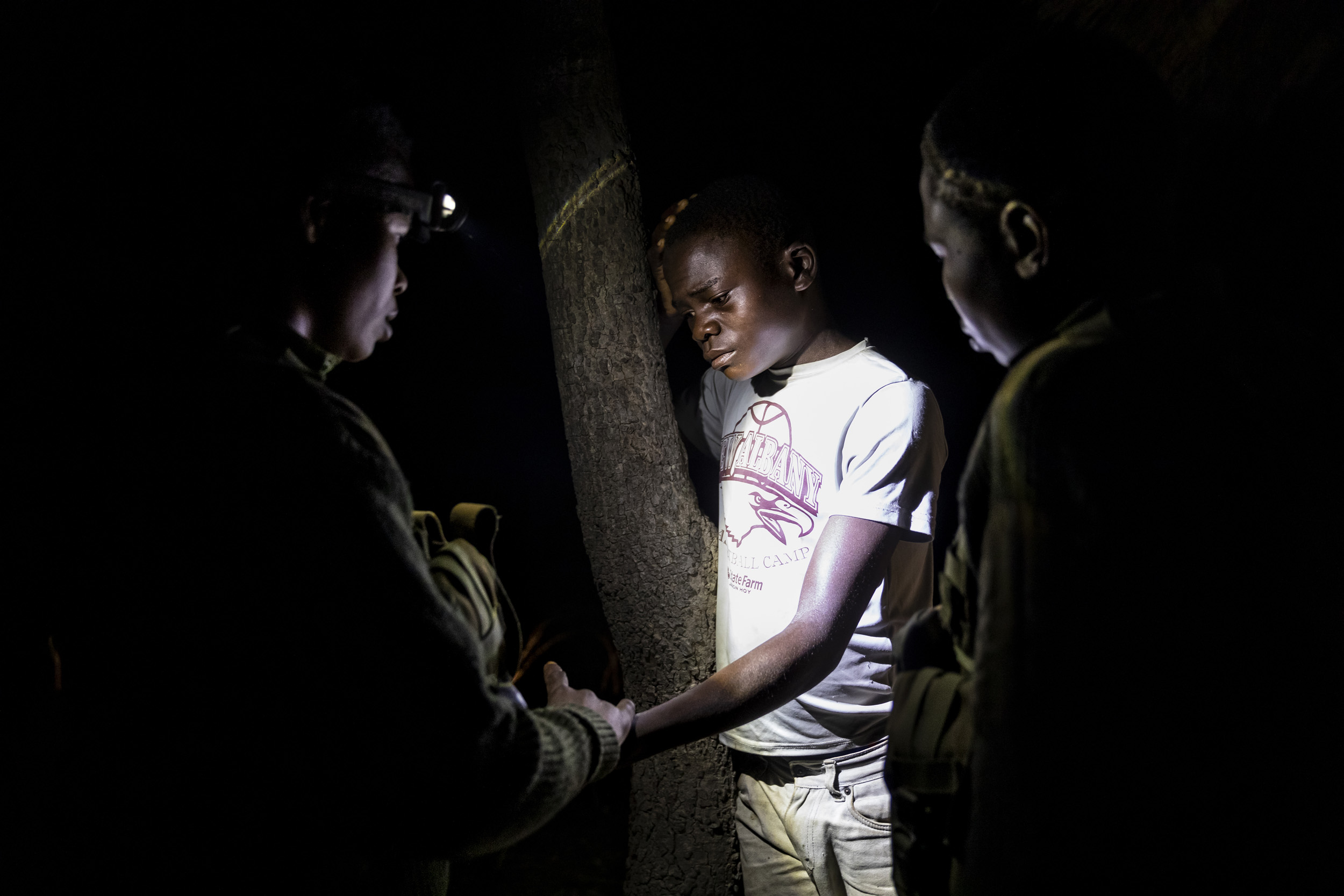
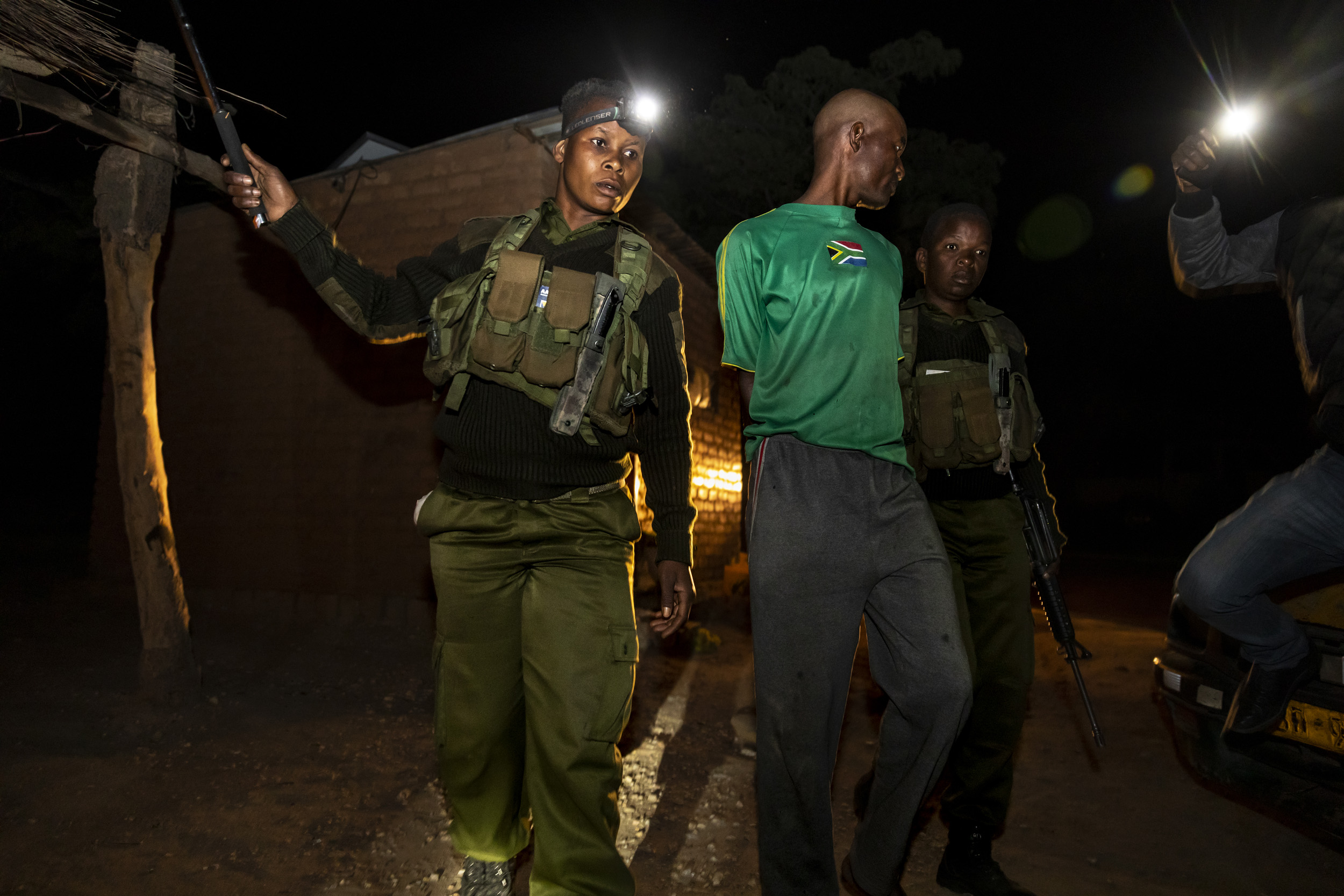
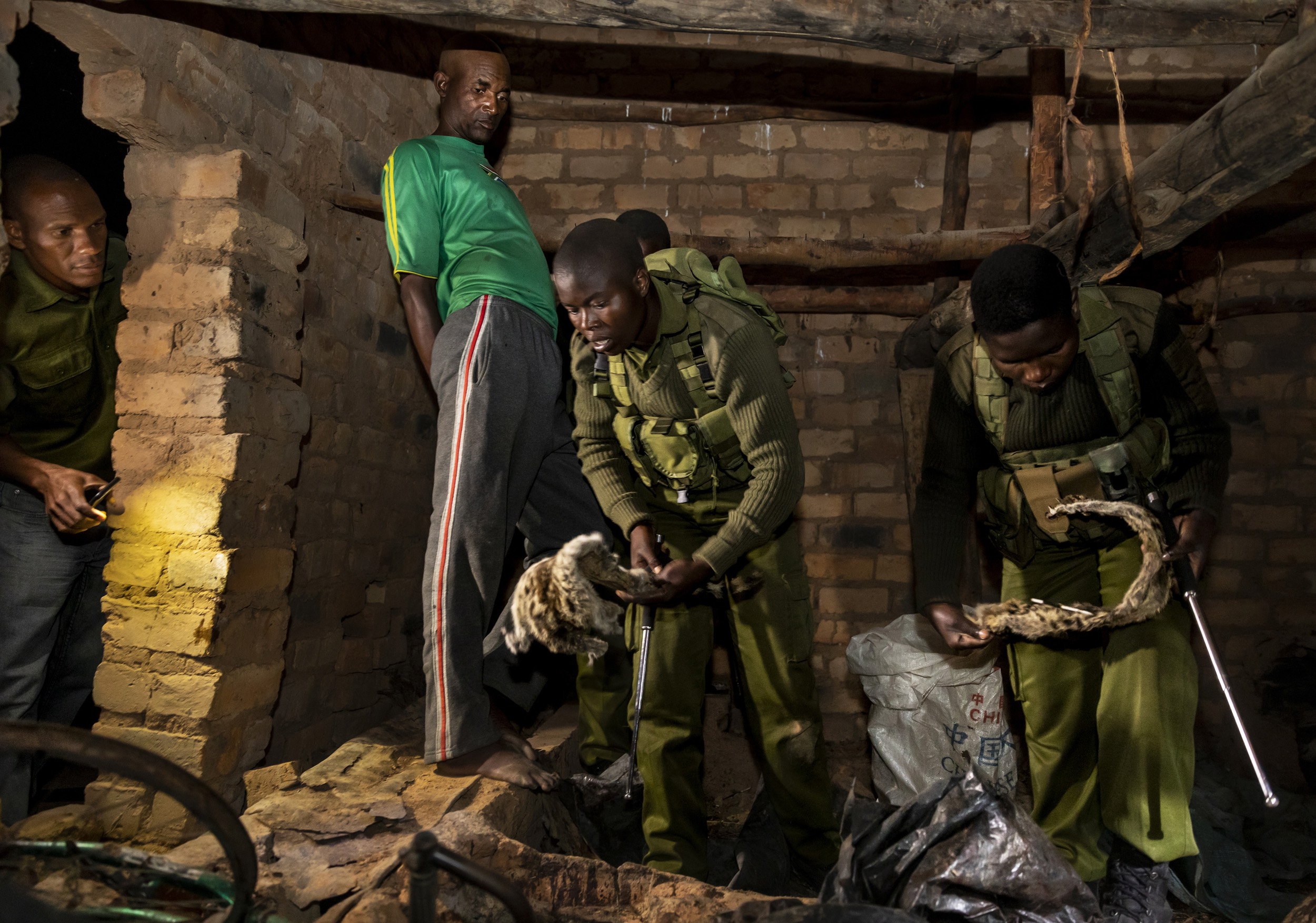
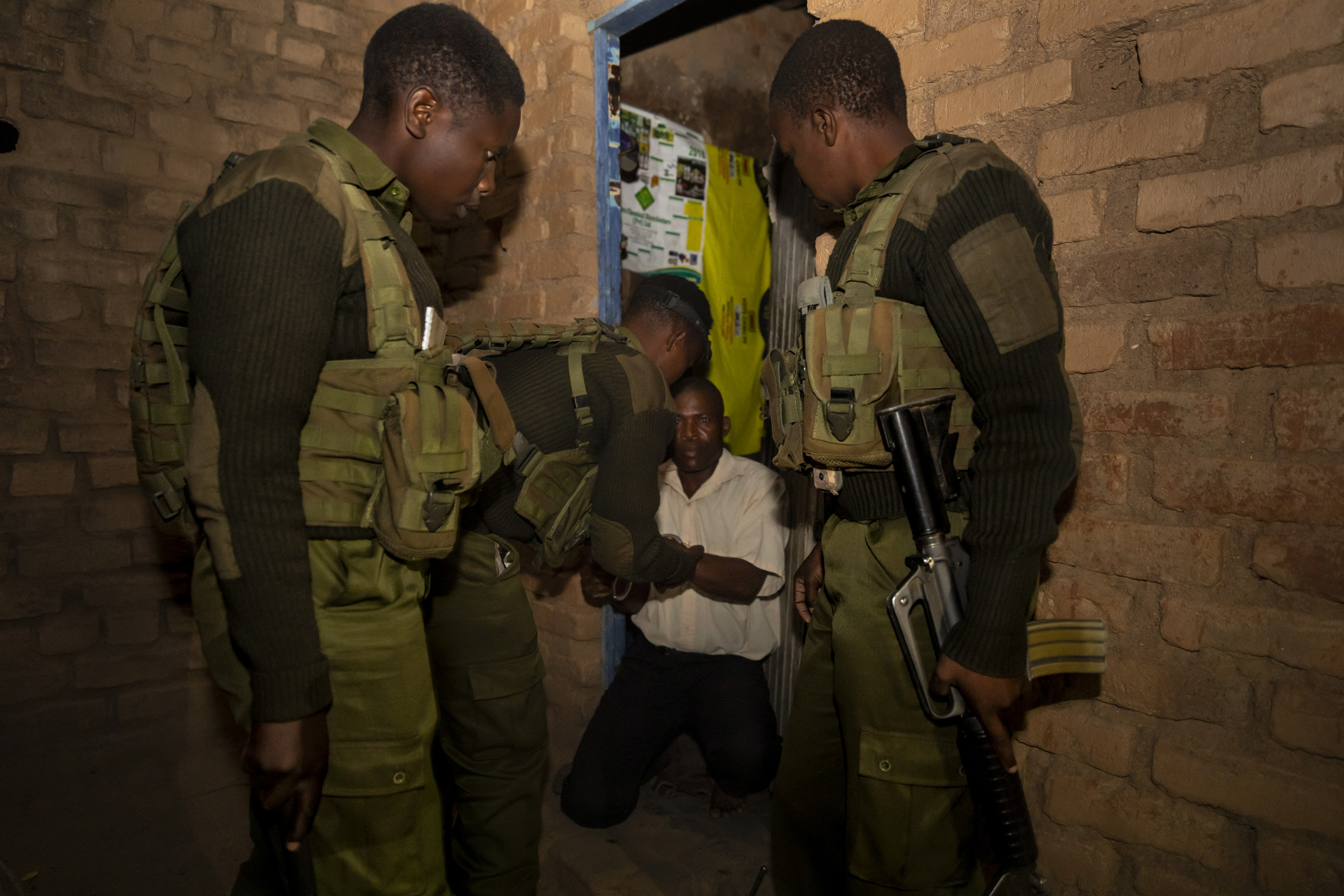
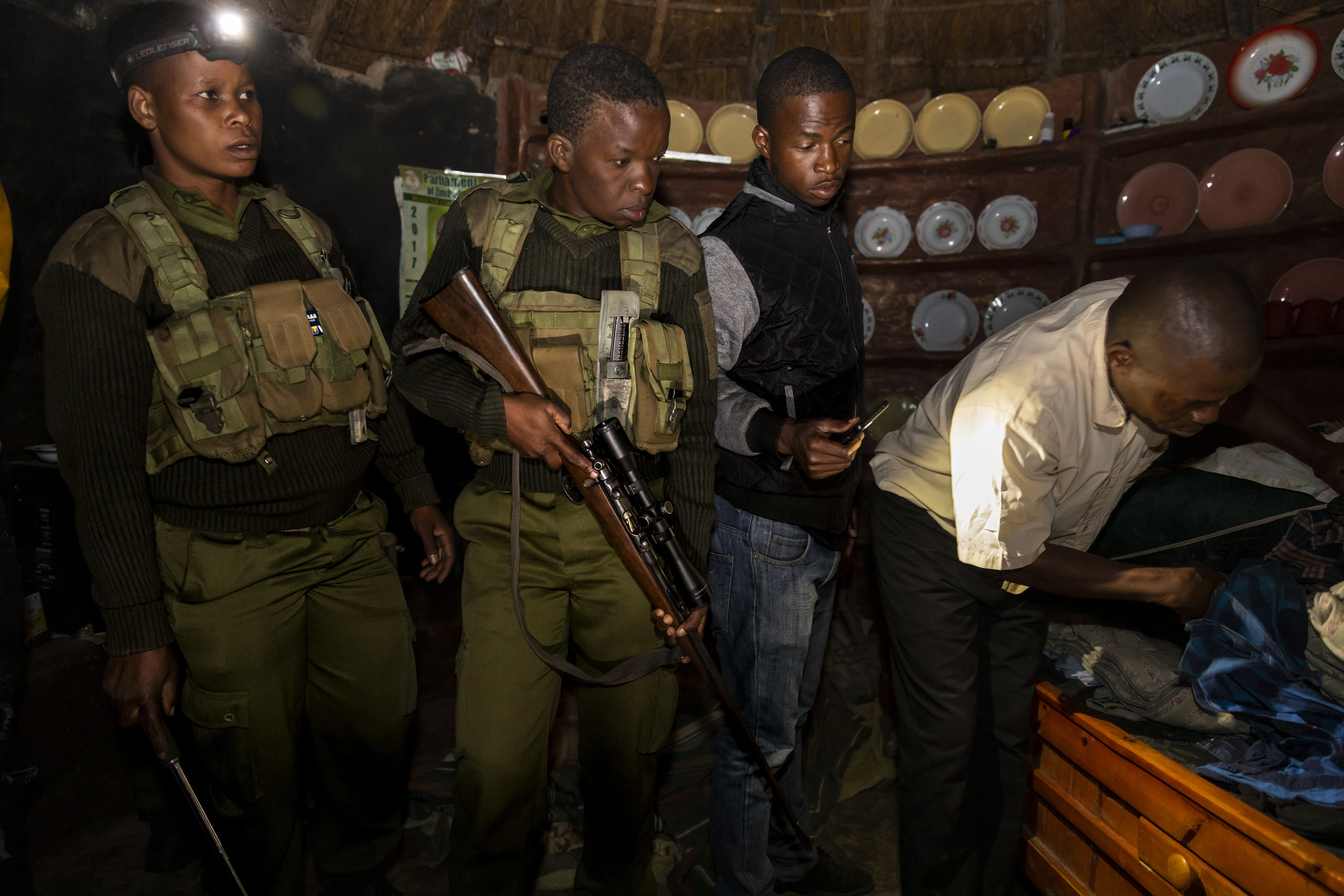
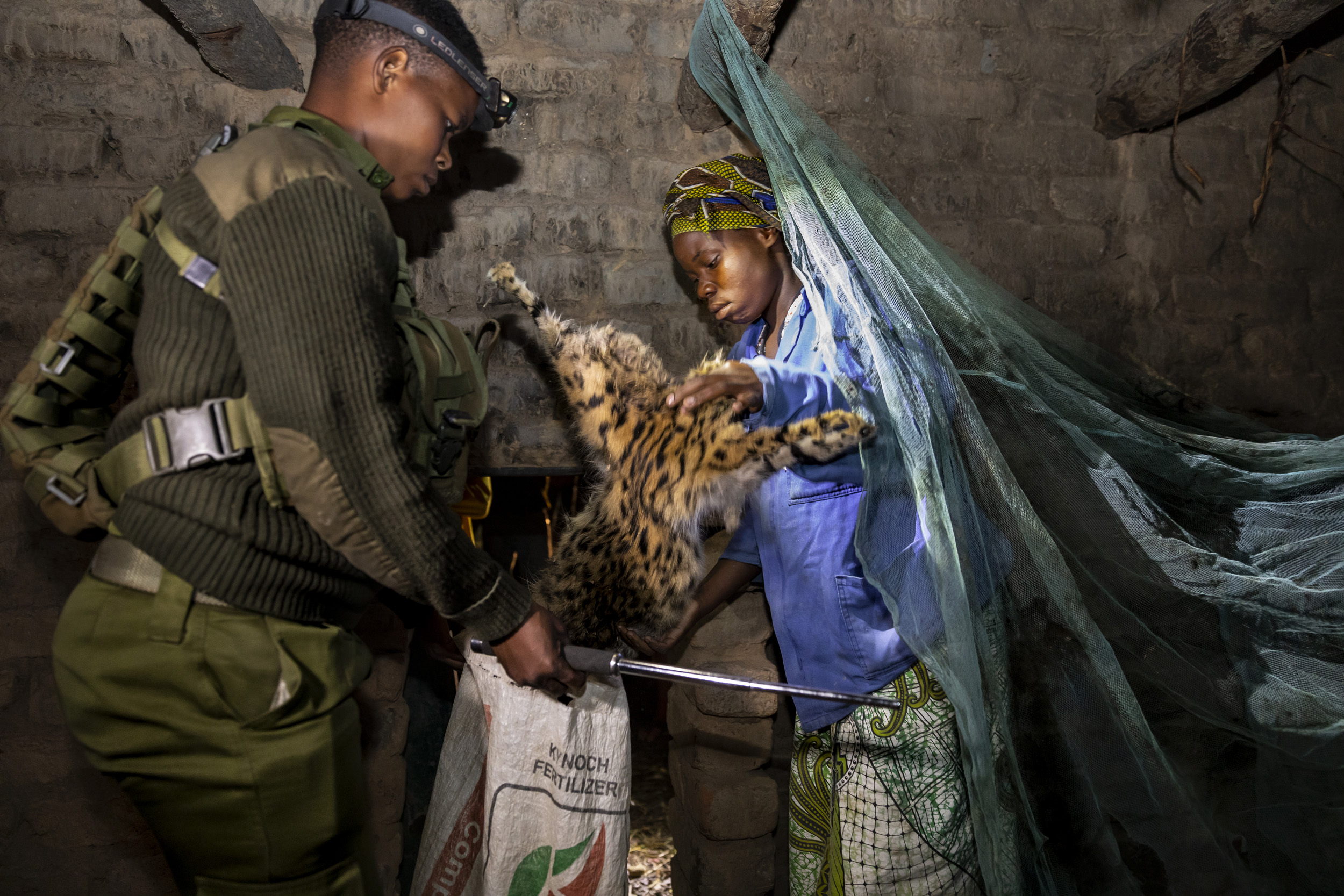
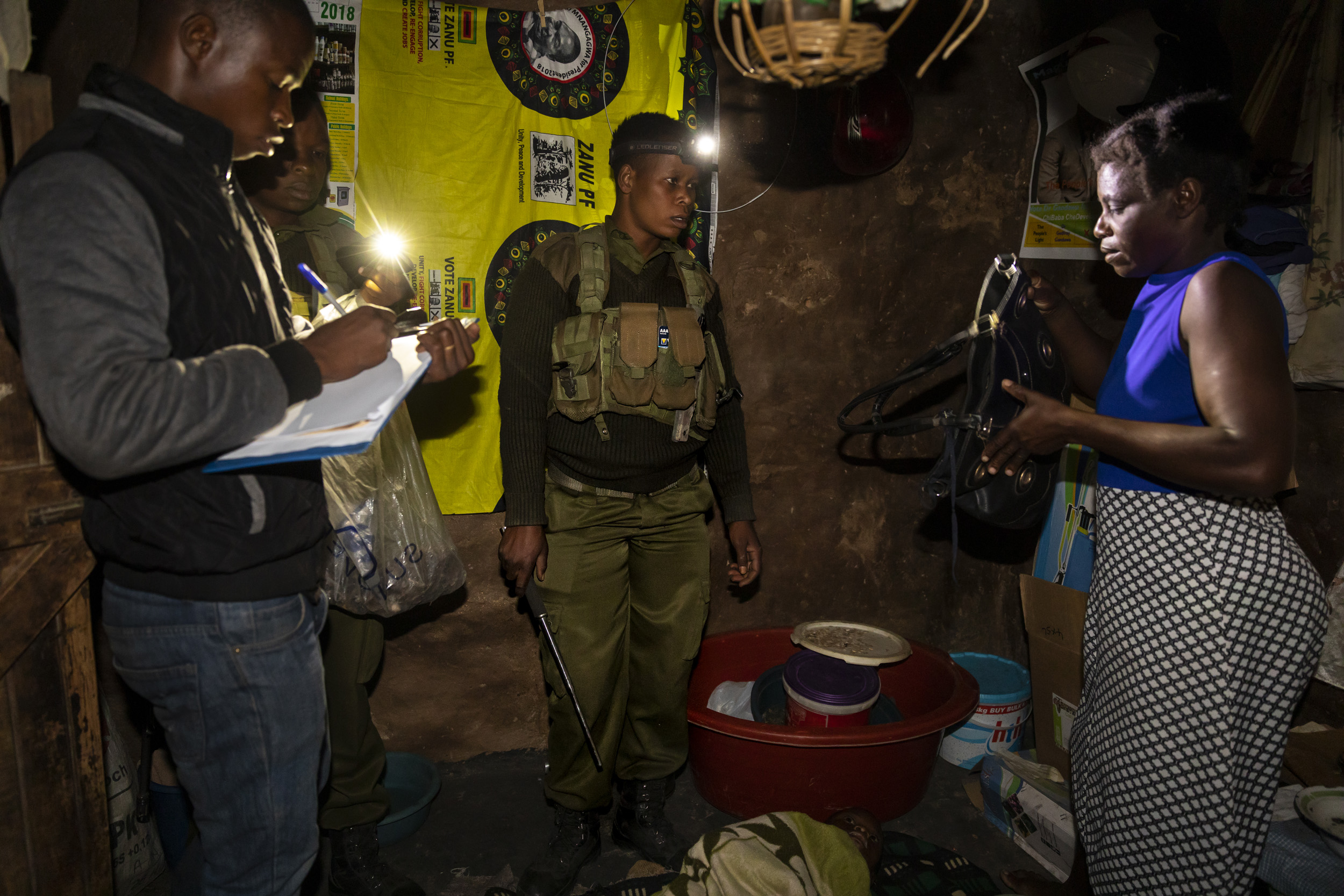
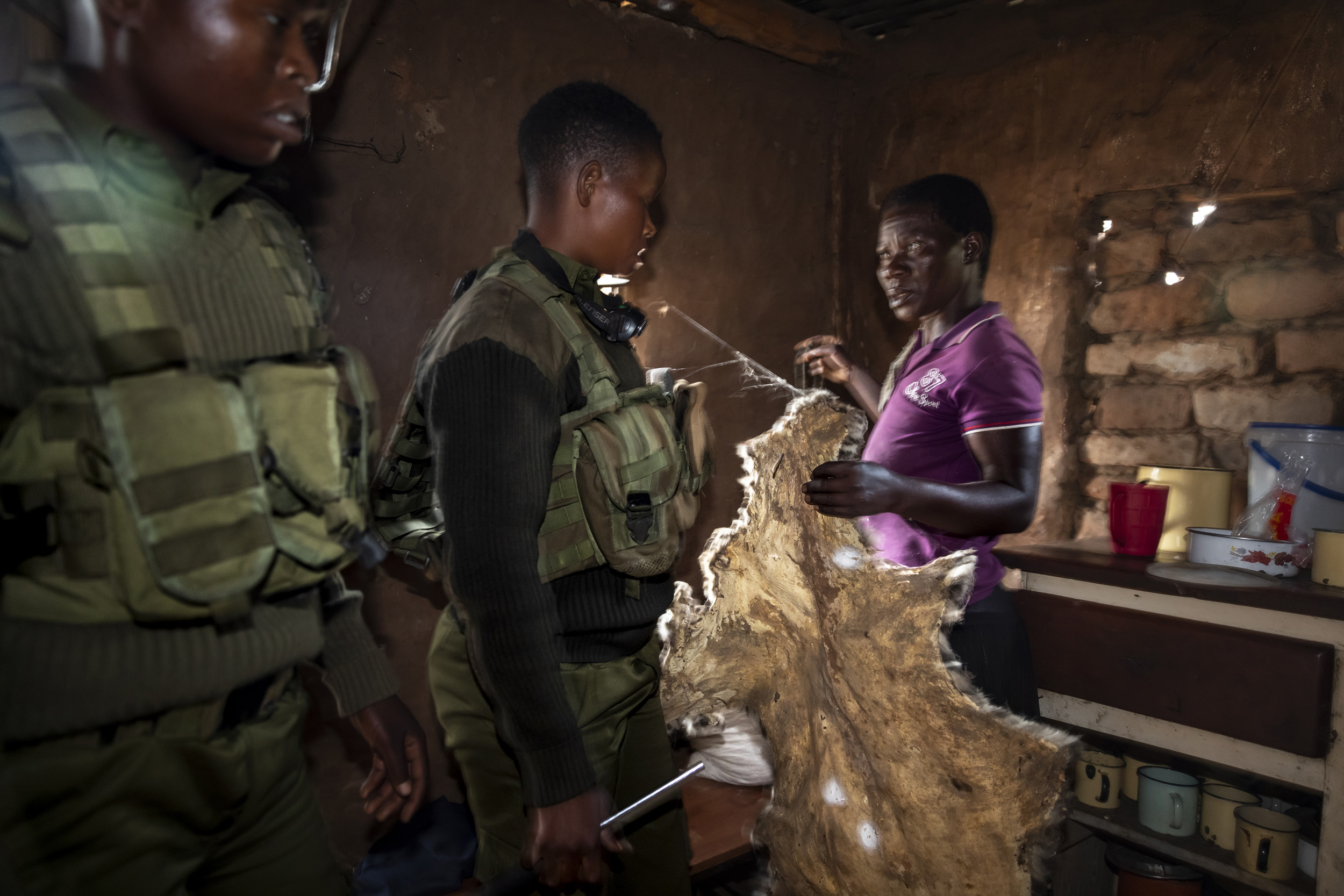
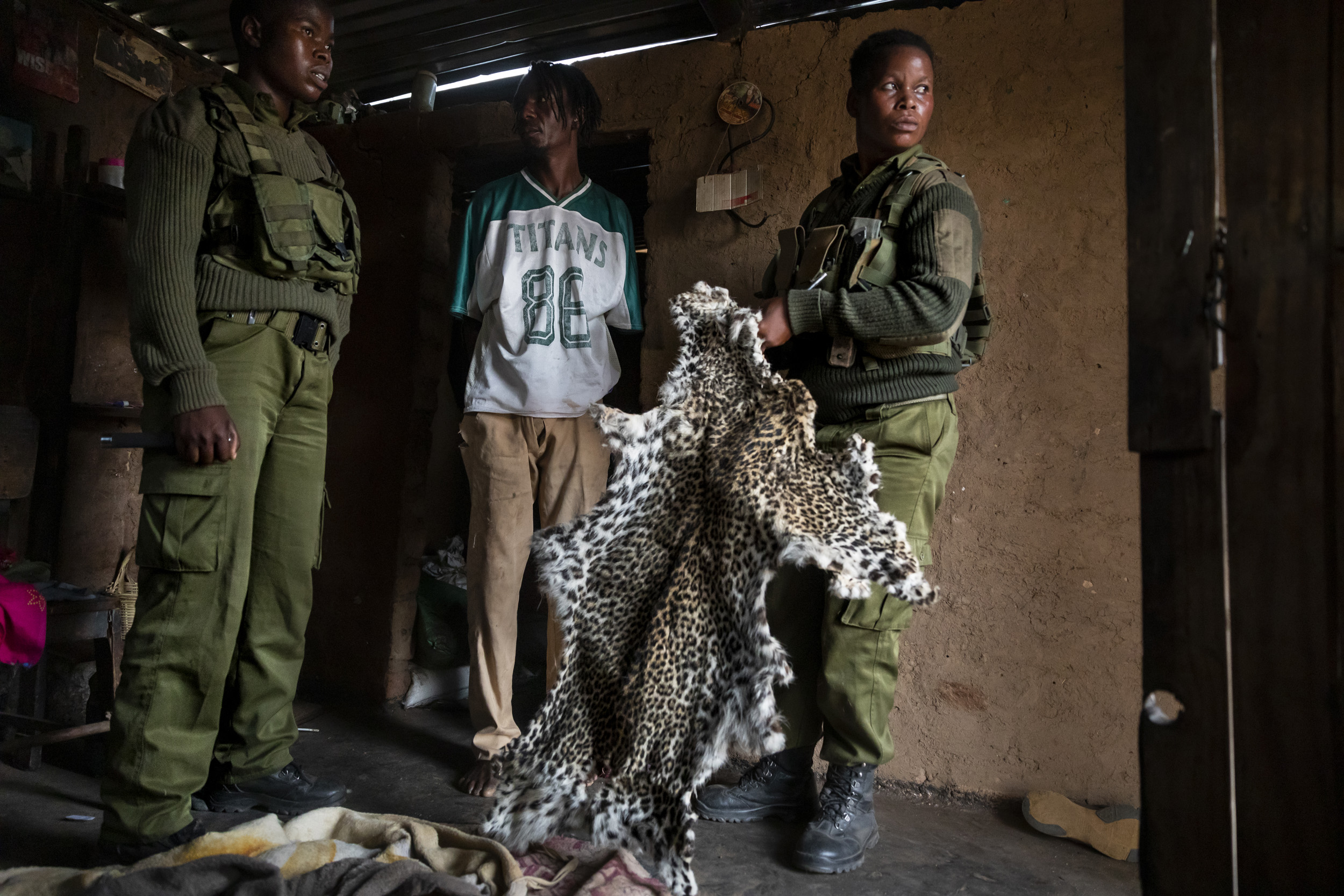
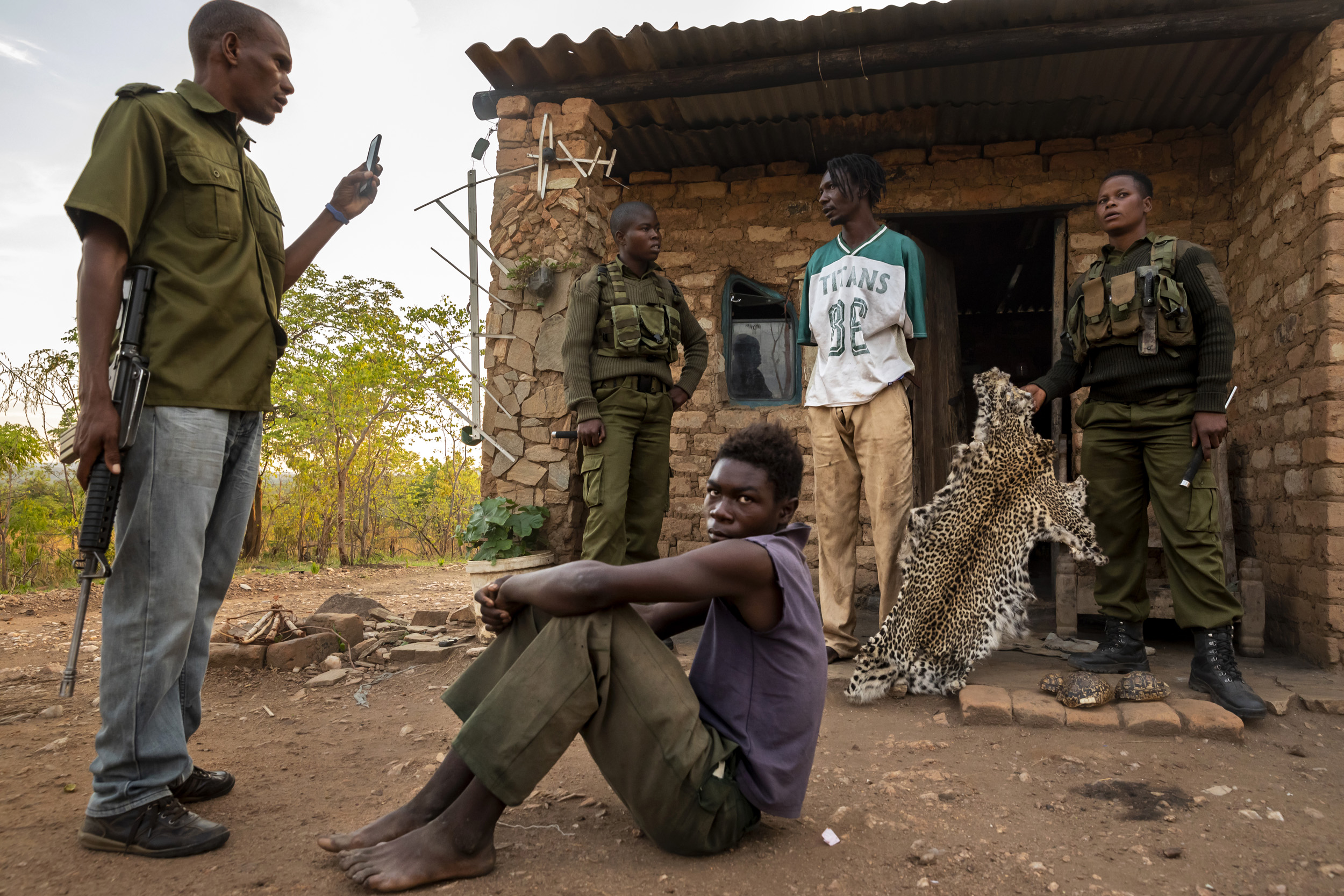
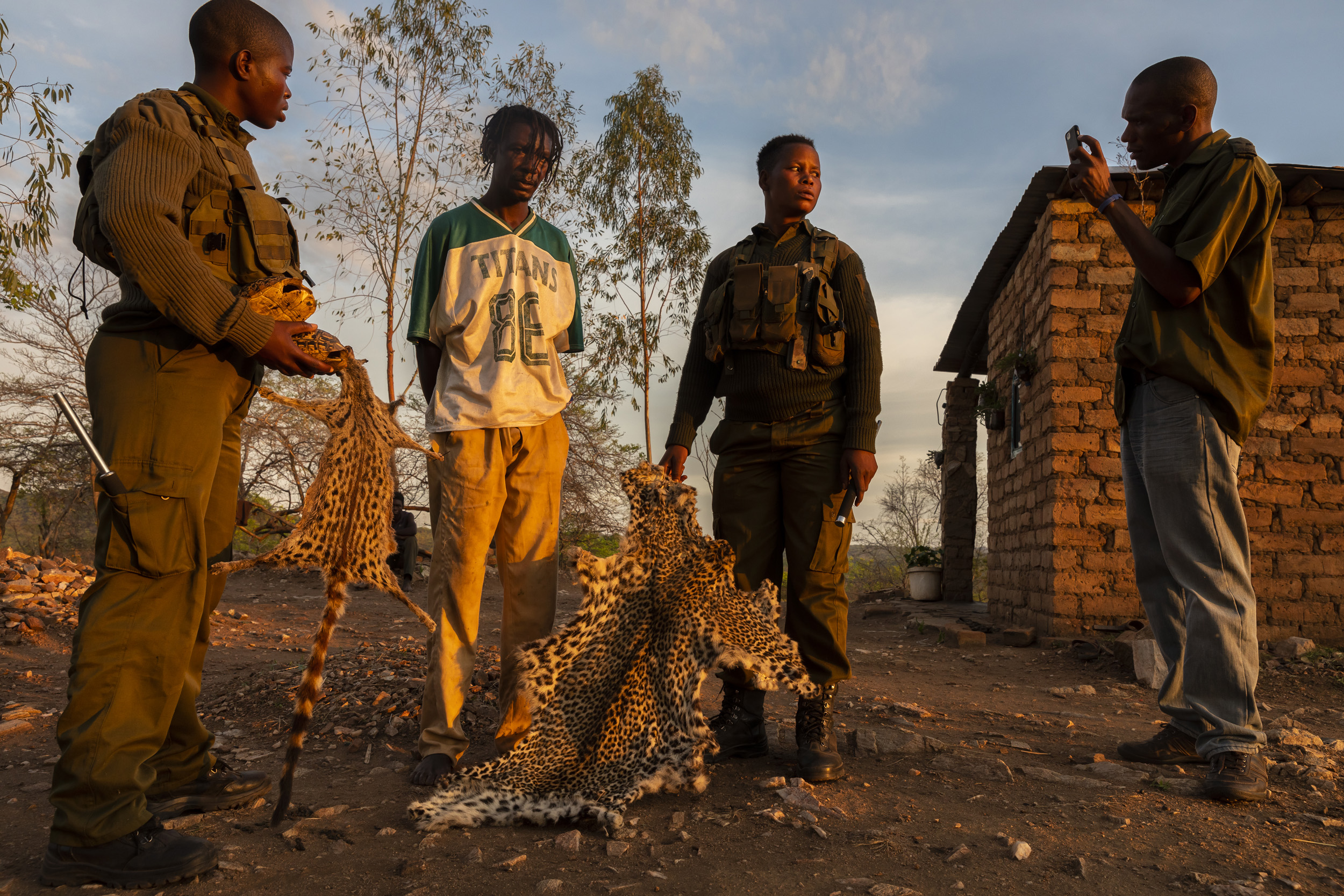
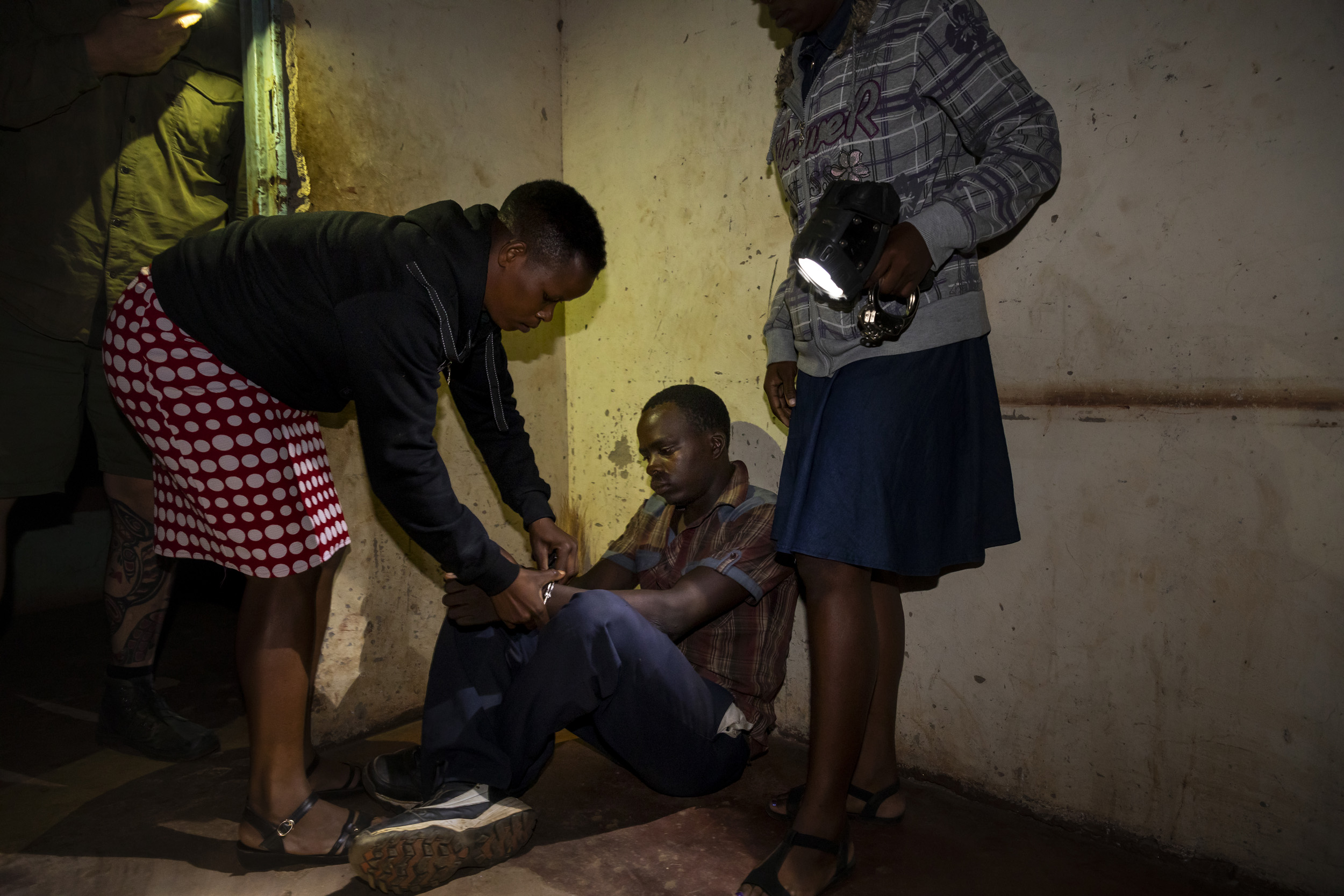
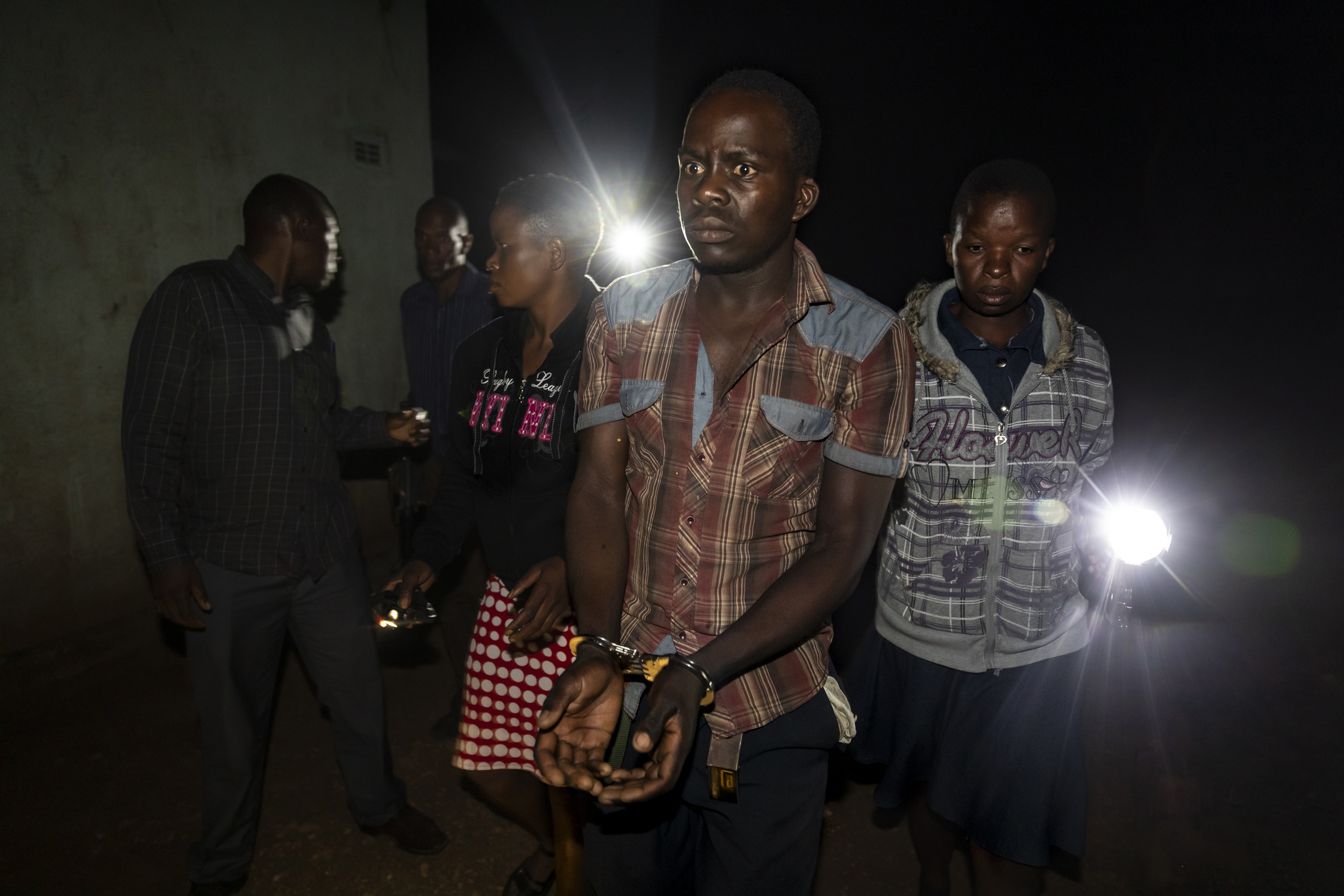
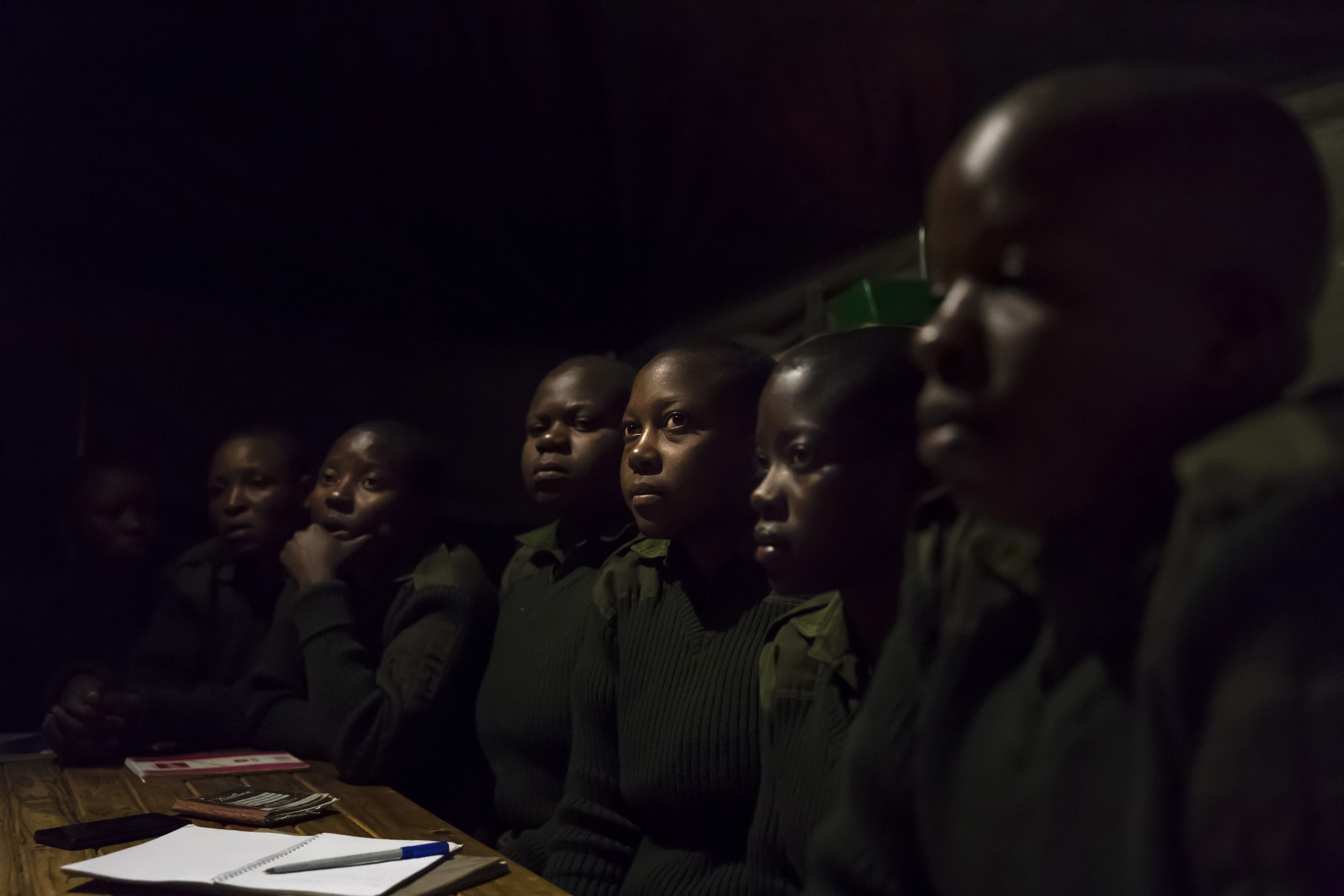
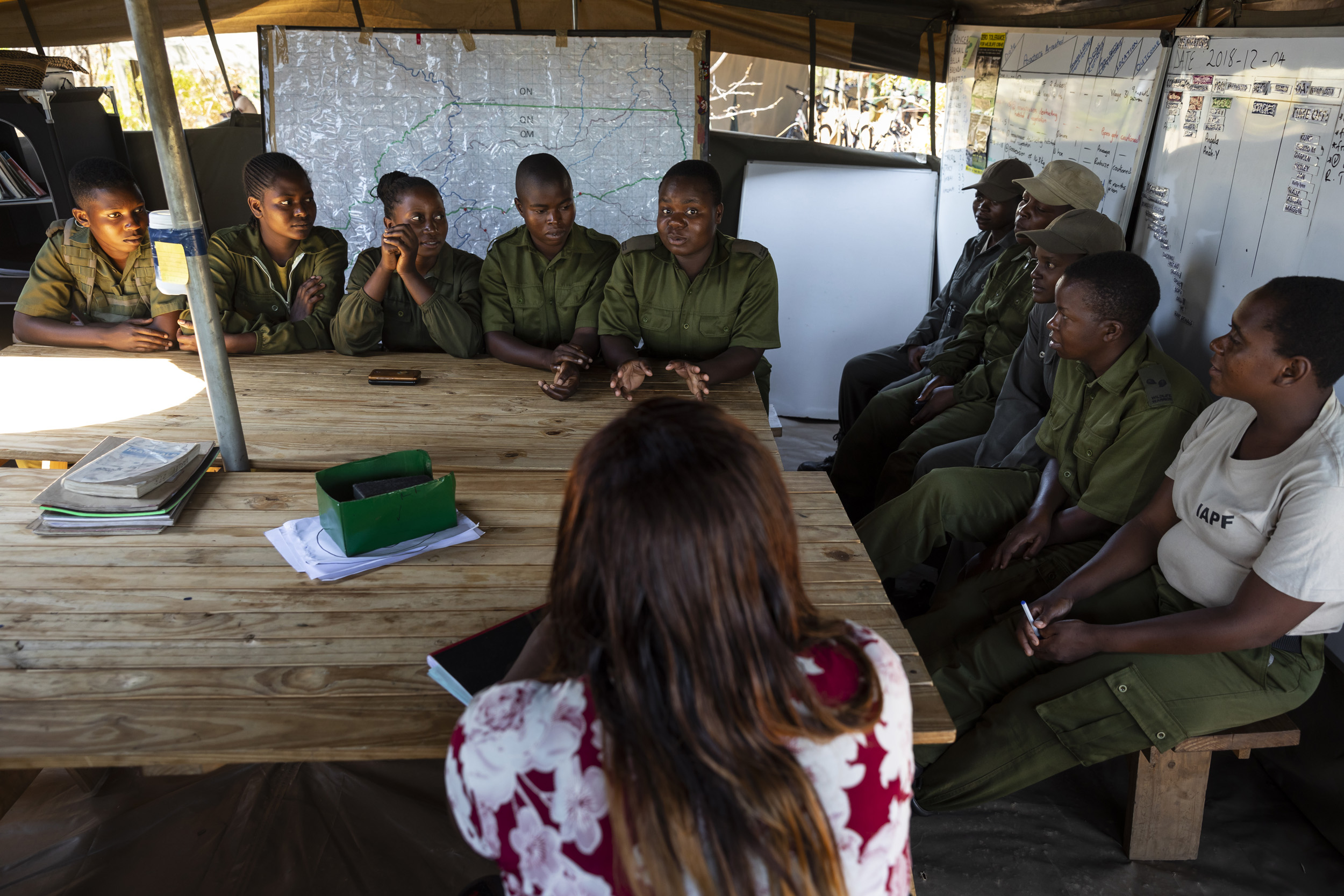
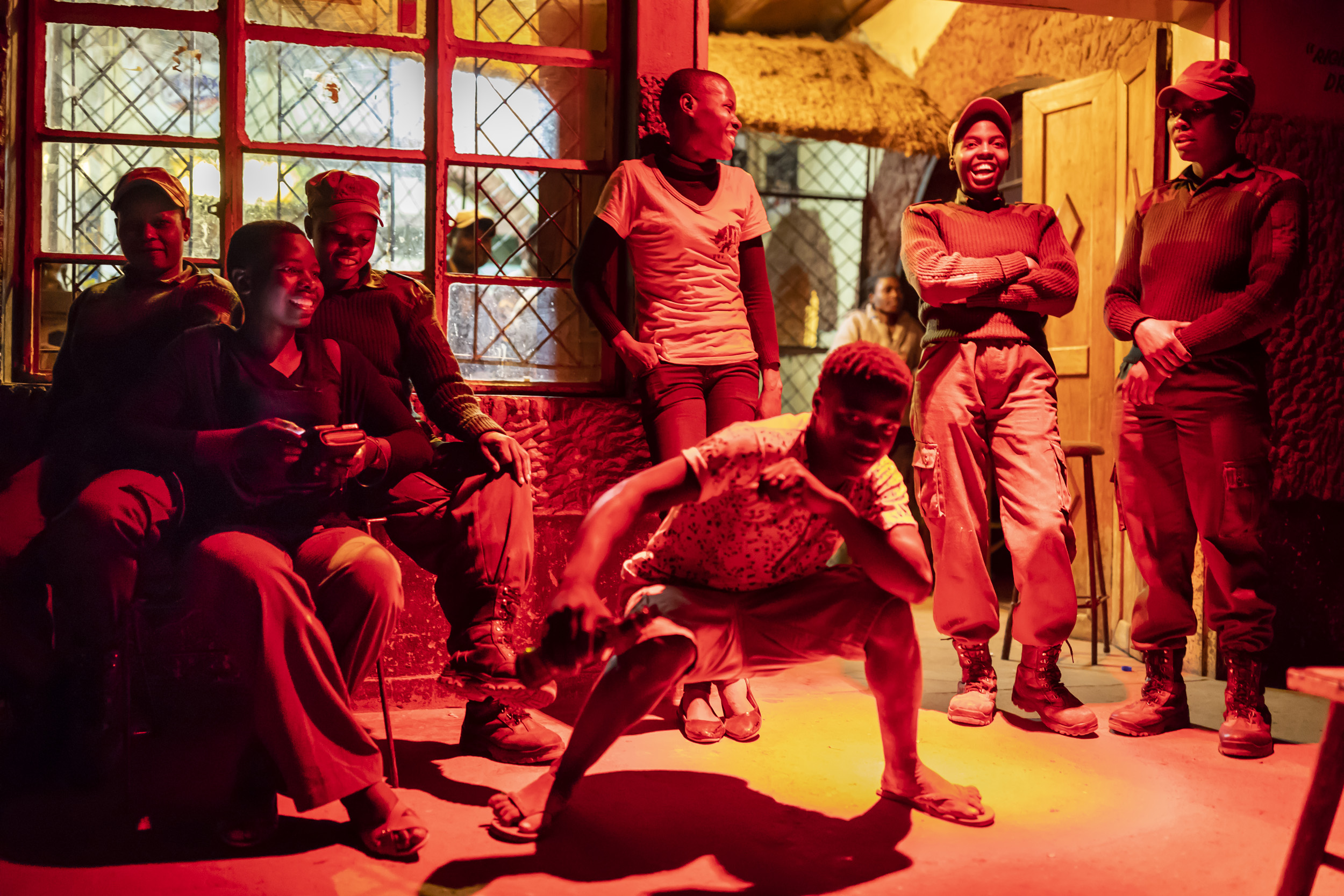
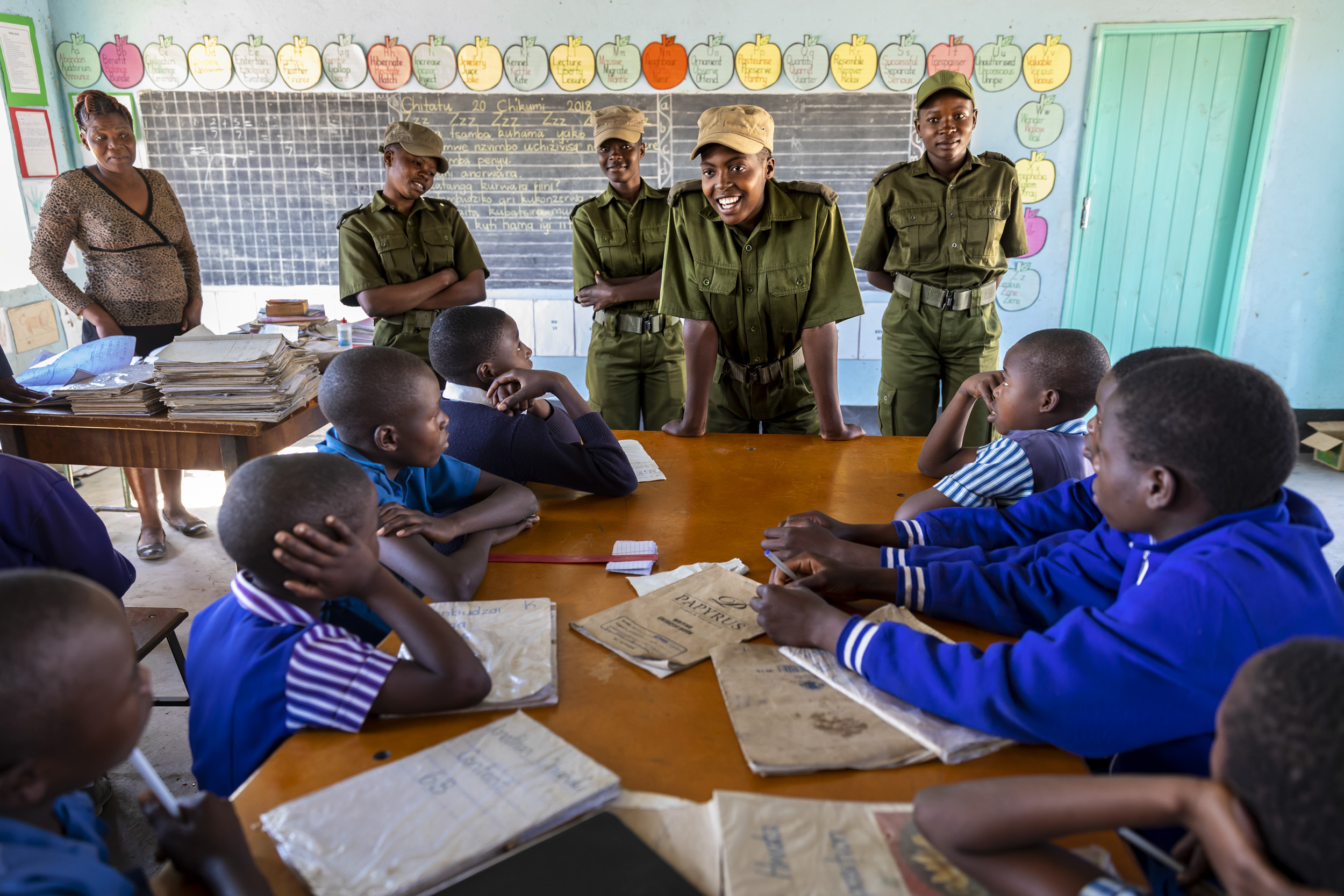
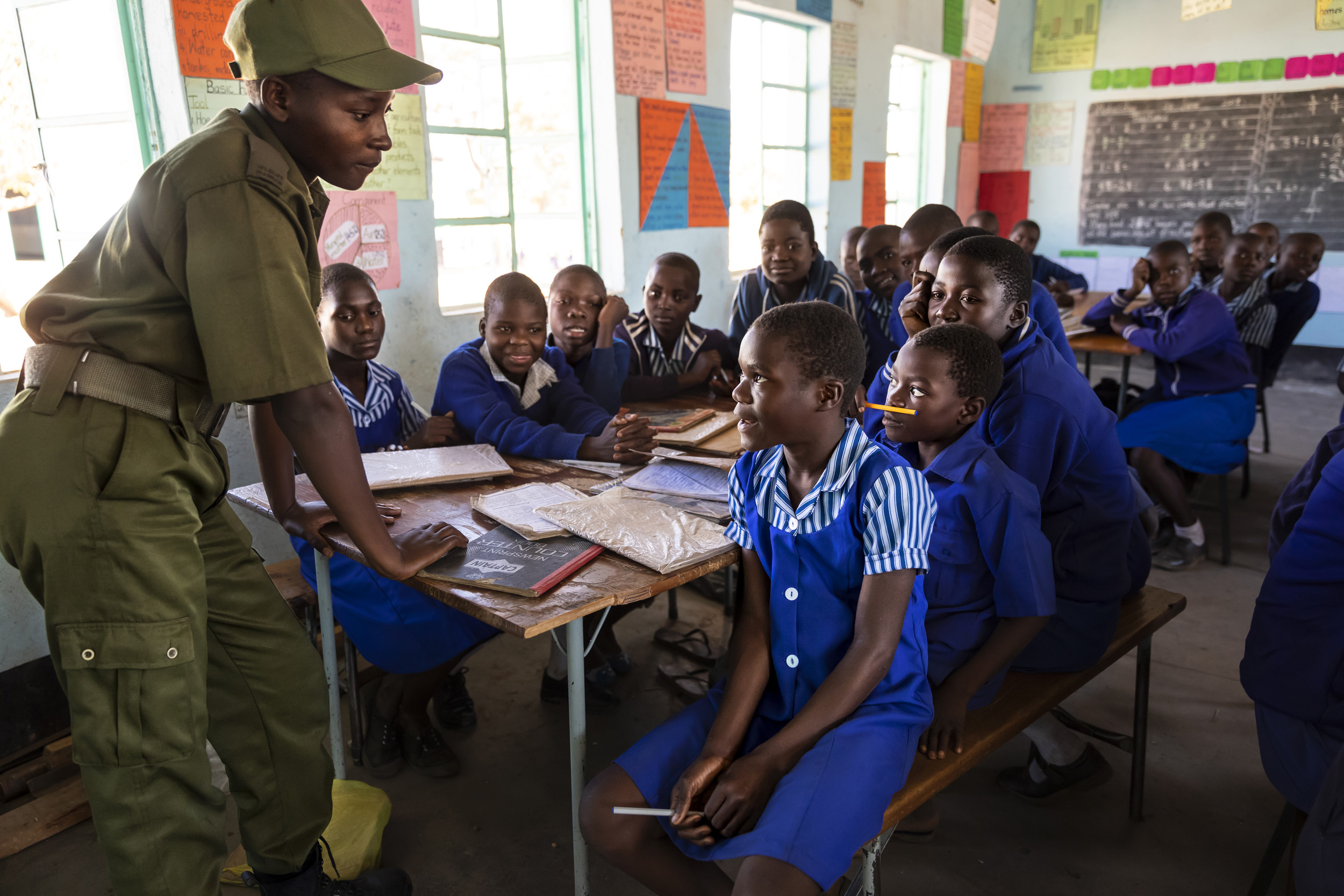
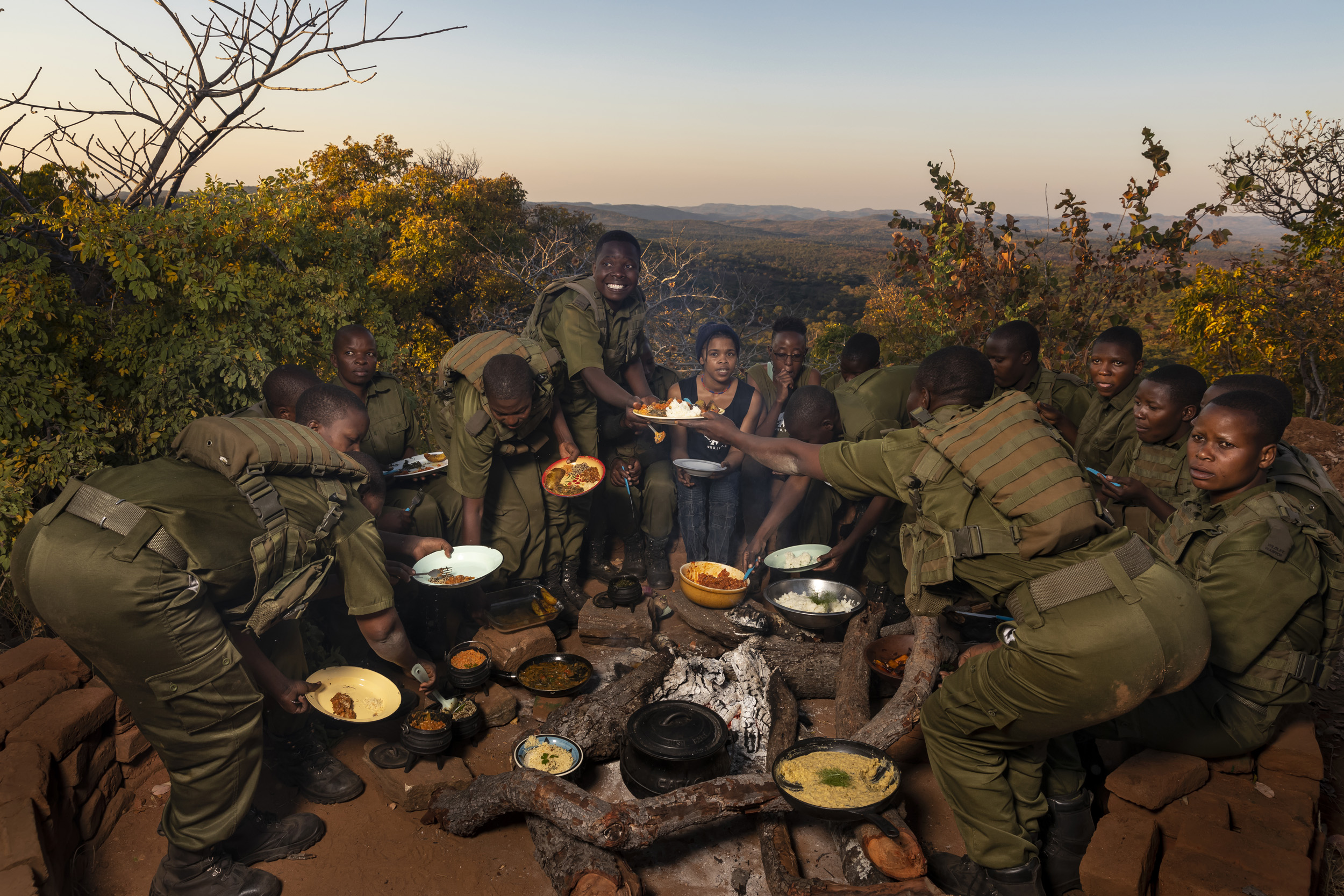
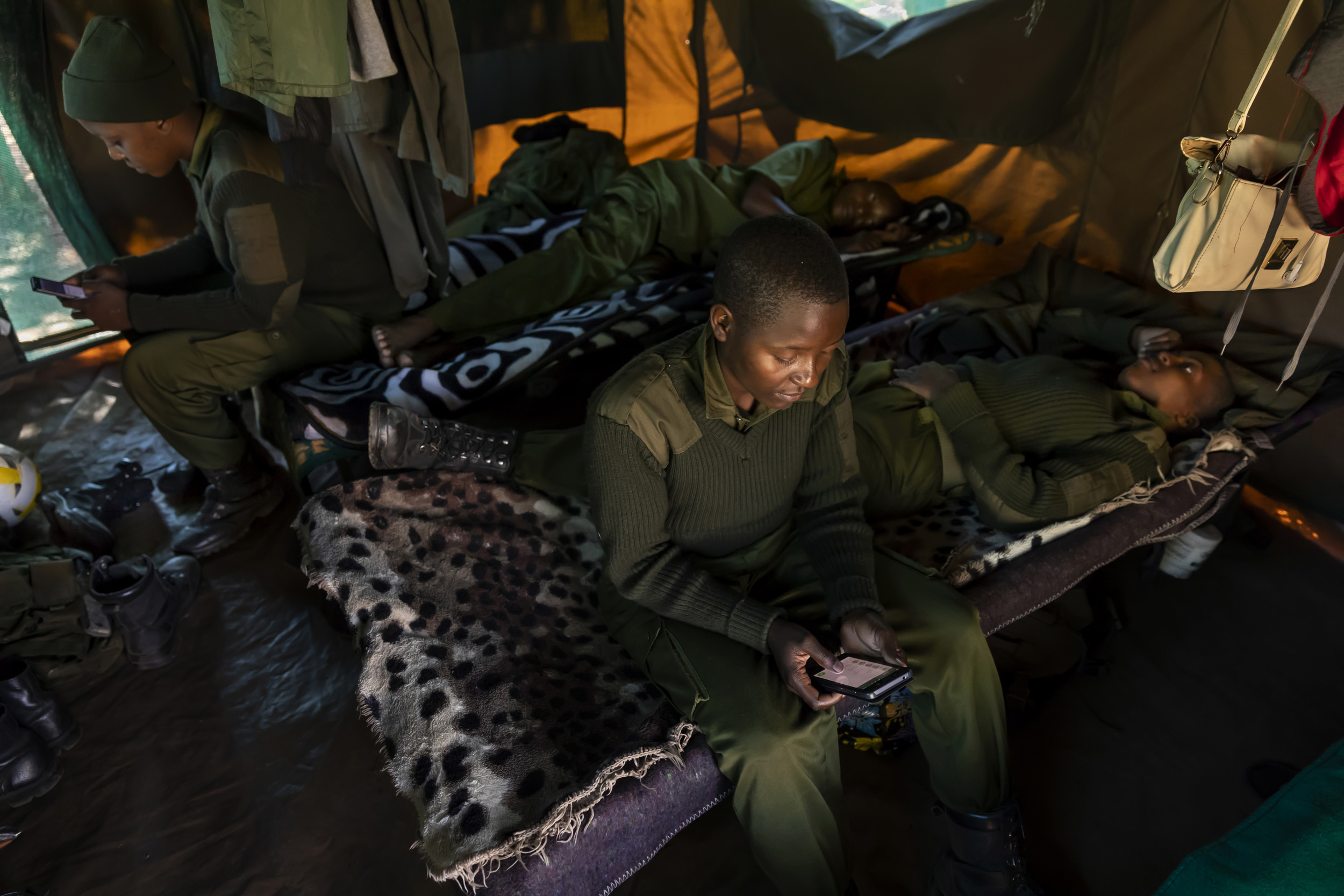
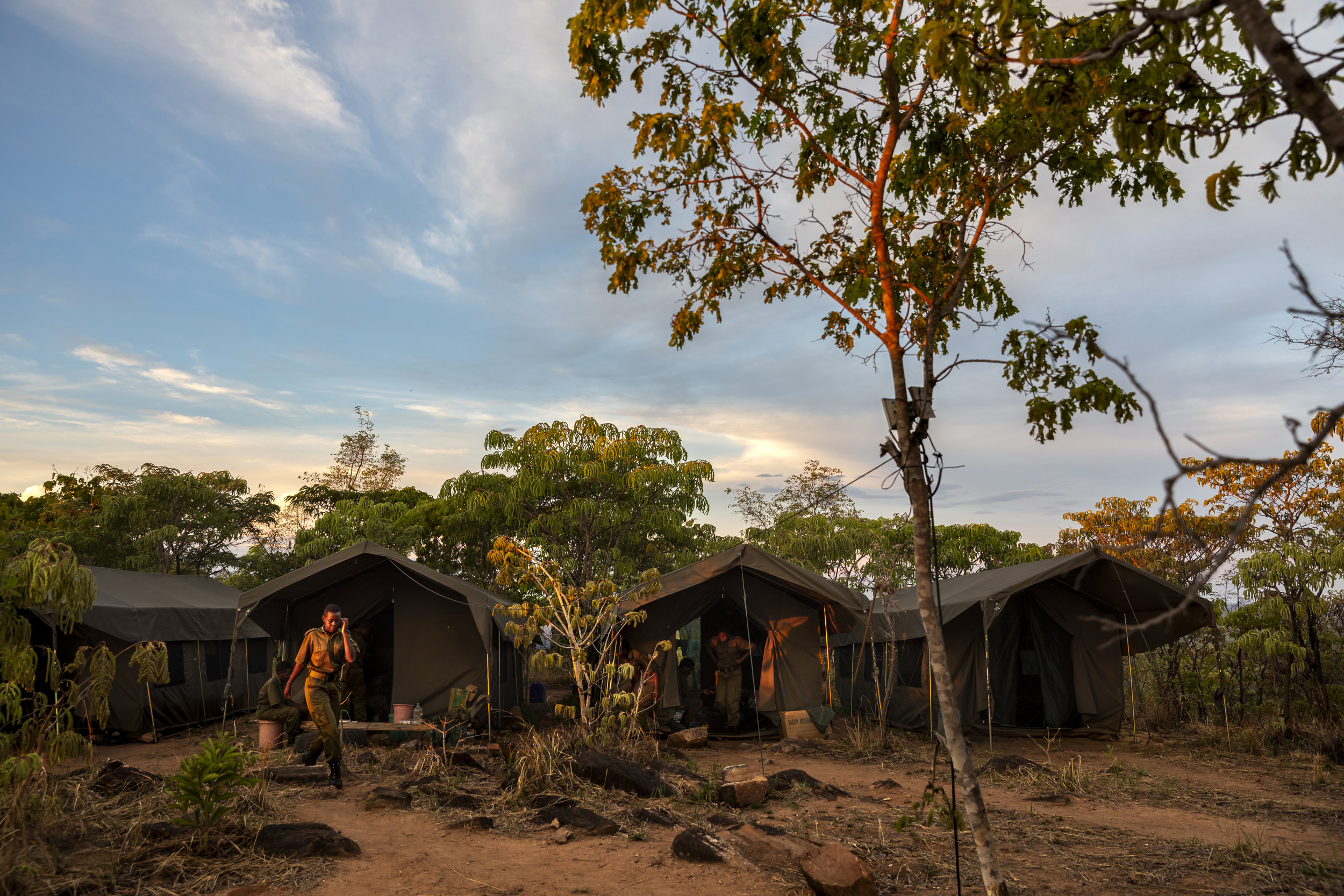
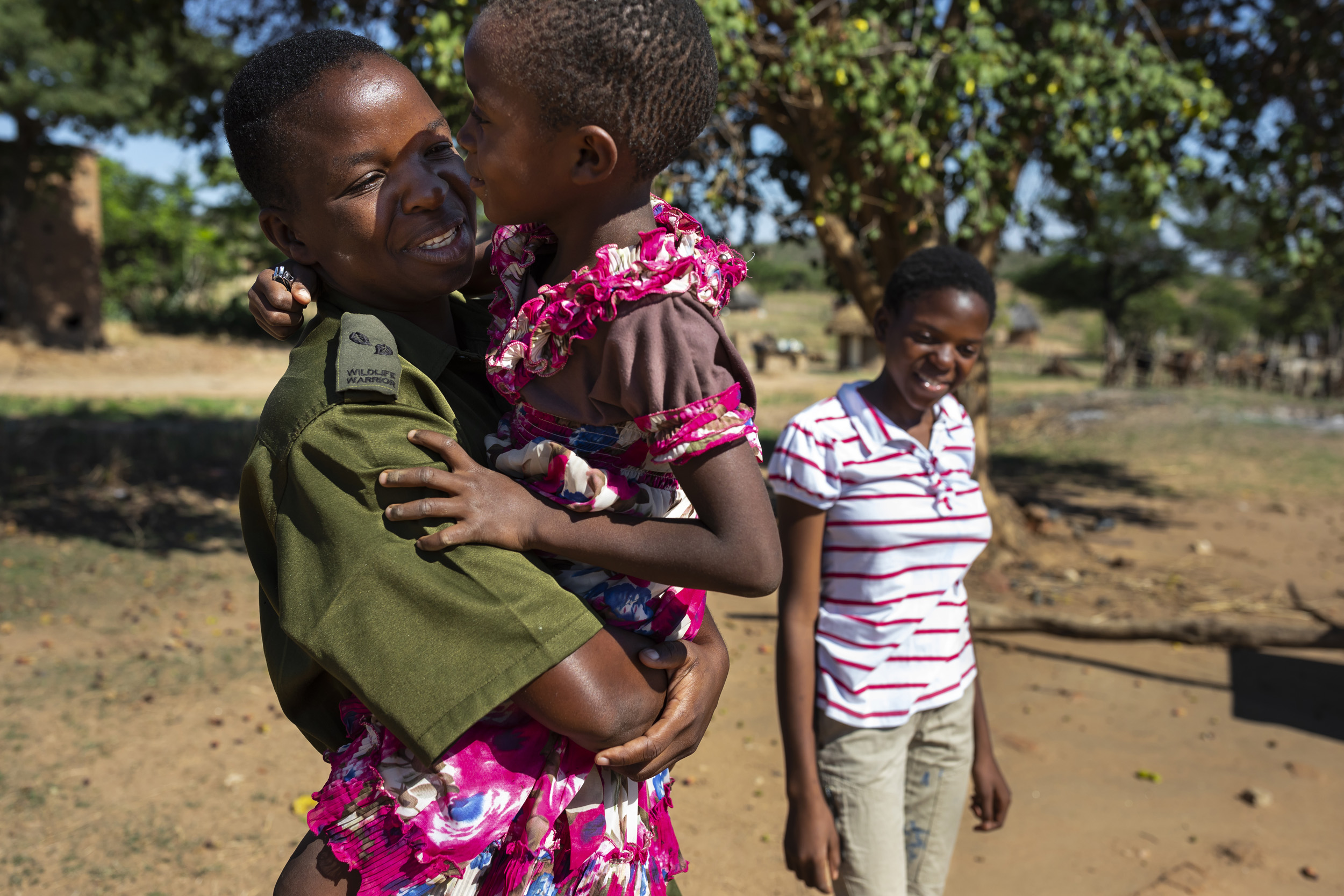
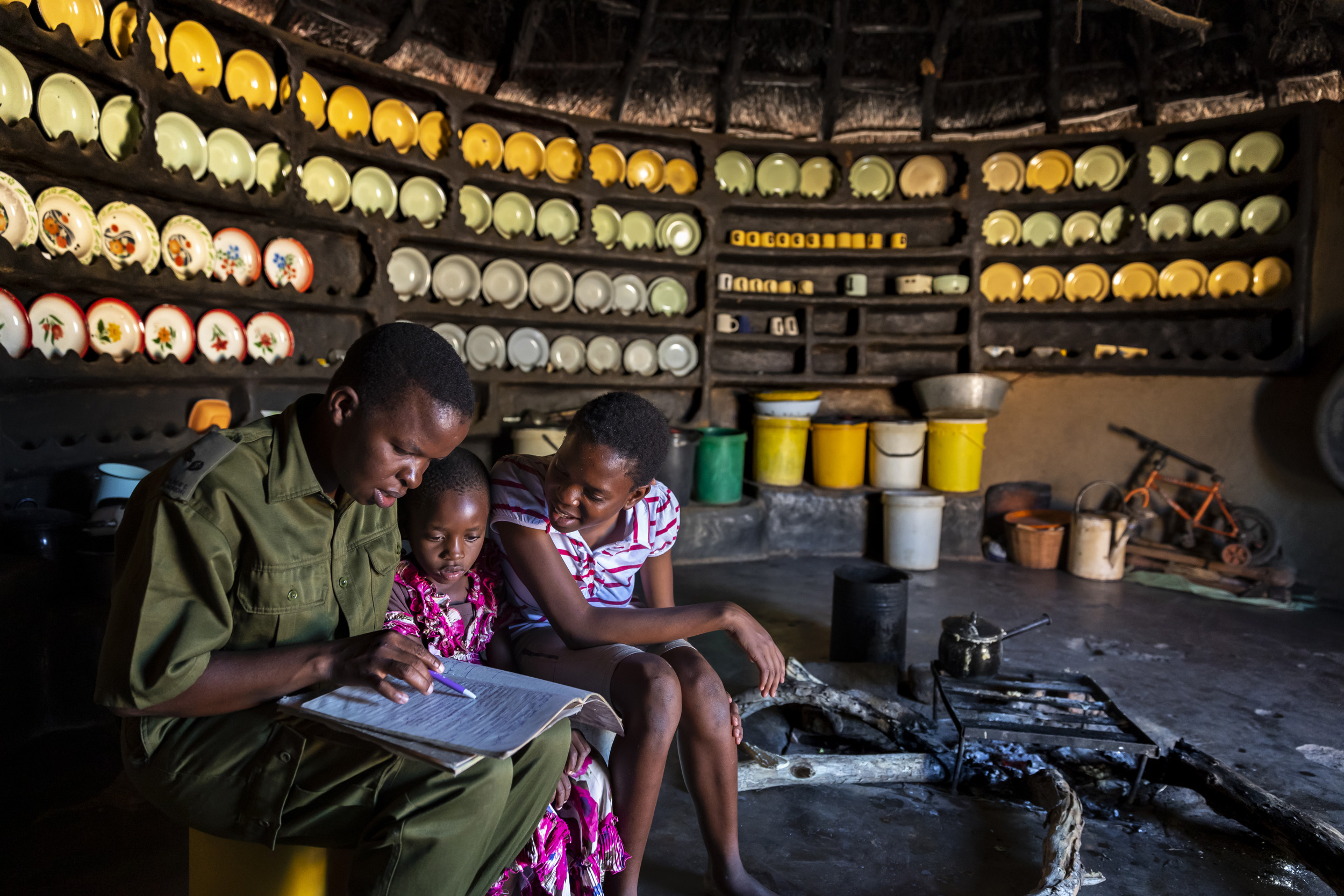
PHUNDUNDU WILDLIFE AREA, ZIMBABWE, JUNE 2018: Specially selected women from an all female. conservation ranger force undergo concealment and fire and movement training in the bush to curb poaching. Akashinga (meaning the ‘Brave Ones’ in local dialect) is a community-driven conservation model, empowering disadvantaged women to restore and manage a network of wilderness areas as an alternative to trophy hunting. Many current western-conceived solutions to conserve wilderness areas struggle to gain traction across the African continent. Predominately male forces are hampered by ongoing corruption, nepotism, drunkenness, aggressiveness towards local communities and a sense of entitlement. The I.A.P.F, the International Anti-Poaching Foundation led by former Australian Special Forces soldier Damien Mander, was created as a direct action conservation organisation to be used as a surgical instrument in targeting wildlife crime. In 2017 they decided to innovate, using an all- female team to manage an entire nature reserve in Zimbabwe. The program builds an alternative approach to the militarized paradigm of ‘fortress conservation’ which defends colonial boundaries between nature and humans. While still trained to deal with any situation they may face, the team has a community-driven interpersonal focus, working with rather than against the local population for the long-term benefits of their own communities and nature. Cut off from places of worship and burial, grazing areas, access to water, food, traditional medicine and given limited opportunity for employment or tourism benefits, it’s little wonder many of these communities struggle to see any value in conservation efforts. Women have traditionally played major roles in battle and are now re-emerging as key solutions in law enforcement and conflict resolution. In the Middle-East, counterinsurgency operations that involve penetrating and working with the local population to try and win the hearts and minds ha
PHUNDUNDU WILDLIFE AREA, ZIMBABWE, JUNE 2018: Members of the all female conservation ranger force known as Akashinga undergo tough training in the bush near their base. Akashinga (meaning the ‘Brave Ones’ in local dialect) is a community-driven conservation model, empowering disadvantaged women to restore and manage a network of wilderness areas as an alternative to trophy hunting. Many current western-conceived solutions to conserve wilderness areas struggle to gain traction across the African continent. Predominately male forces are hampered by ongoing corruption, nepotism, drunkenness, aggressiveness towards local communities and a sense of entitlement. The I.A.P.F, the International Anti-Poaching Foundation led by former Australian Special Forces soldier Damien Mander, was created as a direct action conservation organisation to be used as a surgical instrument in targeting wildlife crime. In 2017 they decided to innovate, using an all- female team to manage an entire nature reserve in Zimbabwe. The program builds an alternative approach to the militarized paradigm of ‘fortress conservation’ which defends colonial boundaries between nature and humans. While still trained to deal with any situation they may face, the team has a community-driven interpersonal focus, working with rather than against the local population for the long-term benefits of their own communities and nature. Cut off from places of worship and burial, grazing areas, access to water, food, traditional medicine and given limited opportunity for employment or tourism benefits, it’s little wonder many of these communities struggle to see any value in conservation efforts. Women have traditionally played major roles in battle and are now re-emerging as key solutions in law enforcement and conflict resolution. In the Middle-East, counterinsurgency operations that involve penetrating and working with the local population to try and win the hearts and minds have become fundamentally relian
PHUNDUNDU WILDLIFE AREA, ZIMBABWE, JUNE 2018: Members of the all female conservation ranger force known as Akashinga undergo tough training in the bush near their base. Akashinga (meaning the ‘Brave Ones’ in local dialect) is a community-driven conservation model, empowering disadvantaged women to restore and manage a network of wilderness areas as an alternative to trophy hunting. Many current western-conceived solutions to conserve wilderness areas struggle to gain traction across the African continent. Predominately male forces are hampered by ongoing corruption, nepotism, drunkenness, aggressiveness towards local communities and a sense of entitlement. The I.A.P.F, the International Anti-Poaching Foundation led by former Australian Special Forces soldier Damien Mander, was created as a direct action conservation organisation to be used as a surgical instrument in targeting wildlife crime. In 2017 they decided to innovate, using an all- female team to manage an entire nature reserve in Zimbabwe. The program builds an alternative approach to the militarized paradigm of ‘fortress conservation’ which defends colonial boundaries between nature and humans. While still trained to deal with any situation they may face, the team has a community-driven interpersonal focus, working with rather than against the local population for the long-term benefits of their own communities and nature. Cut off from places of worship and burial, grazing areas, access to water, food, traditional medicine and given limited opportunity for employment or tourism benefits, it’s little wonder many of these communities struggle to see any value in conservation efforts. Women have traditionally played major roles in battle and are now re-emerging as key solutions in law enforcement and conflict resolution. In the Middle-East, counterinsurgency operations that involve penetrating and working with the local population to try and win the hearts and minds have become fundamentally relian
PHUNDUNDU WILDLIFE AREA, ZIMBABWE, JUNE 2018: Members of the all female conservation ranger force known as Akashinga undergo tough training in the bush near their base. Akashinga (meaning the ‘Brave Ones’ in local dialect) is a community-driven conservation model, empowering disadvantaged women to restore and manage a network of wilderness areas as an alternative to trophy hunting. Many current western-conceived solutions to conserve wilderness areas struggle to gain traction across the African continent. Predominately male forces are hampered by ongoing corruption, nepotism, drunkenness, aggressiveness towards local communities and a sense of entitlement. The I.A.P.F, the International Anti-Poaching Foundation led by former Australian Special Forces soldier Damien Mander, was created as a direct action conservation organisation to be used as a surgical instrument in targeting wildlife crime. In 2017 they decided to innovate, using an all- female team to manage an entire nature reserve in Zimbabwe. The program builds an alternative approach to the militarized paradigm of ‘fortress conservation’ which defends colonial boundaries between nature and humans. While still trained to deal with any situation they may face, the team has a community-driven interpersonal focus, working with rather than against the local population for the long-term benefits of their own communities and nature. Cut off from places of worship and burial, grazing areas, access to water, food, traditional medicine and given limited opportunity for employment or tourism benefits, it’s little wonder many of these communities struggle to see any value in conservation efforts. Women have traditionally played major roles in battle and are now re-emerging as key solutions in law enforcement and conflict resolution. In the Middle-East, counterinsurgency operations that involve penetrating and working with the local population to try and win the hearts and minds have become fundamentally relian
PHUNDUNDU WILDLIFE AREA, ZIMBABWE, JUNE 2018: Members of the all female conservation ranger force known as Akashinga undergo tough training in the bush near their base. Akashinga (meaning the ‘Brave Ones’ in local dialect) is a community-driven conservation model, empowering disadvantaged women to restore and manage a network of wilderness areas as an alternative to trophy hunting. Many current western-conceived solutions to conserve wilderness areas struggle to gain traction across the African continent. Predominately male forces are hampered by ongoing corruption, nepotism, drunkenness, aggressiveness towards local communities and a sense of entitlement. The I.A.P.F, the International Anti-Poaching Foundation led by former Australian Special Forces soldier Damien Mander, was created as a direct action conservation organisation to be used as a surgical instrument in targeting wildlife crime. In 2017 they decided to innovate, using an all- female team to manage an entire nature reserve in Zimbabwe. The program builds an alternative approach to the militarized paradigm of ‘fortress conservation’ which defends colonial boundaries between nature and humans. While still trained to deal with any situation they may face, the team has a community-driven interpersonal focus, working with rather than against the local population for the long-term benefits of their own communities and nature. Cut off from places of worship and burial, grazing areas, access to water, food, traditional medicine and given limited opportunity for employment or tourism benefits, it’s little wonder many of these communities struggle to see any value in conservation efforts. Women have traditionally played major roles in battle and are now re-emerging as key solutions in law enforcement and conflict resolution. In the Middle-East, counterinsurgency operations that involve penetrating and working with the local population to try and win the hearts and minds have become fundamentally relian
PHUNDUNDU WILDLIFE AREA, ZIMBABWE, JUNE 2018: Members of the all female conservation ranger force known as Akashinga undergo tough training in the bush near their base. Akashinga (meaning the ‘Brave Ones’ in local dialect) is a community-driven conservation model, empowering disadvantaged women to restore and manage a network of wilderness areas as an alternative to trophy hunting. Many current western-conceived solutions to conserve wilderness areas struggle to gain traction across the African continent. Predominately male forces are hampered by ongoing corruption, nepotism, drunkenness, aggressiveness towards local communities and a sense of entitlement. The I.A.P.F, the International Anti-Poaching Foundation led by former Australian Special Forces soldier Damien Mander, was created as a direct action conservation organisation to be used as a surgical instrument in targeting wildlife crime. In 2017 they decided to innovate, using an all- female team to manage an entire nature reserve in Zimbabwe. The program builds an alternative approach to the militarized paradigm of ‘fortress conservation’ which defends colonial boundaries between nature and humans. While still trained to deal with any situation they may face, the team has a community-driven interpersonal focus, working with rather than against the local population for the long-term benefits of their own communities and nature. Cut off from places of worship and burial, grazing areas, access to water, food, traditional medicine and given limited opportunity for employment or tourism benefits, it’s little wonder many of these communities struggle to see any value in conservation efforts. Women have traditionally played major roles in battle and are now re-emerging as key solutions in law enforcement and conflict resolution. In the Middle-East, counterinsurgency operations that involve penetrating and working with the local population to try and win the hearts and minds have become fundamentally relian
PHUNDUNDU WILDLIFE AREA, ZIMBABWE, JUNE 2018: Members of the all female conservation ranger force known as Akashinga undergo tough training in the bush near their base. Akashinga (meaning the ‘Brave Ones’ in local dialect) is a community-driven conservation model, empowering disadvantaged women to restore and manage a network of wilderness areas as an alternative to trophy hunting. Many current western-conceived solutions to conserve wilderness areas struggle to gain traction across the African continent. Predominately male forces are hampered by ongoing corruption, nepotism, drunkenness, aggressiveness towards local communities and a sense of entitlement. The I.A.P.F, the International Anti-Poaching Foundation led by former Australian Special Forces soldier Damien Mander, was created as a direct action conservation organisation to be used as a surgical instrument in targeting wildlife crime. In 2017 they decided to innovate, using an all- female team to manage an entire nature reserve in Zimbabwe. The program builds an alternative approach to the militarized paradigm of ‘fortress conservation’ which defends colonial boundaries between nature and humans. While still trained to deal with any situation they may face, the team has a community-driven interpersonal focus, working with rather than against the local population for the long-term benefits of their own communities and nature. Cut off from places of worship and burial, grazing areas, access to water, food, traditional medicine and given limited opportunity for employment or tourism benefits, it’s little wonder many of these communities struggle to see any value in conservation efforts. Women have traditionally played major roles in battle and are now re-emerging as key solutions in law enforcement and conflict resolution. In the Middle-East, counterinsurgency operations that involve penetrating and working with the local population to try and win the hearts and minds have become fundamentally relian
PHUNDUNDU WILDLIFE AREA, ZIMBABWE, JUNE 2018: Members of the all female conservation ranger force known as Akashinga undergo tough training in the bush near their base. Akashinga (meaning the ‘Brave Ones’ in local dialect) is a community-driven conservation model, empowering disadvantaged women to restore and manage a network of wilderness areas as an alternative to trophy hunting. Many current western-conceived solutions to conserve wilderness areas struggle to gain traction across the African continent. Predominately male forces are hampered by ongoing corruption, nepotism, drunkenness, aggressiveness towards local communities and a sense of entitlement. The I.A.P.F, the International Anti-Poaching Foundation led by former Australian Special Forces soldier Damien Mander, was created as a direct action conservation organisation to be used as a surgical instrument in targeting wildlife crime. In 2017 they decided to innovate, using an all- female team to manage an entire nature reserve in Zimbabwe. The program builds an alternative approach to the militarized paradigm of ‘fortress conservation’ which defends colonial boundaries between nature and humans. While still trained to deal with any situation they may face, the team has a community-driven interpersonal focus, working with rather than against the local population for the long-term benefits of their own communities and nature. Cut off from places of worship and burial, grazing areas, access to water, food, traditional medicine and given limited opportunity for employment or tourism benefits, it’s little wonder many of these communities struggle to see any value in conservation efforts. Women have traditionally played major roles in battle and are now re-emerging as key solutions in law enforcement and conflict resolution. In the Middle-East, counterinsurgency operations that involve penetrating and working with the local population to try and win the hearts and minds have become fundamentally relian
PHUNDUNDU WILDLIFE AREA, ZIMBABWE, JUNE 2018: Members of the all female conservation ranger force known as Akashinga undergo tough training in the bush near their base. Akashinga (meaning the ‘Brave Ones’ in local dialect) is a community-driven conservation model, empowering disadvantaged women to restore and manage a network of wilderness areas as an alternative to trophy hunting. Many current western-conceived solutions to conserve wilderness areas struggle to gain traction across the African continent. Predominately male forces are hampered by ongoing corruption, nepotism, drunkenness, aggressiveness towards local communities and a sense of entitlement. The I.A.P.F, the International Anti-Poaching Foundation led by former Australian Special Forces soldier Damien Mander, was created as a direct action conservation organisation to be used as a surgical instrument in targeting wildlife crime. In 2017 they decided to innovate, using an all- female team to manage an entire nature reserve in Zimbabwe. The program builds an alternative approach to the militarized paradigm of ‘fortress conservation’ which defends colonial boundaries between nature and humans. While still trained to deal with any situation they may face, the team has a community-driven interpersonal focus, working with rather than against the local population for the long-term benefits of their own communities and nature. Cut off from places of worship and burial, grazing areas, access to water, food, traditional medicine and given limited opportunity for employment or tourism benefits, it’s little wonder many of these communities struggle to see any value in conservation efforts. Women have traditionally played major roles in battle and are now re-emerging as key solutions in law enforcement and conflict resolution. In the Middle-East, counterinsurgency operations that involve penetrating and working with the local population to try and win the hearts and minds have become fundamentally relian
PHUNDUNDU WILDLIFE AREA, ZIMBABWE, JUNE 2018: Members of the all female conservation ranger force known as Akashinga undergo tough training in the bush near their base. Akashinga (meaning the ‘Brave Ones’ in local dialect) is a community-driven conservation model, empowering disadvantaged women to restore and manage a network of wilderness areas as an alternative to trophy hunting. Many current western-conceived solutions to conserve wilderness areas struggle to gain traction across the African continent. Predominately male forces are hampered by ongoing corruption, nepotism, drunkenness, aggressiveness towards local communities and a sense of entitlement. The I.A.P.F, the International Anti-Poaching Foundation led by former Australian Special Forces soldier Damien Mander, was created as a direct action conservation organisation to be used as a surgical instrument in targeting wildlife crime. In 2017 they decided to innovate, using an all- female team to manage an entire nature reserve in Zimbabwe. The program builds an alternative approach to the militarized paradigm of ‘fortress conservation’ which defends colonial boundaries between nature and humans. While still trained to deal with any situation they may face, the team has a community-driven interpersonal focus, working with rather than against the local population for the long-term benefits of their own communities and nature. Cut off from places of worship and burial, grazing areas, access to water, food, traditional medicine and given limited opportunity for employment or tourism benefits, it’s little wonder many of these communities struggle to see any value in conservation efforts. Women have traditionally played major roles in battle and are now re-emerging as key solutions in law enforcement and conflict resolution. In the Middle-East, counterinsurgency operations that involve penetrating and working with the local population to try and win the hearts and minds have become fundamentally relian
PHUNDUNDU WILDLIFE AREA, ZIMBABWE, JUNE 2018: Akashinga (meaning the ‘Brave Ones’ in local dialect) is a community-driven conservation model, empowering disadvantaged women to restore and manage a network of wilderness areas as an alternative to trophy hunting. In this image the women are seen working with the local community trying to find an elephant that has become a crop raider. Many current western-conceived solutions to conserve wilderness areas struggle to gain traction across the African continent. Predominately male forces are hampered by ongoing corruption, nepotism, drunkenness, aggressiveness towards local communities and a sense of entitlement. The I.A.P.F, the International Anti-Poaching Foundation led by former Australian Special Forces soldier Damien Mander, was created as a direct action conservation organisation to be used as a surgical instrument in targeting wildlife crime. In 2017 they decided to innovate, using an all- female team to manage an entire nature reserve in Zimbabwe. The program builds an alternative approach to the militarized paradigm of ‘fortress conservation’ which defends colonial boundaries between nature and humans. While still trained to deal with any situation they may face, the team has a community-driven interpersonal focus, working with rather than against the local population for the long-term benefits of their own communities and nature. Cut off from places of worship and burial, grazing areas, access to water, food, traditional medicine and given limited opportunity for employment or tourism benefits, it’s little wonder many of these communities struggle to see any value in conservation efforts. Women have traditionally played major roles in battle and are now re-emerging as key solutions in law enforcement and conflict resolution. In the Middle-East, counterinsurgency operations that involve penetrating and working with the local population to try and win the hearts and minds have become fundamentally relia
PHUNDUNDU WILDLIFE AREA, ZIMBABWE, JUNE 2018: Specially selected women from an all female. conservation ranger force undergo sniper training in the bush to curb poaching. Akashinga (meaning the ‘Brave Ones’ in local dialect) is a community-driven conservation model, empowering disadvantaged women to restore and manage a network of wilderness areas as an alternative to trophy hunting. Many current western-conceived solutions to conserve wilderness areas struggle to gain traction across the African continent. Predominately male forces are hampered by ongoing corruption, nepotism, drunkenness, aggressiveness towards local communities and a sense of entitlement. The I.A.P.F, the International Anti-Poaching Foundation led by former Australian Special Forces soldier Damien Mander, was created as a direct action conservation organisation to be used as a surgical instrument in targeting wildlife crime. In 2017 they decided to innovate, using an all- female team to manage an entire nature reserve in Zimbabwe. The program builds an alternative approach to the militarized paradigm of ‘fortress conservation’ which defends colonial boundaries between nature and humans. While still trained to deal with any situation they may face, the team has a community-driven interpersonal focus, working with rather than against the local population for the long-term benefits of their own communities and nature. Cut off from places of worship and burial, grazing areas, access to water, food, traditional medicine and given limited opportunity for employment or tourism benefits, it’s little wonder many of these communities struggle to see any value in conservation efforts. Women have traditionally played major roles in battle and are now re-emerging as key solutions in law enforcement and conflict resolution. In the Middle-East, counterinsurgency operations that involve penetrating and working with the local population to try and win the hearts and minds have become fundamentally reli
PHUNDUNDU WILDLIFE AREA, ZIMBABWE, DECEMBER 2018: Sergeant Vimbai is seen as a role model in her community. Through her conservation work she has distanced herself from an extremely abusive marriage and is now able to pay school fees for her children despite coming from the poorest demographic in Zimbabwe. She is part of an all female conservation ranger force known as “Akashinga” Akashinga (meaning the ‘Brave Ones’) is a community-driven conservation model, empowering disadvantaged women to restore and manage a network of wilderness areas as an alternative to trophy hunting in Zimbabwe. Predominately male forces are often hampered by ongoing corruption, nepotism, drunkenness, aggressiveness towards local communities and a sense of entitlement. The International Anti-Poaching Foundation, led by former Australian Special Forces soldier Damien Mander, was created as a direct action conservation organization used as a surgical instrument in targeting wildlife crime. In 2017 they decided to innovate, using an all- female team to manage an entire nature reserve in Zimbabwe. The program builds an alternative approach to the militarized paradigm of ‘fortress conservation’ that defends colonial boundaries between nature and humans. While still trained to deal with any situation they may face, the team has a community-driven interpersonal focus, working with rather than against the local population for the long-term benefits of their own communities and nature.
KAROI, ZIMBABWE, DECEMBER 2018: Seven village men injured by a leopard receive treatment from Akashinga Sergeant Vimbai Kumire. The men were injured when they foolishly pursued and killed a leopard that had strayed into their fields. Although this is an illegal act, the Akashinga forces deployed to help the injured and take the more seriously wounded to hospital over 50km away. This is the kind of community relations these women rely on to be effective in their work. Akashinga (meaning the ‘Brave Ones’) is a community-driven conservation model, empowering disadvantaged women to restore and manage a network of wilderness areas as an alternative to trophy hunting in Zimbabwe.
KAROI, ZIMBABWE, DECEMBER 2018: Seven village men injured by a leopard receive treatment from Akashinga Sergeant Vimbai Kumire. The men were injured when they foolishly pursued and killed a leopard that had strayed into their fields. Although this is an illegal act, the Akashinga forces deployed to help the injured and take the more seriously wounded to hospital over 50km away. This is the kind of community relations these women rely on to be effective in their work. Akashinga (meaning the ‘Brave Ones’) is a community-driven conservation model, empowering disadvantaged women to restore and manage a network of wilderness areas as an alternative to trophy hunting in Zimbabwe.
PHUNDUNDU WILDLIFE AREA, ZIMBABWE, DECEMBER 2018: A 5 member patrol walks through the wilderness they protect in Phundundu. This patrol is in the bush for 5 days at a time. They are part of an all female conservation ranger force known as “Akashinga” Akashinga (meaning the ‘Brave Ones’) is a community-driven conservation model, empowering disadvantaged women to restore and manage a network of wilderness areas as an alternative to trophy hunting in Zimbabwe. Predominately male forces are often hampered by ongoing corruption, nepotism, drunkenness, aggressiveness towards local communities and a sense of entitlement. The International Anti-Poaching Foundation, led by former Australian Special Forces soldier Damien Mander, was created as a direct action conservation organization used as a surgical instrument in targeting wildlife crime. In 2017 they decided to innovate, using an all- female team to manage an entire nature reserve in Zimbabwe. The program builds an alternative approach to the militarized paradigm of ‘fortress conservation’ that defends colonial boundaries between nature and humans. While still trained to deal with any situation they may face, the team has a community-driven interpersonal focus, working with rather than against the local population for the long-term benefits of their own communities and nature.
PHUNDUNDU WILDLIFE AREA, ZIMBABWE, DECEMBER 2018: A 5 member patrol walks through the wilderness they protect in Phundundu. This patrol is in the bush for 5 days at a time. They are part of an all female conservation ranger force known as “Akashinga” Akashinga (meaning the ‘Brave Ones’) is a community-driven conservation model, empowering disadvantaged women to restore and manage a network of wilderness areas as an alternative to trophy hunting in Zimbabwe. Predominately male forces are often hampered by ongoing corruption, nepotism, drunkenness, aggressiveness towards local communities and a sense of entitlement. The International Anti-Poaching Foundation, led by former Australian Special Forces soldier Damien Mander, was created as a direct action conservation organization used as a surgical instrument in targeting wildlife crime. In 2017 they decided to innovate, using an all- female team to manage an entire nature reserve in Zimbabwe. The program builds an alternative approach to the militarized paradigm of ‘fortress conservation’ that defends colonial boundaries between nature and humans. While still trained to deal with any situation they may face, the team has a community-driven interpersonal focus, working with rather than against the local population for the long-term benefits of their own communities and nature.
PHUNDUNDU WILDLIFE AREA, ZIMBABWE, DECEMBER 2018: A 5 member patrol walks through the wilderness they protect in Phundundu. This patrol is in the bush for 5 days at a time. They are part of an all female conservation ranger force known as “Akashinga” Akashinga (meaning the ‘Brave Ones’) is a community-driven conservation model, empowering disadvantaged women to restore and manage a network of wilderness areas as an alternative to trophy hunting in Zimbabwe. Predominately male forces are often hampered by ongoing corruption, nepotism, drunkenness, aggressiveness towards local communities and a sense of entitlement. The International Anti-Poaching Foundation, led by former Australian Special Forces soldier Damien Mander, was created as a direct action conservation organization used as a surgical instrument in targeting wildlife crime. In 2017 they decided to innovate, using an all- female team to manage an entire nature reserve in Zimbabwe. The program builds an alternative approach to the militarized paradigm of ‘fortress conservation’ that defends colonial boundaries between nature and humans. While still trained to deal with any situation they may face, the team has a community-driven interpersonal focus, working with rather than against the local population for the long-term benefits of their own communities and nature.
PHUNDUNDU WILDLIFE AREA, ZIMBABWE, DECEMBER 2018: A 5 member patrol walks through the wilderness they protect in Phundundu. This patrol is in the bush for 5 days at a time. They are part of an all female conservation ranger force known as “Akashinga” Akashinga (meaning the ‘Brave Ones’) is a community-driven conservation model, empowering disadvantaged women to restore and manage a network of wilderness areas as an alternative to trophy hunting in Zimbabwe. Predominately male forces are often hampered by ongoing corruption, nepotism, drunkenness, aggressiveness towards local communities and a sense of entitlement. The International Anti-Poaching Foundation, led by former Australian Special Forces soldier Damien Mander, was created as a direct action conservation organization used as a surgical instrument in targeting wildlife crime. In 2017 they decided to innovate, using an all- female team to manage an entire nature reserve in Zimbabwe. The program builds an alternative approach to the militarized paradigm of ‘fortress conservation’ that defends colonial boundaries between nature and humans. While still trained to deal with any situation they may face, the team has a community-driven interpersonal focus, working with rather than against the local population for the long-term benefits of their own communities and nature.
PHUNDUNDU WILDLIFE AREA, ZIMBABWE, DECEMBER 2018: An Akashinga patrol member discovers and dismantles animal snares in the wilderness they protect in Phundundu. This patrol is in the bush for 5 days at a time. They are part of an all female conservation ranger force known as “Akashinga” Akashinga (meaning the ‘Brave Ones’) is a community-driven conservation model, empowering disadvantaged women to restore and manage a network of wilderness areas as an alternative to trophy hunting in Zimbabwe. Predominately male forces are often hampered by ongoing corruption, nepotism, drunkenness, aggressiveness towards local communities and a sense of entitlement. The International Anti-Poaching Foundation, led by former Australian Special Forces soldier Damien Mander, was created as a direct action conservation organization used as a surgical instrument in targeting wildlife crime. In 2017 they decided to innovate, using an all- female team to manage an entire nature reserve in Zimbabwe. The program builds an alternative approach to the militarized paradigm of ‘fortress conservation’ that defends colonial boundaries between nature and humans. While still trained to deal with any situation they may face, the team has a community-driven interpersonal focus, working with rather than against the local population for the long-term benefits of their own communities and nature.
PHUNDUNDU WILDLIFE AREA, ZIMBABWE, DECEMBER 2018: A patrol group takes a break as they walk through the wilderness they protect in Phundundu. This patrol is in the bush for 5 days at a time. They are part of an all female conservation ranger force known as “Akashinga” Akashinga (meaning the ‘Brave Ones’) is a community-driven conservation model, empowering disadvantaged women to restore and manage a network of wilderness areas as an alternative to trophy hunting in Zimbabwe. Predominately male forces are often hampered by ongoing corruption, nepotism, drunkenness, aggressiveness towards local communities and a sense of entitlement. The International Anti-Poaching Foundation, led by former Australian Special Forces soldier Damien Mander, was created as a direct action conservation organization used as a surgical instrument in targeting wildlife crime. In 2017 they decided to innovate, using an all- female team to manage an entire nature reserve in Zimbabwe. The program builds an alternative approach to the militarized paradigm of ‘fortress conservation’ that defends colonial boundaries between nature and humans. While still trained to deal with any situation they may face, the team has a community-driven interpersonal focus, working with rather than against the local population for the long-term benefits of their own communities and nature.
PHUNDUNDU WILDLIFE AREA, ZIMBABWE, JUNE 2018: Akashinga (meaning the ‘Brave Ones’ in local dialect) is a community-driven conservation model, empowering disadvantaged women to restore and manage a network of wilderness areas as an alternative to trophy hunting. Here some of these women are seen interacting with elephant and out on patrol. Many current western-conceived solutions to conserve wilderness areas struggle to gain traction across the African continent. Predominately male forces are hampered by ongoing corruption, nepotism, drunkenness, aggressiveness towards local communities and a sense of entitlement. The I.A.P.F, the International Anti-Poaching Foundation led by former Australian Special Forces soldier Damien Mander, was created as a direct action conservation organisation to be used as a surgical instrument in targeting wildlife crime. In 2017 they decided to innovate, using an all- female team to manage an entire nature reserve in Zimbabwe. The program builds an alternative approach to the militarized paradigm of ‘fortress conservation’ which defends colonial boundaries between nature and humans. While still trained to deal with any situation they may face, the team has a community-driven interpersonal focus, working with rather than against the local population for the long-term benefits of their own communities and nature. Cut off from places of worship and burial, grazing areas, access to water, food, traditional medicine and given limited opportunity for employment or tourism benefits, it’s little wonder many of these communities struggle to see any value in conservation efforts. Women have traditionally played major roles in battle and are now re-emerging as key solutions in law enforcement and conflict resolution. In the Middle-East, counterinsurgency operations that involve penetrating and working with the local population to try and win the hearts and minds have become fundamentally reliant on the nature, credibility and intuition o
PHUNDUNDU WILDLIFE AREA, ZIMBABWE, JUNE 2018: Akashinga (meaning the ‘Brave Ones’ in local dialect) is a community-driven conservation model, empowering disadvantaged women to restore and manage a network of wilderness areas as an alternative to trophy hunting. Here some of these women are seen interacting with elephant and out on patrol. Many current western-conceived solutions to conserve wilderness areas struggle to gain traction across the African continent. Predominately male forces are hampered by ongoing corruption, nepotism, drunkenness, aggressiveness towards local communities and a sense of entitlement. The I.A.P.F, the International Anti-Poaching Foundation led by former Australian Special Forces soldier Damien Mander, was created as a direct action conservation organisation to be used as a surgical instrument in targeting wildlife crime. In 2017 they decided to innovate, using an all- female team to manage an entire nature reserve in Zimbabwe. The program builds an alternative approach to the militarized paradigm of ‘fortress conservation’ which defends colonial boundaries between nature and humans. While still trained to deal with any situation they may face, the team has a community-driven interpersonal focus, working with rather than against the local population for the long-term benefits of their own communities and nature. Cut off from places of worship and burial, grazing areas, access to water, food, traditional medicine and given limited opportunity for employment or tourism benefits, it’s little wonder many of these communities struggle to see any value in conservation efforts. Women have traditionally played major roles in battle and are now re-emerging as key solutions in law enforcement and conflict resolution. In the Middle-East, counterinsurgency operations that involve penetrating and working with the local population to try and win the hearts and minds have become fundamentally reliant on the nature, credibility and intuition o
PHUNDUNDU WILDLIFE AREA, ZIMBABWE, DECEMBER 2018: A 5 member patrol cooks vegan food at an observation point in the wilderness they protect in Phundundu. This patrol is in the bush for 5 days at a time. They are part of an all female conservation ranger force known as “Akashinga” Akashinga (meaning the ‘Brave Ones’) is a community-driven conservation model, empowering disadvantaged women to restore and manage a network of wilderness areas as an alternative to trophy hunting in Zimbabwe. Predominately male forces are often hampered by ongoing corruption, nepotism, drunkenness, aggressiveness towards local communities and a sense of entitlement. The International Anti-Poaching Foundation, led by former Australian Special Forces soldier Damien Mander, was created as a direct action conservation organization used as a surgical instrument in targeting wildlife crime. In 2017 they decided to innovate, using an all- female team to manage an entire nature reserve in Zimbabwe. The program builds an alternative approach to the militarized paradigm of ‘fortress conservation’ that defends colonial boundaries between nature and humans. While still trained to deal with any situation they may face, the team has a community-driven interpersonal focus, working with rather than against the local population for the long-term benefits of their own communities and nature.
PHUNDUNDU WILDLIFE AREA, ZIMBABWE, DECEMBER 2018: Members of the all female conservation ranger force known as “Akashinga” undergo house penetration training near their base for operations against organized environmental criminals. Akashinga (meaning the ‘Brave Ones’) is a community-driven conservation model, empowering disadvantaged women to restore and manage a network of wilderness areas as an alternative to trophy hunting in Zimbabwe. Predominately male forces are often hampered by ongoing corruption, nepotism, drunkenness, aggressiveness towards local communities and a sense of entitlement. The International Anti-Poaching Foundation, led by former Australian Special Forces soldier Damien Mander, was created as a direct action conservation organization used as a surgical instrument in targeting wildlife crime. In 2017 they decided to innovate, using an all- female team to manage an entire nature reserve in Zimbabwe. The program builds an alternative approach to the militarized paradigm of ‘fortress conservation’ that defends colonial boundaries between nature and humans. While still trained to deal with any situation they may face, the team has a community-driven interpersonal focus, working with rather than against the local population for the long-term benefits of their own communities and nature.
PHUNDUNDU WILDLIFE AREA, ZIMBABWE, DECEMBER 2018: Members of the all female conservation ranger force known as “Akashinga” undergo house penetration training near their base for operations against organized environmental criminals. They are being taught by Damien Mander, former Australian SAS member. Akashinga (meaning the ‘Brave Ones’) is a community-driven conservation model, empowering disadvantaged women to restore and manage a network of wilderness areas as an alternative to trophy hunting in Zimbabwe. Predominately male forces are often hampered by ongoing corruption, nepotism, drunkenness, aggressiveness towards local communities and a sense of entitlement. The International Anti-Poaching Foundation, led by former Australian Special Forces soldier Damien Mander, was created as a direct action conservation organization used as a surgical instrument in targeting wildlife crime. In 2017 they decided to innovate, using an all- female team to manage an entire nature reserve in Zimbabwe. The program builds an alternative approach to the militarized paradigm of ‘fortress conservation’ that defends colonial boundaries between nature and humans. While still trained to deal with any situation they may face, the team has a community-driven interpersonal focus, working with rather than against the local population for the long-term benefits of their own communities and nature.
PHUNDUNDU WILDLIFE AREA, ZIMBABWE, DECEMBER 2018: Members of the all female conservation ranger force known as “Akashinga” undergo house penetration training near their base for operations against organized environmental criminals. Akashinga (meaning the ‘Brave Ones’) is a community-driven conservation model, empowering disadvantaged women to restore and manage a network of wilderness areas as an alternative to trophy hunting in Zimbabwe. Predominately male forces are often hampered by ongoing corruption, nepotism, drunkenness, aggressiveness towards local communities and a sense of entitlement. The International Anti-Poaching Foundation, led by former Australian Special Forces soldier Damien Mander, was created as a direct action conservation organization used as a surgical instrument in targeting wildlife crime. In 2017 they decided to innovate, using an all- female team to manage an entire nature reserve in Zimbabwe. The program builds an alternative approach to the militarized paradigm of ‘fortress conservation’ that defends colonial boundaries between nature and humans. While still trained to deal with any situation they may face, the team has a community-driven interpersonal focus, working with rather than against the local population for the long-term benefits of their own communities and nature.
PHUNDUNDU WILDLIFE AREA, ZIMBABWE, DECEMBER 2018: Members of the all female conservation ranger force known as “Akashinga” undergo house penetration training near their base for operations against organized environmental criminals. Akashinga (meaning the ‘Brave Ones’) is a community-driven conservation model, empowering disadvantaged women to restore and manage a network of wilderness areas as an alternative to trophy hunting in Zimbabwe. Predominately male forces are often hampered by ongoing corruption, nepotism, drunkenness, aggressiveness towards local communities and a sense of entitlement. The International Anti-Poaching Foundation, led by former Australian Special Forces soldier Damien Mander, was created as a direct action conservation organization used as a surgical instrument in targeting wildlife crime. In 2017 they decided to innovate, using an all- female team to manage an entire nature reserve in Zimbabwe. The program builds an alternative approach to the militarized paradigm of ‘fortress conservation’ that defends colonial boundaries between nature and humans. While still trained to deal with any situation they may face, the team has a community-driven interpersonal focus, working with rather than against the local population for the long-term benefits of their own communities and nature.
KAROI, ZIMBABWE, DECEMBER 2018: Members of the all- female conservation ranger force known as “Akashinga” prepare to enter a dwelling during a 2am night operation against a known poaching group, working alongside Zimbabwean Criminal Investigation Division officers. Intelligence for the operation was gathered through the Akashinga community intelligence networks and MAPP, an anti-poaching group that works hand in hand with these female rangers. Akashinga (meaning the ‘Brave Ones’ in local dialect) is a community-driven conservation model, empowering disadvantaged women to restore and manage a network of wilderness areas as an alternative to trophy hunting in Zimbabwe. Predominately male forces are hampered by ongoing corruption, nepotism, drunkenness, aggressiveness towards local communities and a sense of entitlement. The I.A.P.F, the International Anti-Poaching Foundation led by former Australian Special Forces soldier Damien Mander, was created as a direct action conservation organisation to be used as a surgical instrument in targeting wildlife crime. In 2017 they decided to innovate, using an all- female team to manage an entire nature reserve in Zimbabwe. The program builds an alternative approach to the militarized paradigm of ‘fortress conservation’ which defends colonial boundaries between nature and humans. While still trained to deal with any situation they may face, the team has a community-driven interpersonal focus, working with rather than against the local population for the long-term benefits of their own communities and nature.
KAROI, ZIMBABWE, DECEMBER 2018: Members of the all- female conservation ranger force known as “Akashinga” speak to a teenager to gain information during a 2am night operation against a known poaching group, they were working alongside Zimbabwean Criminal Investigation Division officers. Intelligence for the operation was gathered through the Akashinga community intelligence networks and MAPP, an anti-poaching group that works hand in hand with these female rangers. Akashinga (meaning the ‘Brave Ones’ in local dialect) is a community-driven conservation model, empowering disadvantaged women to restore and manage a network of wilderness areas as an alternative to trophy hunting in Zimbabwe. Predominately male forces are hampered by ongoing corruption, nepotism, drunkenness, aggressiveness towards local communities and a sense of entitlement. The I.A.P.F, the International Anti-Poaching Foundation led by former Australian Special Forces soldier Damien Mander, was created as a direct action conservation organisation to be used as a surgical instrument in targeting wildlife crime. In 2017 they decided to innovate, using an all- female team to manage an entire nature reserve in Zimbabwe. The program builds an alternative approach to the militarized paradigm of ‘fortress conservation’ which defends colonial boundaries between nature and humans. While still trained to deal with any situation they may face, the team has a community-driven interpersonal focus, working with rather than against the local population for the long-term benefits of their own communities and nature.
MAKUTI, ZIMBABWE, DECEMBER 2018: Members of the all- female conservation ranger force known as “Akashinga” arrest a notorious wildlife poacher and discover sacks of skins in his basement. Intelligence for the operation was gathered through the Akashinga community intelligence networks and M.A.P.P, an anti-poaching group that works hand in hand with these female rangers. Akashinga (meaning the ‘Brave Ones’ in local dialect) is a community-driven conservation model, empowering disadvantaged women to restore and manage a network of wilderness areas as an alternative to trophy hunting in Zimbabwe. Predominately male forces are hampered by ongoing corruption, nepotism, drunkenness, aggressiveness towards local communities and a sense of entitlement. The I.A.P.F, the International Anti-Poaching Foundation led by former Australian Special Forces soldier Damien Mander, was created as a direct action conservation organisation to be used as a surgical instrument in targeting wildlife crime. In 2017 they decided to innovate, using an all- female team to manage an entire nature reserve in Zimbabwe. The program builds an alternative approach to the militarized paradigm of ‘fortress conservation’ which defends colonial boundaries between nature and humans. While still trained to deal with any situation they may face, the team has a community-driven interpersonal focus, working with rather than against the local population for the long-term benefits of their own communities and nature.
MAKUTI, ZIMBABWE, DECEMBER 2018: Members of the all- female conservation ranger force known as “Akashinga” arrest a notorious wildlife poacher and discover sacks of skins in his basement. Intelligence for the operation was gathered through the Akashinga community intelligence networks and M.A.P.P, an anti-poaching group that works hand in hand with these female rangers. Akashinga (meaning the ‘Brave Ones’ in local dialect) is a community-driven conservation model, empowering disadvantaged women to restore and manage a network of wilderness areas as an alternative to trophy hunting in Zimbabwe. Predominately male forces are hampered by ongoing corruption, nepotism, drunkenness, aggressiveness towards local communities and a sense of entitlement. The I.A.P.F, the International Anti-Poaching Foundation led by former Australian Special Forces soldier Damien Mander, was created as a direct action conservation organisation to be used as a surgical instrument in targeting wildlife crime. In 2017 they decided to innovate, using an all- female team to manage an entire nature reserve in Zimbabwe. The program builds an alternative approach to the militarized paradigm of ‘fortress conservation’ which defends colonial boundaries between nature and humans. While still trained to deal with any situation they may face, the team has a community-driven interpersonal focus, working with rather than against the local population for the long-term benefits of their own communities and nature.
MAKUTI, ZIMBABWE, DECEMBER 2018: Members of the all- female conservation ranger force known as “Akashinga” arrest a notorious wildlife poacher and confiscate hunting rifles used to illegally shoot wildlife. Intelligence for the operation was gathered through the Akashinga community intelligence networks and M.A.P.P, an anti-poaching group that works hand in hand with these female rangers. Akashinga (meaning the ‘Brave Ones’ in local dialect) is a community-driven conservation model, empowering disadvantaged women to restore and manage a network of wilderness areas as an alternative to trophy hunting in Zimbabwe. Predominately male forces are hampered by ongoing corruption, nepotism, drunkenness, aggressiveness towards local communities and a sense of entitlement. The I.A.P.F, the International Anti-Poaching Foundation led by former Australian Special Forces soldier Damien Mander, was created as a direct action conservation organisation to be used as a surgical instrument in targeting wildlife crime. In 2017 they decided to innovate, using an all- female team to manage an entire nature reserve in Zimbabwe. The program builds an alternative approach to the militarized paradigm of ‘fortress conservation’ which defends colonial boundaries between nature and humans. While still trained to deal with any situation they may face, the team has a community-driven interpersonal focus, working with rather than against the local population for the long-term benefits of their own communities and nature.
MAKUTI, ZIMBABWE, DECEMBER 2018: Members of the all- female conservation ranger force known as “Akashinga” arrest a notorious wildlife poacher and confiscate hunting rifles used to illegally shoot wildlife. Intelligence for the operation was gathered through the Akashinga community intelligence networks and M.A.P.P, an anti-poaching group that works hand in hand with these female rangers. Akashinga (meaning the ‘Brave Ones’ in local dialect) is a community-driven conservation model, empowering disadvantaged women to restore and manage a network of wilderness areas as an alternative to trophy hunting in Zimbabwe. Predominately male forces are hampered by ongoing corruption, nepotism, drunkenness, aggressiveness towards local communities and a sense of entitlement. The I.A.P.F, the International Anti-Poaching Foundation led by former Australian Special Forces soldier Damien Mander, was created as a direct action conservation organisation to be used as a surgical instrument in targeting wildlife crime. In 2017 they decided to innovate, using an all- female team to manage an entire nature reserve in Zimbabwe. The program builds an alternative approach to the militarized paradigm of ‘fortress conservation’ which defends colonial boundaries between nature and humans. While still trained to deal with any situation they may face, the team has a community-driven interpersonal focus, working with rather than against the local population for the long-term benefits of their own communities and nature.
CHIRUNDU, ZIMBABWE, DECEMBER 2018: The wife of a poacher hands over illegal animal skins to a member of the female conservation ranger force known as “Akashinga.” Intelligence for this anti-poaching operation was gathered through the Akashinga community intelligence networks and M.A.P.P, an anti-poaching group that works hand in hand with these female rangers. Akashinga (meaning the ‘Brave Ones’ in local dialect) is a community-driven conservation model, empowering disadvantaged women to restore and manage a network of wilderness areas as an alternative to trophy hunting in Zimbabwe. Predominately male forces are hampered by ongoing corruption, nepotism, drunkenness, aggressiveness towards local communities and a sense of entitlement. The I.A.P.F, the International Anti-Poaching Foundation led by former Australian Special Forces soldier Damien Mander, was created as a direct action conservation organisation to be used as a surgical instrument in targeting wildlife crime. In 2017 they decided to innovate, using an all- female team to manage an entire nature reserve in Zimbabwe. The program builds an alternative approach to the militarized paradigm of ‘fortress conservation’ which defends colonial boundaries between nature and humans. While still trained to deal with any situation they may face, the team has a community-driven interpersonal focus, working with rather than against the local population for the long-term benefits of their own communities and nature.
KAROI, ZIMBABWE, DECEMBER 2018: Members of the all- female conservation ranger force known as “Akashinga” interview a poachers wife during a night operation against a known poaching group, working alongside Zimbabwean Criminal Investigation Division officers. Intelligence for the operation was gathered through the Akashinga community intelligence networks and MAPP, an anti-poaching group that works hand in hand with these female rangers. Akashinga (meaning the ‘Brave Ones’ in local dialect) is a community-driven conservation model, empowering disadvantaged women to restore and manage a network of wilderness areas as an alternative to trophy hunting in Zimbabwe. Predominately male forces are hampered by ongoing corruption, nepotism, drunkenness, aggressiveness towards local communities and a sense of entitlement. The I.A.P.F, the International Anti-Poaching Foundation led by former Australian Special Forces soldier Damien Mander, was created as a direct action conservation organisation to be used as a surgical instrument in targeting wildlife crime. In 2017 they decided to innovate, using an all- female team to manage an entire nature reserve in Zimbabwe. The program builds an alternative approach to the militarized paradigm of ‘fortress conservation’ which defends colonial boundaries between nature and humans. While still trained to deal with any situation they may face, the team has a community-driven interpersonal focus, working with rather than against the local population for the long-term benefits of their own communities and nature.
MAKUTI, ZIMBABWE, DECEMBER 2018: Members of the all- female conservation ranger force known as “Akashinga” arrest a notorious wildlife poacher after discovering leopard skins and other animals parts in his home. They are seen taking video testimony for court proceedings, it is likely this man will receive a minimum five years in prison. Intelligence for the operation was gathered through the Akashinga community intelligence networks and M.A.P.P, an anti-poaching group that works hand in hand with these female rangers. Akashinga (meaning the ‘Brave Ones’ in local dialect) is a community-driven conservation model, empowering disadvantaged women to restore and manage a network of wilderness areas as an alternative to trophy hunting in Zimbabwe. Predominately male forces are hampered by ongoing corruption, nepotism, drunkenness, aggressiveness towards local communities and a sense of entitlement. The I.A.P.F, the International Anti-Poaching Foundation led by former Australian Special Forces soldier Damien Mander, was created as a direct action conservation organisation to be used as a surgical instrument in targeting wildlife crime. In 2017 they decided to innovate, using an all- female team to manage an entire nature reserve in Zimbabwe. The program builds an alternative approach to the militarized paradigm of ‘fortress conservation’ which defends colonial boundaries between nature and humans. While still trained to deal with any situation they may face, the team has a community-driven interpersonal focus, working with rather than against the local population for the long-term benefits of their own communities and nature.
MAKUTI, ZIMBABWE, DECEMBER 2018: Members of the all- female conservation ranger force known as “Akashinga” arrest a notorious wildlife poacher after discovering leopard skins and other animals parts in his home. They are seen taking video testimony for court proceedings, it is likely this man will receive a minimum five years in prison. Intelligence for the operation was gathered through the Akashinga community intelligence networks and M.A.P.P, an anti-poaching group that works hand in hand with these female rangers. Akashinga (meaning the ‘Brave Ones’ in local dialect) is a community-driven conservation model, empowering disadvantaged women to restore and manage a network of wilderness areas as an alternative to trophy hunting in Zimbabwe. Predominately male forces are hampered by ongoing corruption, nepotism, drunkenness, aggressiveness towards local communities and a sense of entitlement. The I.A.P.F, the International Anti-Poaching Foundation led by former Australian Special Forces soldier Damien Mander, was created as a direct action conservation organisation to be used as a surgical instrument in targeting wildlife crime. In 2017 they decided to innovate, using an all- female team to manage an entire nature reserve in Zimbabwe. The program builds an alternative approach to the militarized paradigm of ‘fortress conservation’ which defends colonial boundaries between nature and humans. While still trained to deal with any situation they may face, the team has a community-driven interpersonal focus, working with rather than against the local population for the long-term benefits of their own communities and nature.
MAKUTI, ZIMBABWE, DECEMBER 2018: Members of the all- female conservation ranger force known as “Akashinga” arrest a notorious wildlife poacher after discovering leopard skins and other animals parts in his home. They are seen taking video testimony for court proceedings, it is likely this man will receive a minimum five years in prison. Intelligence for the operation was gathered through the Akashinga community intelligence networks and M.A.P.P, an anti-poaching group that works hand in hand with these female rangers. Akashinga (meaning the ‘Brave Ones’ in local dialect) is a community-driven conservation model, empowering disadvantaged women to restore and manage a network of wilderness areas as an alternative to trophy hunting in Zimbabwe. Predominately male forces are hampered by ongoing corruption, nepotism, drunkenness, aggressiveness towards local communities and a sense of entitlement. The I.A.P.F, the International Anti-Poaching Foundation led by former Australian Special Forces soldier Damien Mander, was created as a direct action conservation organisation to be used as a surgical instrument in targeting wildlife crime. In 2017 they decided to innovate, using an all- female team to manage an entire nature reserve in Zimbabwe. The program builds an alternative approach to the militarized paradigm of ‘fortress conservation’ which defends colonial boundaries between nature and humans. While still trained to deal with any situation they may face, the team has a community-driven interpersonal focus, working with rather than against the local population for the long-term benefits of their own communities and nature.
MAKUTI, ZIMBABWE, DECEMBER 2018: Members of the all- female conservation ranger force known as “Akashinga” arrest a notorious wildlife poacher after discovering leopard skins and other animals parts in his home. They are seen taking video testimony for court proceedings, it is likely this man will receive a minimum five years in prison. Intelligence for the operation was gathered through the Akashinga community intelligence networks and M.A.P.P, an anti-poaching group that works hand in hand with these female rangers. Akashinga (meaning the ‘Brave Ones’ in local dialect) is a community-driven conservation model, empowering disadvantaged women to restore and manage a network of wilderness areas as an alternative to trophy hunting in Zimbabwe. Predominately male forces are hampered by ongoing corruption, nepotism, drunkenness, aggressiveness towards local communities and a sense of entitlement. The I.A.P.F, the International Anti-Poaching Foundation led by former Australian Special Forces soldier Damien Mander, was created as a direct action conservation organisation to be used as a surgical instrument in targeting wildlife crime. In 2017 they decided to innovate, using an all- female team to manage an entire nature reserve in Zimbabwe. The program builds an alternative approach to the militarized paradigm of ‘fortress conservation’ which defends colonial boundaries between nature and humans. While still trained to deal with any situation they may face, the team has a community-driven interpersonal focus, working with rather than against the local population for the long-term benefits of their own communities and nature.
CHINOY, ZIMBABWE, DECEMBER 2018: Undercover members of the all- female conservation ranger force known as “Akashinga” arrest an ivory poacher during night operations. This man had escaped custody once already until the Akashinga women tracked him down. Intelligence for the operation was gathered through the Akashinga community intelligence networks and MAPP, an anti-poaching group that works hand in hand with these female rangers. Akashinga (meaning the ‘Brave Ones’ in local dialect) is a community-driven conservation model, empowering disadvantaged women to restore and manage a network of wilderness areas as an alternative to trophy hunting in Zimbabwe. Predominately male forces are hampered by ongoing corruption, nepotism, drunkenness, aggressiveness towards local communities and a sense of entitlement. The I.A.P.F, the International Anti-Poaching Foundation led by former Australian Special Forces soldier Damien Mander, was created as a direct action conservation organisation to be used as a surgical instrument in targeting wildlife crime. In 2017 they decided to innovate, using an all- female team to manage an entire nature reserve in Zimbabwe. The program builds an alternative approach to the militarized paradigm of ‘fortress conservation’ which defends colonial boundaries between nature and humans. While still trained to deal with any situation they may face, the team has a community-driven interpersonal focus, working with rather than against the local population for the long-term benefits of their own communities and nature.
CHINOY, ZIMBABWE, DECEMBER 2018: Undercover members of the all- female conservation ranger force known as “Akashinga” arrest an ivory poacher during night operations. This man had escaped custody once already until the Akashinga women tracked him down. Intelligence for the operation was gathered through the Akashinga community intelligence networks and MAPP, an anti-poaching group that works hand in hand with these female rangers. Akashinga (meaning the ‘Brave Ones’ in local dialect) is a community-driven conservation model, empowering disadvantaged women to restore and manage a network of wilderness areas as an alternative to trophy hunting in Zimbabwe. Predominately male forces are hampered by ongoing corruption, nepotism, drunkenness, aggressiveness towards local communities and a sense of entitlement. The I.A.P.F, the International Anti-Poaching Foundation led by former Australian Special Forces soldier Damien Mander, was created as a direct action conservation organisation to be used as a surgical instrument in targeting wildlife crime. In 2017 they decided to innovate, using an all- female team to manage an entire nature reserve in Zimbabwe. The program builds an alternative approach to the militarized paradigm of ‘fortress conservation’ which defends colonial boundaries between nature and humans. While still trained to deal with any situation they may face, the team has a community-driven interpersonal focus, working with rather than against the local population for the long-term benefits of their own communities and nature.
PHUNDUNDU WILDLIFE AREA, ZIMBABWE, JUNE 2018: Members of the all female conservation ranger force Akashinga seen in a tent classroom at their base. Akashinga (meaning the ‘Brave Ones’ in local dialect) is a community-driven conservation model, empowering disadvantaged women to restore and manage a network of wilderness areas as an alternative to trophy hunting. Many current western-conceived solutions to conserve wilderness areas struggle to gain traction across the African continent. Predominately male forces are hampered by ongoing corruption, nepotism, drunkenness, aggressiveness towards local communities and a sense of entitlement. The I.A.P.F, the International Anti-Poaching Foundation led by former Australian Special Forces soldier Damien Mander, was created as a direct action conservation organisation to be used as a surgical instrument in targeting wildlife crime. In 2017 they decided to innovate, using an all- female team to manage an entire nature reserve in Zimbabwe. The program builds an alternative approach to the militarized paradigm of ‘fortress conservation’ which defends colonial boundaries between nature and humans. While still trained to deal with any situation they may face, the team has a community-driven interpersonal focus, working with rather than against the local population for the long-term benefits of their own communities and nature. Cut off from places of worship and burial, grazing areas, access to water, food, traditional medicine and given limited opportunity for employment or tourism benefits, it’s little wonder many of these communities struggle to see any value in conservation efforts. Women have traditionally played major roles in battle and are now re-emerging as key solutions in law enforcement and conflict resolution. In the Middle-East, counterinsurgency operations that involve penetrating and working with the local population to try and win the hearts and minds have become fundamentally reliant on the nature, cred
PHUNDUNDU WILDLIFE AREA, ZIMBABWE, DECEMBER 2018: Members of the all female conservation ranger force known as “Akashinga” speak with a counsellor who comes to see them twice a month at their base. Many of these women come from extremely disadvataged and abusive situations and the organization believes that access to counselling is an empowering and often first time opportunity to bring up and deal with painful issues.
PHUNDUNDU WILDLIFE AREA, ZIMBABWE, JUNE 2018: Femal Rangers visit a local truck stop. Before their new roles as conservation rangers, a number of these rangers may have seen such truck stops as their only means of making money through prostitution. Akashinga (meaning the ‘Brave Ones’ in local dialect) is a community-driven conservation model, empowering disadvantaged women to restore and manage a network of wilderness areas as an alternative to trophy hunting. Many current western-conceived solutions to conserve wilderness areas struggle to gain traction across the African continent. Predominately male forces are hampered by ongoing corruption, nepotism, drunkenness, aggressiveness towards local communities and a sense of entitlement. The I.A.P.F, the International Anti-Poaching Foundation led by former Australian Special Forces soldier Damien Mander, was created as a direct action conservation organisation to be used as a surgical instrument in targeting wildlife crime. In 2017 they decided to innovate, using an all- female team to manage an entire nature reserve in Zimbabwe. The program builds an alternative approach to the militarized paradigm of ‘fortress conservation’ which defends colonial boundaries between nature and humans. While still trained to deal with any situation they may face, the team has a community-driven interpersonal focus, working with rather than against the local population for the long-term benefits of their own communities and nature. Cut off from places of worship and burial, grazing areas, access to water, food, traditional medicine and given limited opportunity for employment or tourism benefits, it’s little wonder many of these communities struggle to see any value in conservation efforts. Women have traditionally played major roles in battle and are now re-emerging as key solutions in law enforcement and conflict resolution. In the Middle-East, counterinsurgency operations that involve penetrating and working with the local
PHUNDUNDU WILDLIFE AREA, ZIMBABWE, JUNE 2018: Akashinga (meaning the ‘Brave Ones’ in local dialect) is a community-driven conservation model, empowering disadvantaged women to restore and manage a network of wilderness areas as an alternative to trophy hunting. Here members of the unit visit local schools where many of the young school girls view them as role models for self-empowerment. Many current western-conceived solutions to conserve wilderness areas struggle to gain traction across the African continent. Predominately male forces are hampered by ongoing corruption, nepotism, drunkenness, aggressiveness towards local communities and a sense of entitlement. The I.A.P.F, the International Anti-Poaching Foundation led by former Australian Special Forces soldier Damien Mander, was created as a direct action conservation organisation to be used as a surgical instrument in targeting wildlife crime. In 2017 they decided to innovate, using an all- female team to manage an entire nature reserve in Zimbabwe. The program builds an alternative approach to the militarized paradigm of ‘fortress conservation’ which defends colonial boundaries between nature and humans. While still trained to deal with any situation they may face, the team has a community-driven interpersonal focus, working with rather than against the local population for the long-term benefits of their own communities and nature. Cut off from places of worship and burial, grazing areas, access to water, food, traditional medicine and given limited opportunity for employment or tourism benefits, it’s little wonder many of these communities struggle to see any value in conservation efforts. Women have traditionally played major roles in battle and are now re-emerging as key solutions in law enforcement and conflict resolution. In the Middle-East, counterinsurgency operations that involve penetrating and working with the local population to try and win the hearts and minds have become fundamentally
PHUNDUNDU WILDLIFE AREA, ZIMBABWE, JUNE 2018: Akashinga (meaning the ‘Brave Ones’ in local dialect) is a community-driven conservation model, empowering disadvantaged women to restore and manage a network of wilderness areas as an alternative to trophy hunting. Here members of the unit visit local schools where many of the young school girls view them as role models for self-empowerment. Many current western-conceived solutions to conserve wilderness areas struggle to gain traction across the African continent. Predominately male forces are hampered by ongoing corruption, nepotism, drunkenness, aggressiveness towards local communities and a sense of entitlement. The I.A.P.F, the International Anti-Poaching Foundation led by former Australian Special Forces soldier Damien Mander, was created as a direct action conservation organisation to be used as a surgical instrument in targeting wildlife crime. In 2017 they decided to innovate, using an all- female team to manage an entire nature reserve in Zimbabwe. The program builds an alternative approach to the militarized paradigm of ‘fortress conservation’ which defends colonial boundaries between nature and humans. While still trained to deal with any situation they may face, the team has a community-driven interpersonal focus, working with rather than against the local population for the long-term benefits of their own communities and nature. Cut off from places of worship and burial, grazing areas, access to water, food, traditional medicine and given limited opportunity for employment or tourism benefits, it’s little wonder many of these communities struggle to see any value in conservation efforts. Women have traditionally played major roles in battle and are now re-emerging as key solutions in law enforcement and conflict resolution. In the Middle-East, counterinsurgency operations that involve penetrating and working with the local population to try and win the hearts and minds have become fundamentally
PHUNDUNDU WILDLIFE AREA, ZIMBABWE, JUNE 2018: The female Akashinga members voluntarily all became vegans to demonstrate their commitment to all forms of life on the planet. They are seen being served vegan meals by vegan chefs who have come from South Africa to teach the rangers about vegan cooking. Many current western-conceived solutions to conserve wilderness areas struggle to gain traction across the African continent. Predominately male forces are hampered by ongoing corruption, nepotism, drunkenness, aggressiveness towards local communities and a sense of entitlement. The I.A.P.F, the International Anti-Poaching Foundation led by former Australian Special Forces soldier Damien Mander, was created as a direct action conservation organisation to be used as a surgical instrument in targeting wildlife crime. In 2017 they decided to innovate, using an all- female team to manage an entire nature reserve in Zimbabwe. The program builds an alternative approach to the militarized paradigm of ‘fortress conservation’ which defends colonial boundaries between nature and humans. While still trained to deal with any situation they may face, the team has a community-driven interpersonal focus, working with rather than against the local population for the long-term benefits of their own communities and nature.
PHUNDUNDU WILDLIFE AREA, ZIMBABWE, JUNE 2018: Members of the all female conservation ranger force Akashinga seen in their spartan tent accommodation in their camp. Akashinga (meaning the ‘Brave Ones’ in local dialect) is a community-driven conservation model, empowering disadvantaged women to restore and manage a network of wilderness areas as an alternative to trophy hunting. Many current western-conceived solutions to conserve wilderness areas struggle to gain traction across the African continent. Predominately male forces are hampered by ongoing corruption, nepotism, drunkenness, aggressiveness towards local communities and a sense of entitlement.
PHUNDUNDU WILDLIFE AREA, ZIMBABWE, December 2018: Members of the all female conservation ranger force Akashinga seen in their spartan tent accommodation in their camp. Akashinga (meaning the ‘Brave Ones’ in local dialect) is a community-driven conservation model, empowering disadvantaged women to restore and manage a network of wilderness areas as an alternative to trophy hunting. Many current western-conceived solutions to conserve wilderness areas struggle to gain traction across the African continent. Predominately male forces are hampered by ongoing corruption, nepotism, drunkenness, aggressiveness towards local communities and a sense of entitlement.
PHUNDUNDU WILDLIFE AREA, ZIMBABWE, DECEMBER 2018: Sergeant Vimbai Kamire comes home from the bush to visit her two daughters during her time off. Sergeant Vimbai is seen as a role model in her community. Through her conservation work she has distanced herself from an extremely abusive marriage and is now able to pay school fees for her children despite coming from the poorest demographic in Zimbabwe. She is part of an all female conservation ranger force known as “Akashinga” Akashinga (meaning the ‘Brave Ones’) is a community-driven conservation model, empowering disadvantaged women to restore and manage a network of wilderness areas as an alternative to trophy hunting in Zimbabwe. Predominately male forces are often hampered by ongoing corruption, nepotism, drunkenness, aggressiveness towards local communities and a sense of entitlement. The International Anti-Poaching Foundation, led by former Australian Special Forces soldier Damien Mander, was created as a direct action conservation organization used as a surgical instrument in targeting wildlife crime. In 2017 they decided to innovate, using an all- female team to manage an entire nature reserve in Zimbabwe. The program builds an alternative approach to the militarized paradigm of ‘fortress conservation’ that defends colonial boundaries between nature and humans. While still trained to deal with any situation they may face, the team has a community-driven interpersonal focus, working with rather than against the local population for the long-term benefits of their own communities and nature.
PHUNDUNDU WILDLIFE AREA, ZIMBABWE, DECEMBER 2018: Sergeant Vimbai Kamire comes home from the bush to visit her two daughters during her time off. Sergeant Vimbai is seen as a role model in her community. Through her conservation work she has distanced herself from an extremely abusive marriage and is now able to pay school fees for her children despite coming from the poorest demographic in Zimbabwe. She is part of an all female conservation ranger force known as “Akashinga” Akashinga (meaning the ‘Brave Ones’) is a community-driven conservation model, empowering disadvantaged women to restore and manage a network of wilderness areas as an alternative to trophy hunting in Zimbabwe. Predominately male forces are often hampered by ongoing corruption, nepotism, drunkenness, aggressiveness towards local communities and a sense of entitlement. The International Anti-Poaching Foundation, led by former Australian Special Forces soldier Damien Mander, was created as a direct action conservation organization used as a surgical instrument in targeting wildlife crime. In 2017 they decided to innovate, using an all- female team to manage an entire nature reserve in Zimbabwe. The program builds an alternative approach to the militarized paradigm of ‘fortress conservation’ that defends colonial boundaries between nature and humans. While still trained to deal with any situation they may face, the team has a community-driven interpersonal focus, working with rather than against the local population for the long-term benefits of their own communities and nature.
